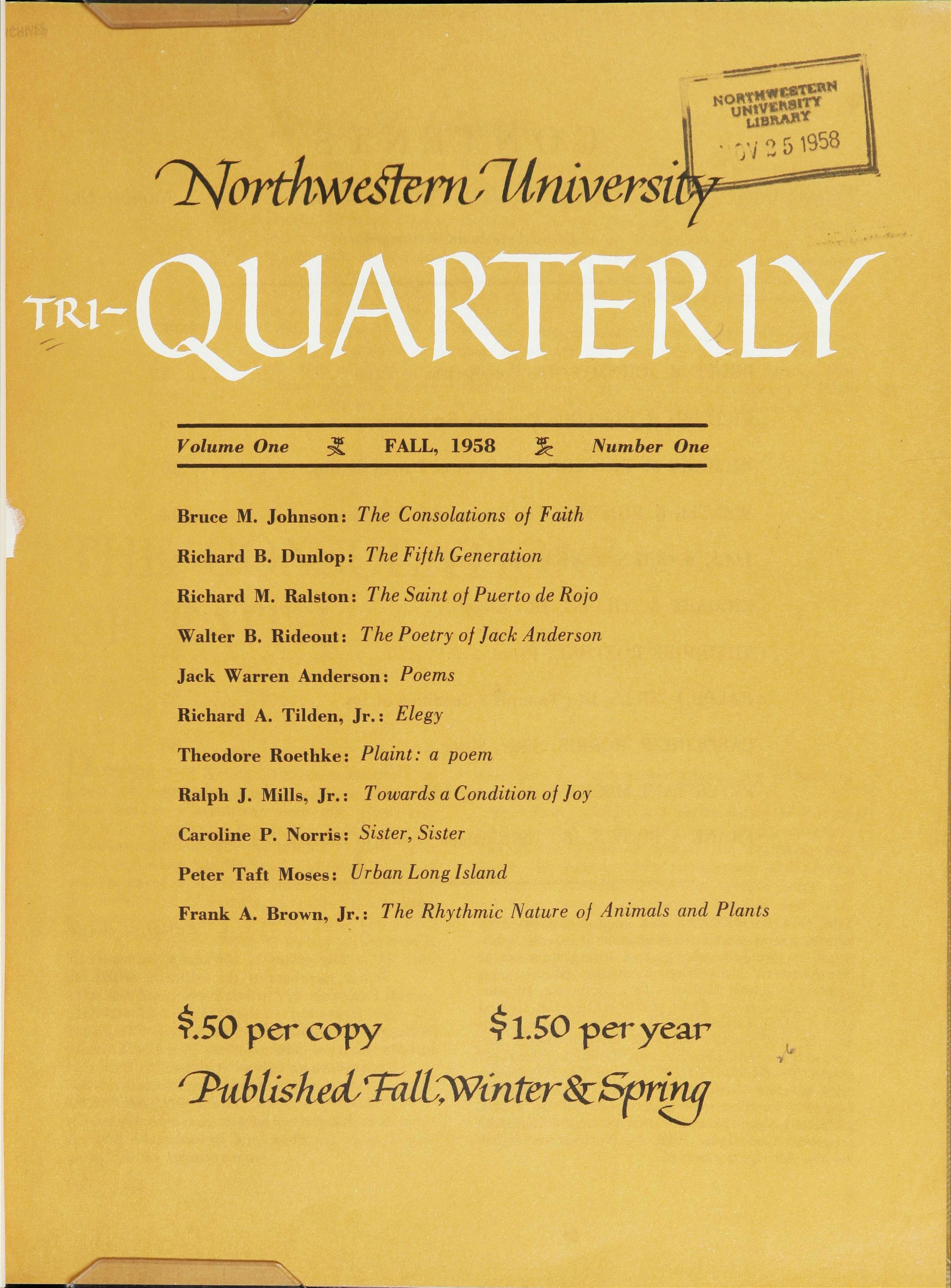
Bruce M. Johnson: The Consolations of Faith
Richard B. Dunlop: The Fifth Generation
Richard M. Ralston: The Saint of Puerto de Raja
Walter B. Rideout: The Poetry of lack Anderson
Jack Warren Anderson: Poems
Richard A. Tilden, Jr.: Elegy
Theodore Roethke: Plaint: a poem
Ralph J. Mills, Jr.: Towards a Condition of Joy
Caroline P. Norris: Sister, Sister
Peter Taft Moses: Urban Long Island
Frank A. Brown, Jr.: The Rhythmic Nature 0/ Animals and Plants
"'r FALL, 1958 Number One Volume One
$.50 per copy $1.50 peryear /Published.'FalL;Winter&Spril!!f
Edited by Edward B. Hungerford
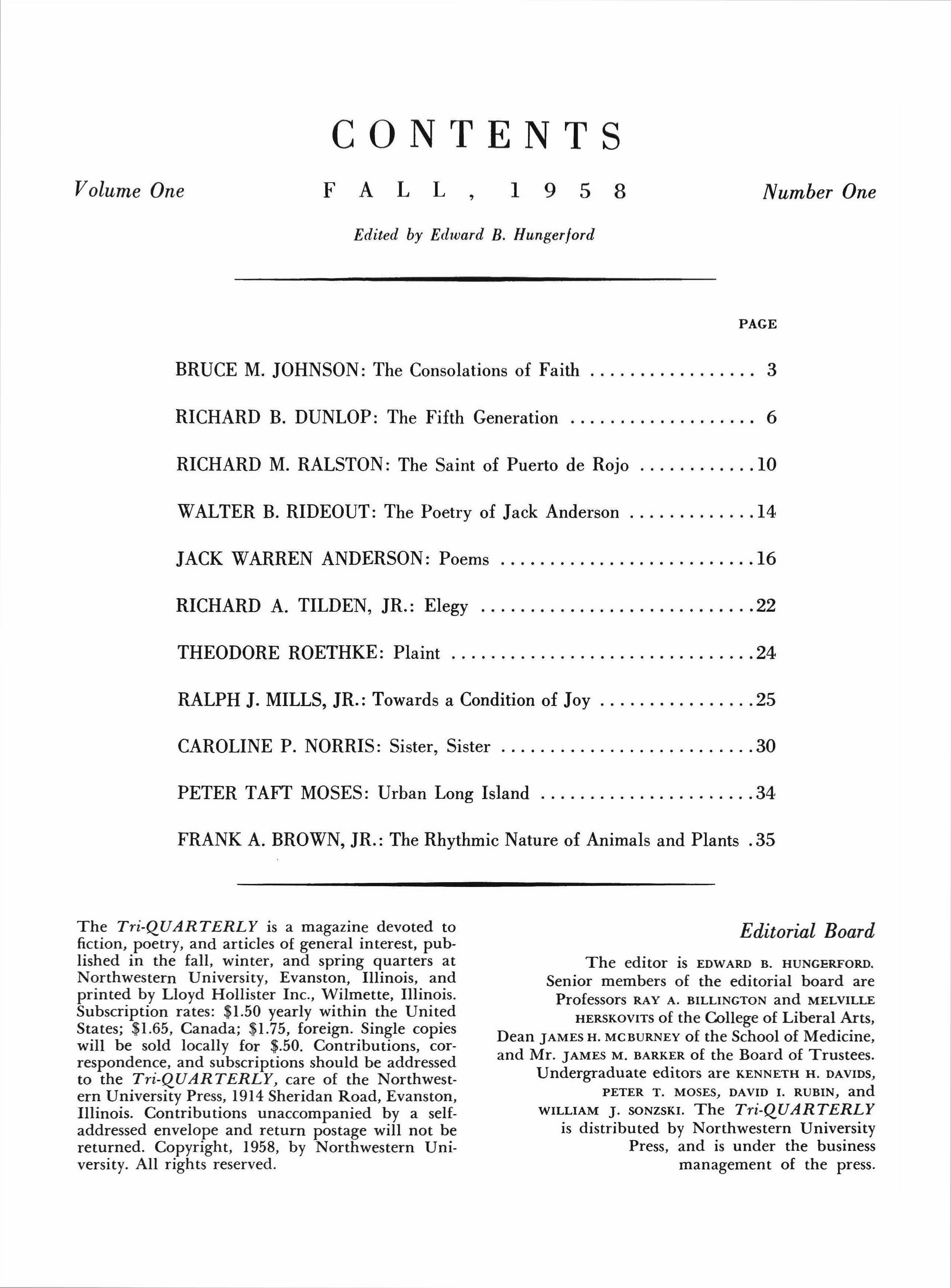
The Tri-QUARTERLY is a magazine devoted to fiction, poetry, and articles of general interest, published in the fall, winter, and spring quarters at Northwestern University, Evanston, Illinois, and printed by Lloyd Hollister Inc., Wilmette, Illinois. Subscription rates: $1.50 yearly within the United States; $1.65, Canada; $1.75, foreign. Single copies will be sold locally for $.50. Contributions, correspondence, and subscriptions should be addressed to the Tri-QUARTERLY, care of the Northwestern University Press, 1914 Sheridan Road, Evanston, Illinois. Contributions unaccompanied by a selfaddressed envelope and return postage will not be returned. Copyright, 1958, by Northwestern University. All rights reserved.
Editorial Board
The editor is EDWARD B. HUNGERFORD. Senior members of the editorial board are Professors RAY A. BILLINGTON and MELVILLE HERSKOVITS of the College of Liberal Arts, Dean JAMES H. MCBURNEY of the School of Medicine, and Mr. JAMES M. BARKER of the Board of Trustees. Undergraduate editors are KENNETH H. DAVIDS, PETER T. MOSES, DAVID I. RUBIN, and WILLIAM J. SONZSKI. The Tri-QUARTERLY is distributed by Northwestern University Press, and is under the business management of the press.
CONTENTS Volume One F ALL I 958 Number One
PAGE BRUCE M. JOHNSON: The Consolations of Faith 3 RICHARD B. DUNLOP: The Fifth Generation 6 RICHARD M. RALSTON: The Saint of Puerto de Rojo 10 WALTER B. RIDEOUT: The Poetry of Jack Anderson 14 JACK WARREN ANDERSON: Poems 16 RICHARD A. TILDEN, JR.: Elegy 22 THEODORE ROETHKE: Plaint 24 RALPH J. MILLS, JR.: Towards a Condition of Joy 25 CAROLINE P. NORRIS: Sister, Sister 30 PETER TAFT MOSES: Urban Long Island .34 FRANK A. BROWN, JR.: The Rhythmic Nature of Animals and Plants .35
Bruce M. Johnson
In a note to the editor Bruce Johnson says of himself: "1 was educated at the University of Chicago in the last days of Hutchins' influence, when we began at fifteen and finished at nineteen (1 am now twenty-five). My interest has usually been in English literature, though for some few months 1 was in law school. My graduate work was done at Northwestern, where 1 have taught both as assistant and as instructor. My wife and 1 are in the process of moving to Ann Arbor where I shall teach next year." This domestic transfer, now, it is to be hoped, happily accomplished, did not interfere with a trip to Europe during the summer.
His enjoyment of his Mexican experiences, interludes in his academic career, resulted in a number of stories and sketches. He says: "There is probably no Mexican national character, and after two trips to Mexico City 1 have only the vague recollection that some few Mexicans whom 1 knew had worked out a logic of faith. This has been the stimulus for several stories." The Consolations of Faith is one of them. The accent is on logic.
THE CONSOLATIONS OF FAITH
OUTSIDE
THE National Palace in Mexico City there are some twenty young soldiers, one supposes sixteen or seventeen years old, whose sole job it is to examine the traffic going into the main courtyard. About the middle of June on a rainy day when the National Cathedral opposite was showered with rain and the Palace remained dry in a freak of summer weather, the brother of Juan Ramon came up to the gate. The young soldiers read comic books or played in the cracks of the stone pavement with the points of their bayonets.
"I must see my brother," the younger Ramon announced to the sergeant, "because I have the honor to announce an Immaculate Conception." He was like all of them an Indian who, of course, had no idea what his ancestors had been.
The sergeant watched the boy's face closely for some sign of a joke.
"I am neither the first nor the last to believe," he said, "but if this is your news may I sug-
Fall, 1958

gest that you reconsider announcing it here in front of the guards."
The young Indian had no intention of reconsidering, and so he was taken to his brother. The guards gathered around the brothers, and finally the 'younger with some pomp and appreciation of the news which his brother could not yet have known straightened himself and said, "My brother's wife has given birth to a boy, and it is widely known that she has been ill and within a hospital and has seen no one except the doctors for over a year."
There was some laughter, but the sergeant interrupted and 'said, "You had better bring this news to the doctors than to us, for they are more likely to appreciate the mystery."
Both the brothers grew red but remained silent until the supposed Joseph turned to the sergeant: "I offer to prove that this news is true and that my wife has given me a child whose father is God."
3
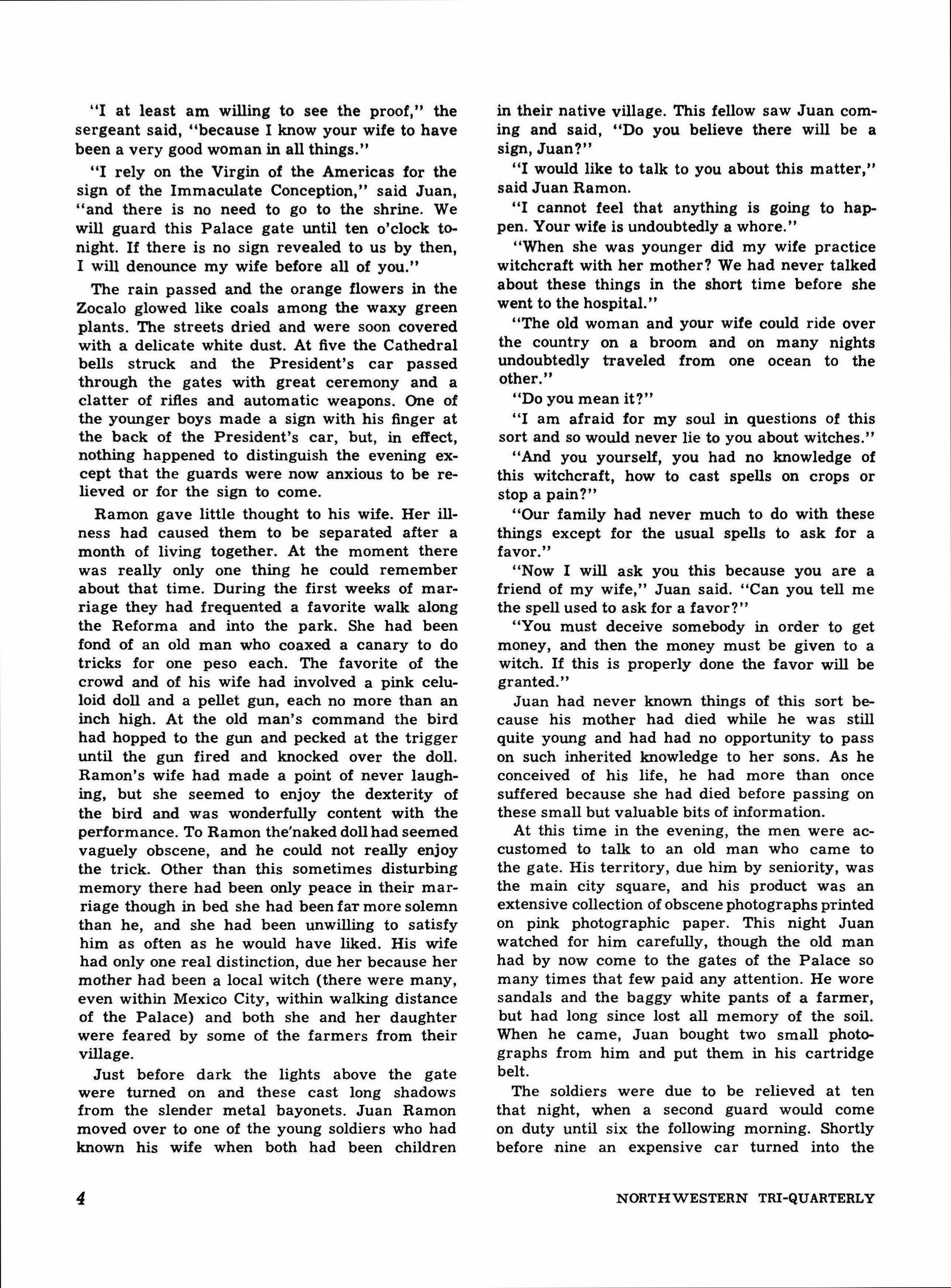
"I at least am willing to see the proof," the sergeant said, "because 1 know your wife to have been a very good woman in all things."
"I rely on the Virgin of the Americas for the sign of the Immaculate Conception," said Juan, "and there is no need to go to the shrine. We will guard this Palace gate until ten o'clock tonight. If there is no sign revealed to us by then, I will denounce my wife before all of you."
The rain passed and the orange flowers in the Zocalo glowed like coals among the waxy green plants. The streets dried and were soon covered with a delicate white dust. At five the Cathedral bells struck and the President's car passed through the gates with great ceremony and a clatter of rifles and automatic weapons. One of the younger boys made a sign with his finger at the back of the President's car, but, in effect, nothing happened to distinguish the evening except that the guards were now anxious to be relieved or for the sign to come.
Ramon gave little thought to his wife. Her illness had caused them to be separated after a month of living together. At the moment there was really only one thing he could remember about that time. During the first weeks of marriage they had frequented a favorite walk along the Reforma and into the park. She had been fond of an old man who coaxed a canary to do tricks for one peso each. The favorite of the crowd and of his wife had involved a pink celuloid doll and a pellet gun, each no more than an inch high. At the old man's command the bird had hopped to the gun and pecked at the trigger until the gun fired and knocked over the doll. Ramon's wife had made a point of never laughing, but she seemed to enjoy the dexterity of the bird and was wonderfully content with the performance. To Ramon the'naked doll had seemed vaguely obscene, and he could not really enjoy the trick. Other than this sometimes disturbing memory there had been only peace in their marriage though in bed she had been far more solemn than he, and she had been unwilling to satisfy him as often as he would have liked. His wife had only one real distinction, due her because her mother had been a local witch (there were many, even within Mexico City, within walking distance of the Palace) and both she and her daughter were feared by some of the farmers from their village.
Just before dark the lights above the gate were turned on and these cast long shadows from the slender metal bayonets. Juan Ramon moved over to one of the young soldiers who had known his wife when both had been children
in their native village. This fellow saw Juan coming and said, "Do you believe there will be a sign, Juan?"
"I would like to talk to you about this matter," said Juan Ramon.
"I cannot feel that anything is going to happen. Your wife is undoubtedly a whore."
"When she was younger did my wife practice witchcraft with her mother? We had never talked about these things in the short time before she went to the hospital."
"The old woman and your wife could ride over the country on a broom and on many nights undoubtedly traveled from one ocean to the other."
"Do you mean it?"
"I am afraid for my soul in questions of this sort and so would never lie to you about witches."
"And you yourself, you had no knowledge of this witchcraft, how to cast spells on crops or stop a pain?"
"Our family had never much to do with these things except for the usual spells to ask for a favor."
"Now I will ask you this because you are a friend of my wife," Juan said. "Can you tell me the spell used to ask for a favor?"
"You must deceive somebody in order to get money, and then the money must be given to a witch. If this is properly done the favor will be granted."
Juan had never known things of this sort because his mother had died while he was still quite young and had had no opportunity to pass on such inherited knowledge to her sons. As he conceived of his life, he had more than once suffered because she had died before passing on these small but valuable bits of information.
At this time in the evening, the men were accustomed to talk to an old man who came to the gate. His territory, due him by seniority, was the main city square, and his product was an extensive collection of obscene photographs printed on pink photographic paper. This night Juan watched for him carefully, though the old man had by now come to the gates of the Palace so many times that few paid any attention. He wore sandals and the baggy white pants of a farmer, but had long since lost all memory of the soil. When he came, Juan bought two small photographs from him and put them in his cartridge belt.
The soldiers were due to be relieved at ten that night, when a second guard would come on duty until six the following morning. Shortly before nine an expensive car turned into the
4
NORTHWESTERN TRI-QUARTERLY
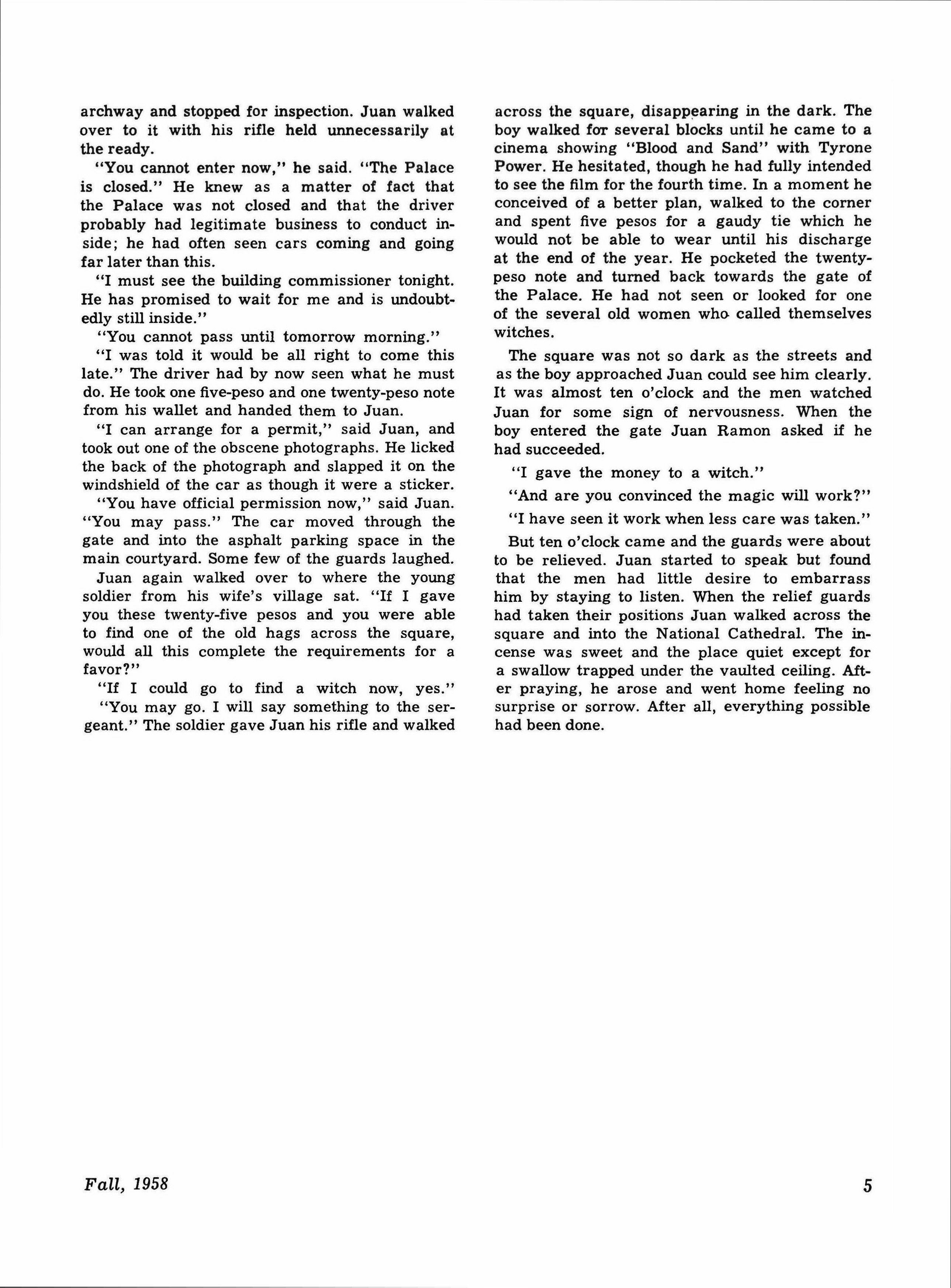
archway and stopped for inspection. Juan walked over to it with his rifle held unnecessarily at the ready.
"You cannot enter now," he said. "The Palace is closed." He knew as a matter of fact that the Palace was not closed and that the driver probably had legitimate business to conduct inside; he had often seen cars coming and going far later than this.
"I must see the building commissioner tonight. He has promised to wait for me and is undoubtedly still inside."
"You cannot pass until tomorrow morning."
"I was told it would be all right to come this late." The driver had by now seen what he must do. He took one five-peso and one twenty-peso note from his wallet and handed them to Juan.
"I can arrange for a permit," said Juan, and took out one of the obscene photographs. He licked the back of the photograph and slapped it on the windshield of the car as though it were a sticker.
"You have official permission now," said Juan. "You may pass." The car moved through the gate and into the asphalt parking space in the main courtyard. Some few of the guards laughed.
Juan again walked over to where the young soldier from his wife's village sat. "If I gave you these twenty-five pesos and you were able to find one of the old hags across the square, would all this complete the requirements for a favor?"
"If I could go to find a witch now, yes."
"You may go. I will say something to the sergeant." The soldier gave Juan his rifle and walked Fall, 1958
across the square, disappearing in the dark. The boy walked for several blocks until he came to a cinema showing "Blood and Sand" with Tyrone Power. He hesitated, though he had fully intended to see the film for the fourth time. In a moment he conceived of a better plan, walked to the corner and spent five pesos for a gaudy tie which he would not be able to wear until his discharge at the end of the year. He pocketed the twentypeso note and turned back towards the gate of the Palace. He had not seen or looked for one of the several old women who called themselves witches.
The square was not so dark as the streets and as the boy approached Juan could see him clearly. It was almost ten o'clock and the men watched Juan for some sign of nervousness. When the boy entered the gate Juan Ramon asked if he had succeeded.
"I gave the money to a witch."
"And are you convinced the magic will work?"
"I have seen it work when less care was taken."
But ten o'clock came and the guards were about to be relieved. Juan started to speak but found that the men had little desire to embarrass him by staying to listen. When the relief guards had taken their positions Juan walked across the square and into the National Cathedral. The incense was sweet and the place quiet except for a swallow trapped under the vaulted ceiling. After praying, he arose and went home feeling no surprise or sorrow. After all, everything possible had been done.
5
Richard B. Dunlop
Richard Dun�op describes himse�f as one of the seven men in the Chicago area who make their living wholly by free-lance writing. A history major originally with the class of 1943, he was graduated from Northwestern in absentia while serving in China with the O.S.S. He has published many stories and articles and, among other commissions, is presently preparing a chapter for THIS IS THE SOUTH to be pubLished by Rand McNally in the spring of 1959. He was a Washington correspondent for Newsweek, a contributing editor for Chicago Magazine, associate editor of Home and Highway, but has now chosen to pursue an independent career, his only magazine affiliation being that of "stockholder" in Best Articles and Stories, a relatively new ,magazine which he helped found. He is married, has four children, and lives at Arlington Heights, Illinois.
THE FIFTH GENERATION
THE BEDROOM looked to the east, and the early sun was an old friend that sought along the counterpane for the old man's mottled arm. It found the arm, and its brightness brought out the blueness of the veins in the thin wrist. Henry Warren awakened and looked with alertness upon the day. It was to be a momentous day, but he could not think just why. Perhaps Father was going to take him driving in the carriage out the Green Bay Road to the Halsey Farm where they would pick strawberries in the patch back of the orchard. The strawberry smell came to the old man's nostrils almost as if he were berrying again on a summer morning when the sun brought out the scent among the plants. He closed his eyes and drowsily planned his day. He would wash Black Eye, for his mother had been after him for a week to give the dog a bath. The old man smiled to himself at the pained look the dog would have when he seized him by the collar and dragged him to the laundry tub full of soapy water.
His daughter, Helen, came down the hall from her room, and her feet upon the boards made them creak. Henry Warren heard the steps approaching his door, and he knew his mother was coming to arouse him.
"Will you sleep the morning away?" she would ask. "Come now. The best of the morning is the earliest part before the heat and the dust."
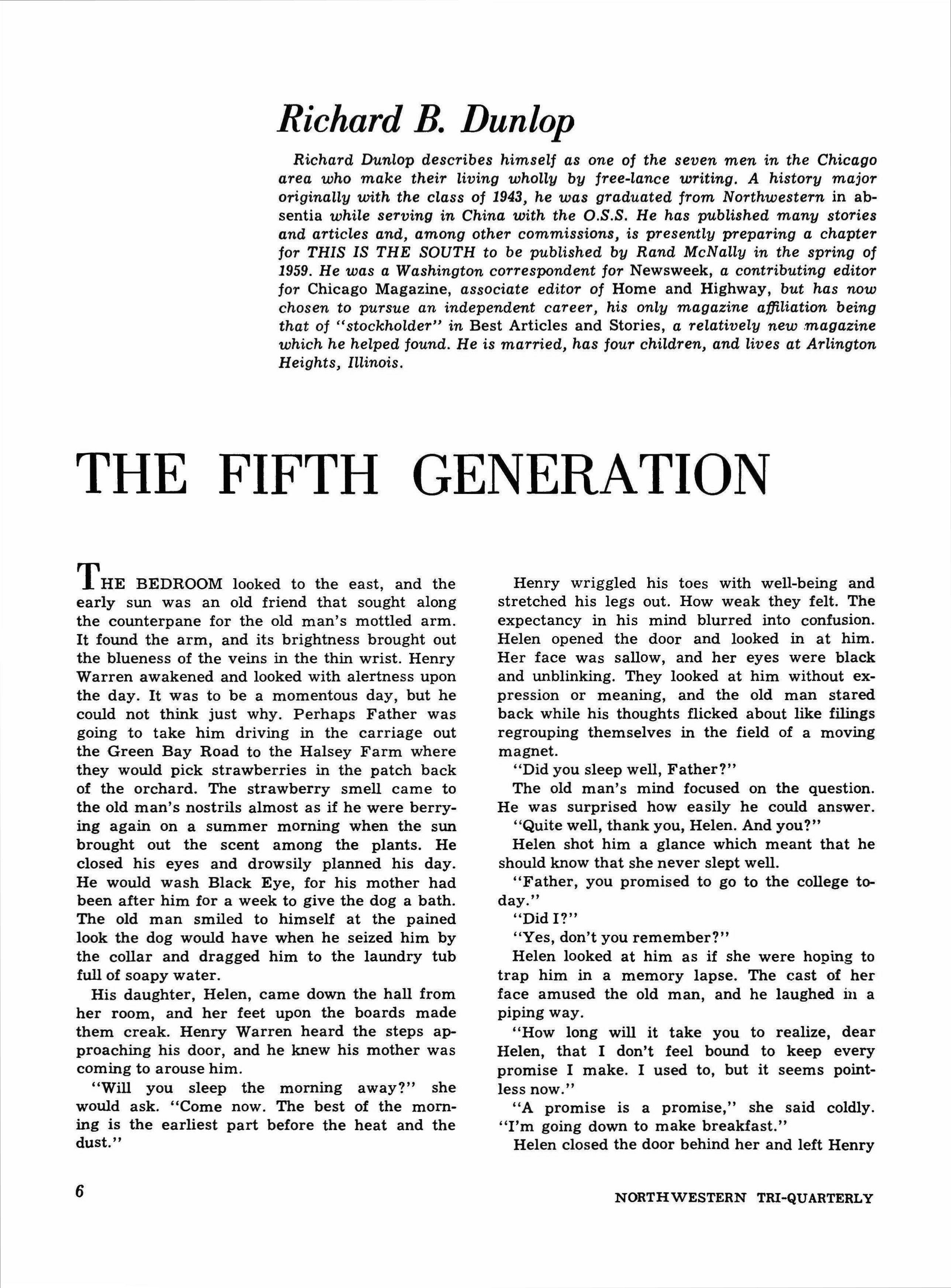
Henry wriggled his toes with well-being and stretched his legs out. How weak they felt. The expectancy in his mind blurred into confusion. Helen opened the door and looked in at him. Her face was sallow, and her eyes were black and unblinking. They looked at him without expression or meaning, and the old man stared back while his thoughts flicked about like filings regrouping themselves in the field of a moving magnet.
"Did you sleep well, Father?"
The old man's mind focused on the question. He was surprised how easily he could answer.
"Quite well, thank you, Helen. And you?"
Helen shot him a glance which meant that he should know that she never slept well.
"Father, you promised to go to the college today."
"Did I?"
"Yes, don't you remember?"
Helen looked at him as if she were hoping to trap him in a memory lapse. The cast of her face amused the old man, and he laughed ill a piping way.
"How long will it take you to realize, dear Helen, that I don't feel bound to keep every promise 1 make. 1 used to, but it seems pointless now."
"A promise is a promise," she said coldly. "I'm going down to make breakfast."
Helen closed the door behind her and left Henry
6
NORTHWESTERN TRI-QUARTERLY
to the sunlight and the stillness of the room. He closed his eyes and mused over his triumph. Surely he had gotten the best of her. She had gone away in a pet. Even if he were eightyseven years old he was no senile relic.
Henry got up on his elbows, worked his legs out from beneath the covers and lowered them over the side of the bed. He slid his feet into his slippers and stood up slowly. What was it that was going on at the college today that was so all-fired important? He would have to find out somehow without letting Helen know that he had forgotten. A panic seized him. He hadn't promised to make a speech, had he? Five years ago he had done that and stood up before the graduate students in the Political Science Department and looked at all those sympathetic- young faces and forgot completely what he planned to say. It had been the fault of that idiot, Leonard Chappell, who had replaced him as chairman of the department when he reached the retirement age of sixty-five. Chappell introduced him with exaggerated praise.
"It gives me great pleasure to present to you one of the most distinguished of modern political scientists and the outstanding authority on French government, Professor Emeritus Henry Warren," he finished up.
Henry was so far lost in admiration of the legendary figure he had heard described as himself that he quite forgot that he was going to speak. He stood before the students and smiled genially to gain time.
"There are five generations," he finally said. "There are the children, there are the young adults like you, there are the middle-aged and there are the old gaffers, and last of all there are the very old men like me. We are the fifth generation, and there is nothing I can find in my mind to say to you except God bless you."
He sat down and he wept at his own impotency. The memory of it was bitter and clear. Henry shuffled into the bathroom and washed.
At breakfast he hoped that Helen would volunteer some information on the day's event at the college. It was early June so perhaps it had something to do with the graduating class. No, that was not it.
"I cannot understand what has happened to the lilacs this year," Helen was saying. "They are bleached out and colorless."
"What should I wear to the college in your opinion, Helen?"
"I suppose there is no use expecting the roses to be much either, for the peonies were quite disappointing.'
Fall, 1958
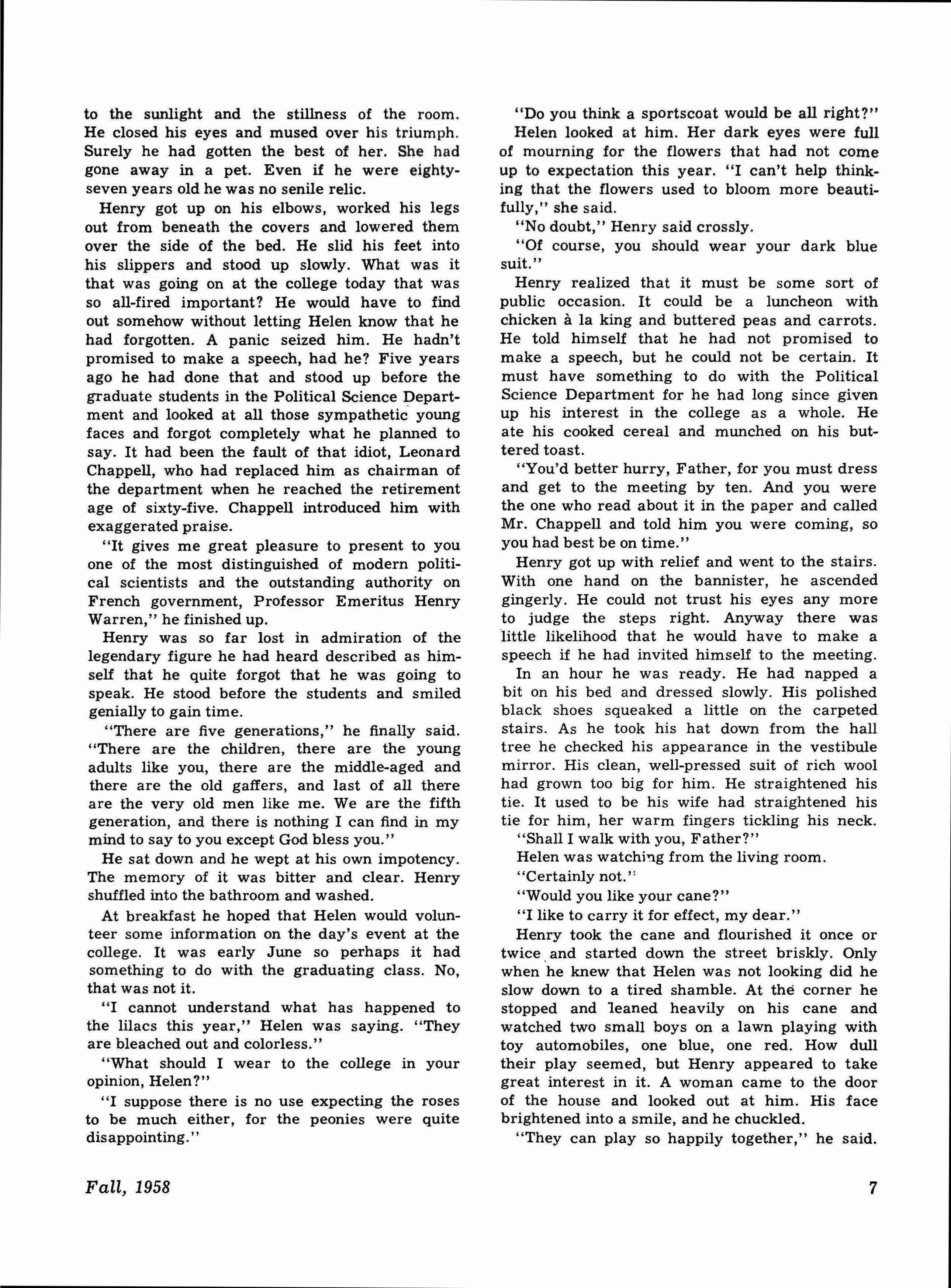
"Do you think a sportscoat would be all right?"
Helen looked at him. Her dark eyes were full of mourning for the flowers that had not come up to expectation this year. "I can't help thinking that the flowers used to bloom more beautifully," she said.
"No doubt," Henry said crossly.
"Of course, you should wear your dark blue suit.
Henry realized that it must be some sort of public occasion. It could be a luncheon with chicken it la king and buttered peas and carrots. He told himself that he had not promised to make a speech, but he could not be certain. It must have something to do with the Political Science Department for he had long since given up his interest in the college as a whole. He ate his cooked cereal and munched on his buttered toast.
"You'd better hurry, Father, for you must dress and get to the meeting by ten. And you were the one who read about it in the paper and called Mr. Chappell and told him you were coming, so you had best be on time."
Henry got up with relief and went to the stairs. With one hand on the bannister, he ascended gingerly. He could not trust his eyes any more to judge the steps right. Anyway there was little likelihood that he would have to make a speech if he had invited himself to the meeting.
In an hour he was ready. He had napped a bit on his bed and dressed slowly. His polished black shoes squeaked a little on the carpeted stairs. As he took his hat down from the hall tree he checked his appearance in the vestibule mirror. His clean, well-pressed suit of rich wool had grown too big for him. He straightened his tie. It used to be his wife had straightened his tie for him, her warm fingers tickling his neck.
"Shall I walk with you, Father?"
Helen was watching from the living room.
"Certainly not."
"Would you like your cane?"
"I like to carry it for effect, my dear."
Henry took the cane and flourished it once or twice, and started down the street briskly. Only when he knew that Helen was not looking did he slow down to a tired shamble. At the corner he stopped and leaned heavily on his cane and watched two small boys on a lawn playing with toy automobiles, one blue, one red. How dull their play seemed, but Henry appeared to take great interest in it. A woman came to the door of the house and looked out at him. His face brightened into a smile, and he chuckled.
"They can play so happily together," he said.
7
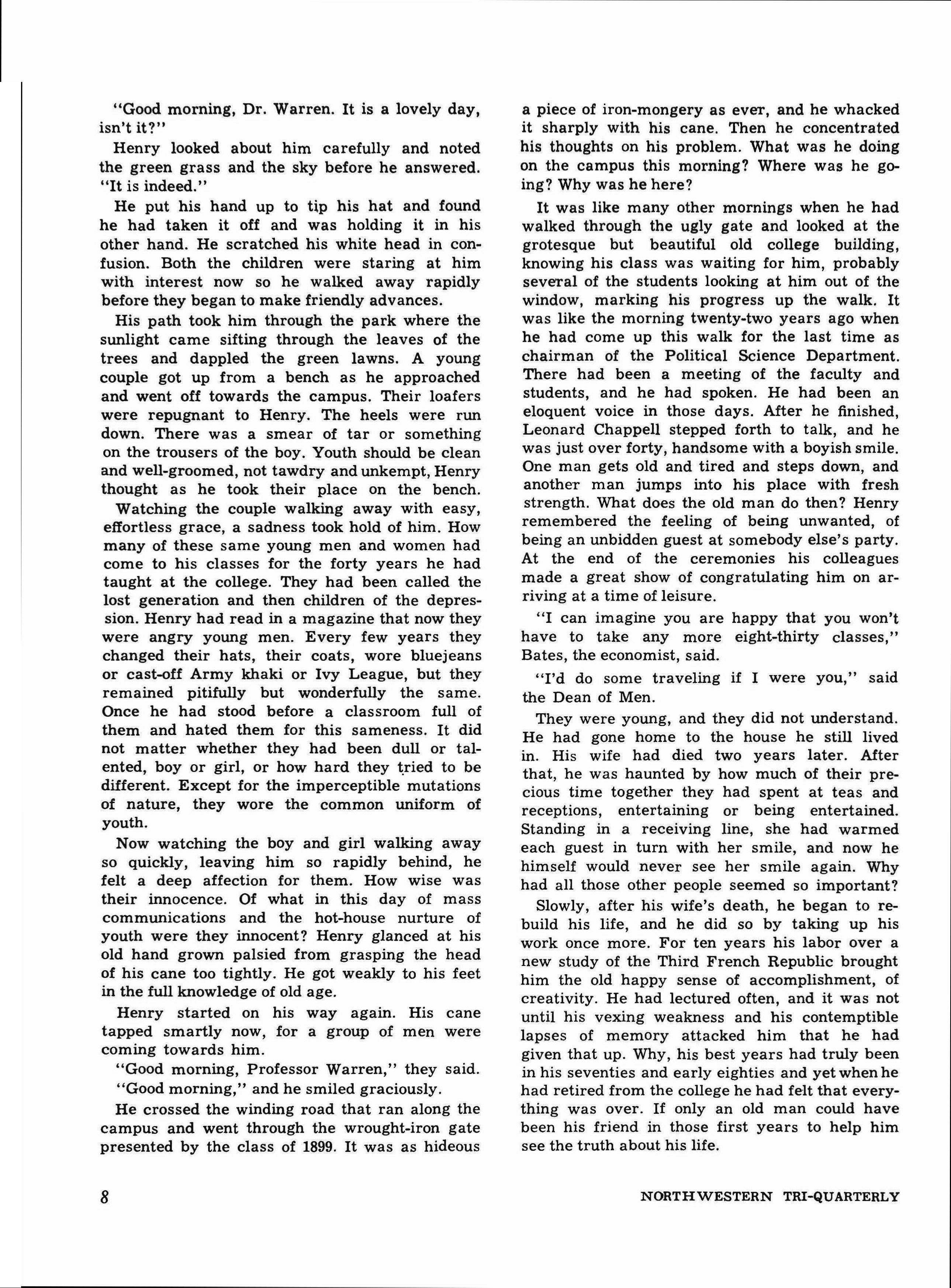
"Good morning, Dr. Warren. It is a lovely day, isn't it?"
Henry looked about him carefully and noted the green grass and the sky before he answered. "It is indeed."
He put his hand up to tip his hat and found he had taken it off and was holding it in his other hand. He scratched his white head in confusion. Both the children were staring at him with interest now so he walked away rapidly before they began to make friendly advances.
His path took him through the park where the sunlight came sifting through the leaves of the trees and dappled the green lawns. A young couple got up from a bench as he approached and went off towards the campus. Their loafers were repugnant to Henry. The heels were run down. There was a smear of tar or something on the trousers of the boy. Youth should be clean and well-groomed, not tawdry and unkempt, Henry thought as he took their place on the bench.
Watching the couple walking away with easy, effortless grace, a sadness took hold of him. How many of these same young men and women had come to his classes for the forty years he had taught at the college. They had been called the lost generation and then children of the depression. Henry had read in a magazine that now they were angry young men. Every few years they changed their hats, their coats, wore bluejeans or cast-off Army khaki or Ivy League, but they remained pitifully but wonderfully the same. Once he had stood before a classroom full of them and hated them for this sameness. It did not matter whether they had been dull or talented, boy or girl, or how hard they tried to be different. Except for the imperceptible mutations of nature, they wore the common uniform of youth.
Now watching the boy and girl walking away so quickly, leaving him so rapidly behind, he felt a deep affection for them. How wise was their innocence. Of what in this day of mass communications and the hot-house nurture of youth were they innocent? Henry glanced at his old hand grown palsied from grasping the head of his cane too tightly. He got weakly to his feet in the full knowledge of old age.
Henry started on his way again. His cane tapped smartly now, for a group of men were coming towards him.
"Good morning, Professor Warren," they said. "Good morning," and he smiled graciously. He crossed the winding road that ran along the campus and went through the wrought-iron gate presented by the class of 1899. It was as hideous
a piece of iron-mongery as ever, and he whacked it sharply with his cane. Then he concentrated his thoughts on his problem. What was he doing on the campus this morning? Where was he going? Why was he here?
It was like many other mornings when he had walked through the ugly gate and looked at the grotesque but beautiful old college building, knowing his class was waiting for him, probably several of the students looking at him out of the window, marking his progress up the walk. It was like the morning twenty-two years ago when he had come up this walk for the last time as chairman of the Political Science Department. There had been a meeting of the faculty and students, and he had spoken. He had been an eloquent voice in those days. After he finished, Leonard Chappell stepped forth to talk, and he was just over forty, handsome with a boyish smile. One man gets old and tired and steps down, and another man jumps into his place with fresh strength. What does the old man do then? Henry remembered the feeling of being unwanted, of being an unbidden guest at somebody else's party. At the end of the ceremonies his colleagues made a great show of congratulating him on arriving at a time of leisure.
"I can imagine you are happy that you won't have to take any more eight-thirty classes," Bates, the economist, said.
"I'd do some traveling if I were you," said the Dean of Men.
They were young, and they did not understand. He had gone home to the house he still lived in. His wife had died two years later. After that, he was haunted by how much of their precious time together they had spent at teas and receptions, entertaining or being entertained. Standing in a receiving line, she had warmed each guest in turn with her smile, and now he himself would never see her smile again. Why had all those other people seemed so important?
Slowly, after his wife's death, he began to rebuild his life, and he did so by taking up his work once more. For ten years his labor over a new study of the Third French Republic brought him the old happy sense of accomplishment, of creativity. He had lectured often, and it was not until his vexing weakness and his contemptible lapses of memory attacked him that he had given that up. Why, his best years had truly been in his seventies and early eighties and yet when he had retired from the college he had felt that everything was over. If only an old man could have been his friend in those first years to help him see the truth about his life.
8
NORTHWESTERN TRI-QUARTERLY
Henry's feet found their places on the familiar hollows of the steps that led up to the main entrance of Old College. He swayed a little dizzily as he reached the top, and he caught hold of the doorknob for support.
"Professor Warren," called a voice from the foot of the stairs. "Aren't you coming over to the auditorium?"
"Yes, yes, of course."
Henry turned and looked down the dangerous slope of the stairs at the lean face of Professor Heinrich, who taught German. Heinrich's watery blue eyes seemed sad and out of keeping with his bland smile. He continued to smile as Henry came down the stairs cautiously as if he were a man walking along the edge of a vast crevasse.
The two men walked slowly across the campus to the auditorium, which hid its garish brick newness behind a mantle of ivy which had grown over it with astounding rapidity.
Inside they took seats about half way down with other faculty members, most of whom did not recognize Henry. Some of the younger ones did not even know his name or reputation. This did not prevent them from being as polite and respectful as the others.
At first four student musicians performed a Mozart quartet. The first and second violins had sharp tones, and they snarled discordantly together. Henry quickly lost interest in the music. He dozed.
When he awoke, Leonard Chappell was talking. Henry could hear his voice before he opened his eyes, and it seemed as if it were once more the day that he had retired.
"It is with great pleasure that I introduce to you my successor, Dr. Walter Herder," Chappell said as Henry blinked open his eyes.
A handsome, youngish man stood up as the nearly bald Chappell plumped down and mopped a handkerchief over his brow. Suddenly Henry remembered why he had come to the meeting, and he concentrated with all his strength for fear he would forget before the young Dr. Herder finished speaking. He was so intent upon his own thoughts that he hardly noticed when the talk was over. Yet he applauded warmly with those about him.
"A sterling speech," said Professor Heinrich.
"Yes, it was," Henry agreed. Then he stood up and began to push his way through the crowd towards the platform. Heinrich was right behind him. The students and faculty alike fell away from Henry's cane and white head.
"Dr. Warren, Henry Warren!" cried Chappell when he saw the old man coming down the aisle. He jumped down from the platform and pushed his way through to him.
"It's so good to see you here. It seems only yesterday that you stepped down for me, and now I, too, am stepping down."
"I bet you're happy to have nothing to do," said Heinrich.
Henry felt a stab of irritation, and he waved his cane wildly.
"Nonsense," he said. "That is sheer nonsense. Leonard, you're just starting on the richest, busiest time of your life and don't you forget it."
He felt very weak suddenly, and he no longer could think of what to say next. Everybody around him was listening. They expected more.
"I wish that some old fellow had come and told me that once," he said.
Chappell caught him by the arm and squeezed it hard. Henry smiled at him, and his smile began to grow vague and uncertain. He shook himself slightly for he could not remember just what he was about. What was it he was going to say?
"I know you'll do a very good job in my place," he said. "I'm proud to be followed by a man like you."
Henry felt very weak and sat down, and he looked about him in fright. Everybody was staring at him in the strangest way. What had he said? Only Chappell tapped him gently on the shoulder.
"Don't worry. I'll do my best," he said.
Henry wished he was home in bed, for he felt very weak, and he could not understand what this man tapping him on the shoulder was talking about. He looked so intense. Maybe it was because he had pushed the wheelbarrow over the man's lawn. No, that was Uncle Bob's lawn, and he had only been trying to help him move gravel for the new driveway. Would his mother be angry when she heard about it?
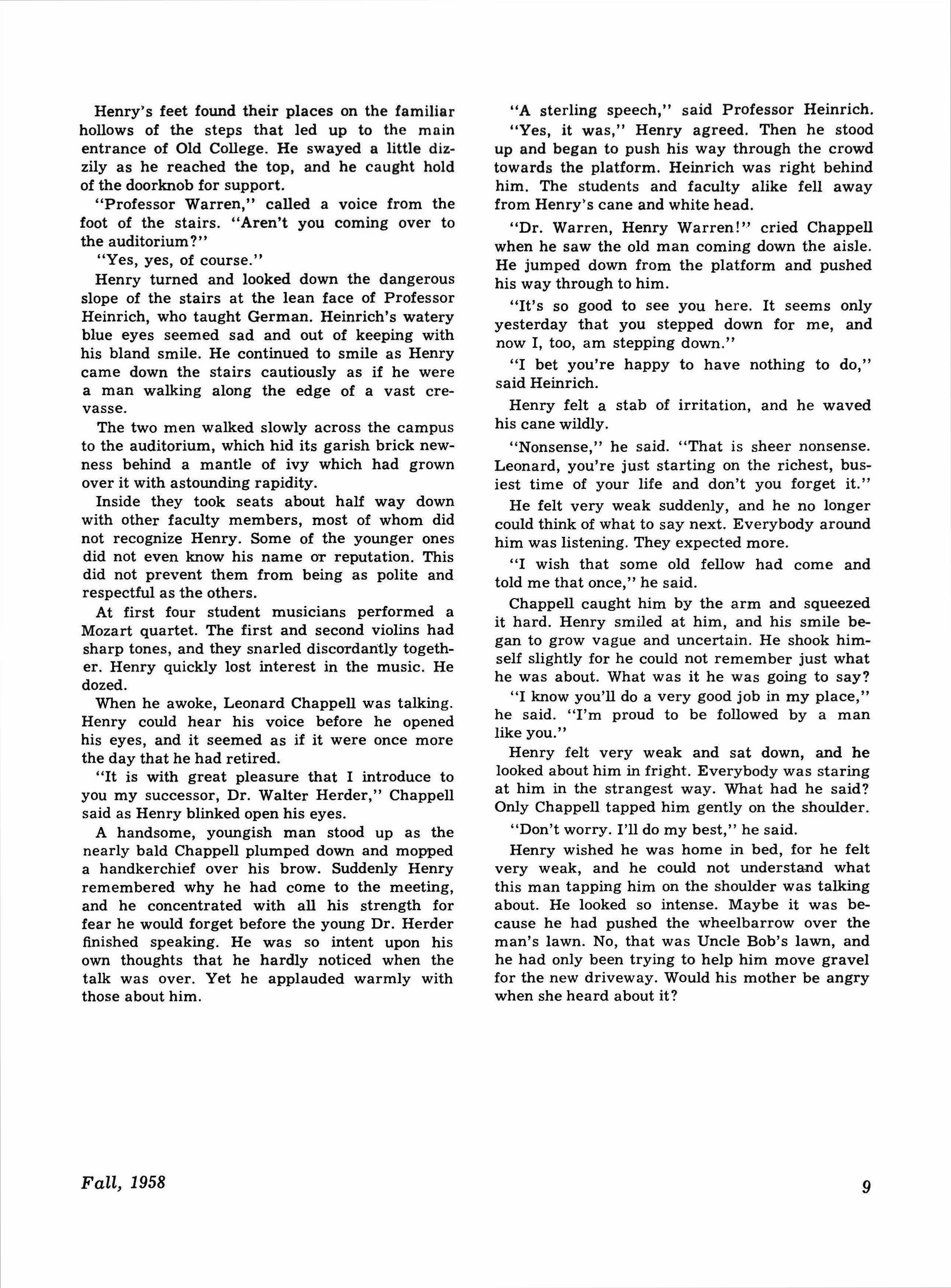
Fall, 1958
9
Richard M. Ralston
Richard M. Ralston was graduated in absentia from Northwestern in 1943 while serving with the Marines in the Pacific. He joined the Third Marine Division on Guadolcanal and took part in the Landings on Guam and Iwo Jima. He is married, has three sons, lives in Evanston, and is employed in Chicago where he is responsible for the publication of a number of empLoyee magazines and a newspaper.
THE SAINT OF PUERTO DE ROJO
A Short Story
WIFE: Well, he came home with bleeding feet. He said he had dropped his shoes off at the shoemakers. In this weather, can you imagine? It was ten below that night and his feet were in terrible shape.
RECTOR: Hmmm. Very interesting. And he had his paper and brief case as usual?
WIFE: Oh, yes, he just put them on the window sill of the hall bay window where he always puts them. He really didn't act any differently from usual. Oh, yes. He did go upstairs and wash off his feet before he came down to dinner.
RECTOR: Let me ask you this Did he manifest any other abnormal symptoms?
WIFE: Well, he talked strangely. That's not exactly it, though. He said a few sort of crazy things and then he spoke normally, the way he always did.
RECTOR: What kinds of things did he say?
WIFE: When I asked why he came home barefooted he said he was practicing for sainthood and that this was the only chance he had to get into condition during the day. The rest of the time, he said, he was busy at the office and commuting between home and work. Then he said something I didn't quite understand. He said that it wouldn't have made any difference if he went barefooted at the office anyway, because the office is so comfortable, since the happiness department had taken care of everything.
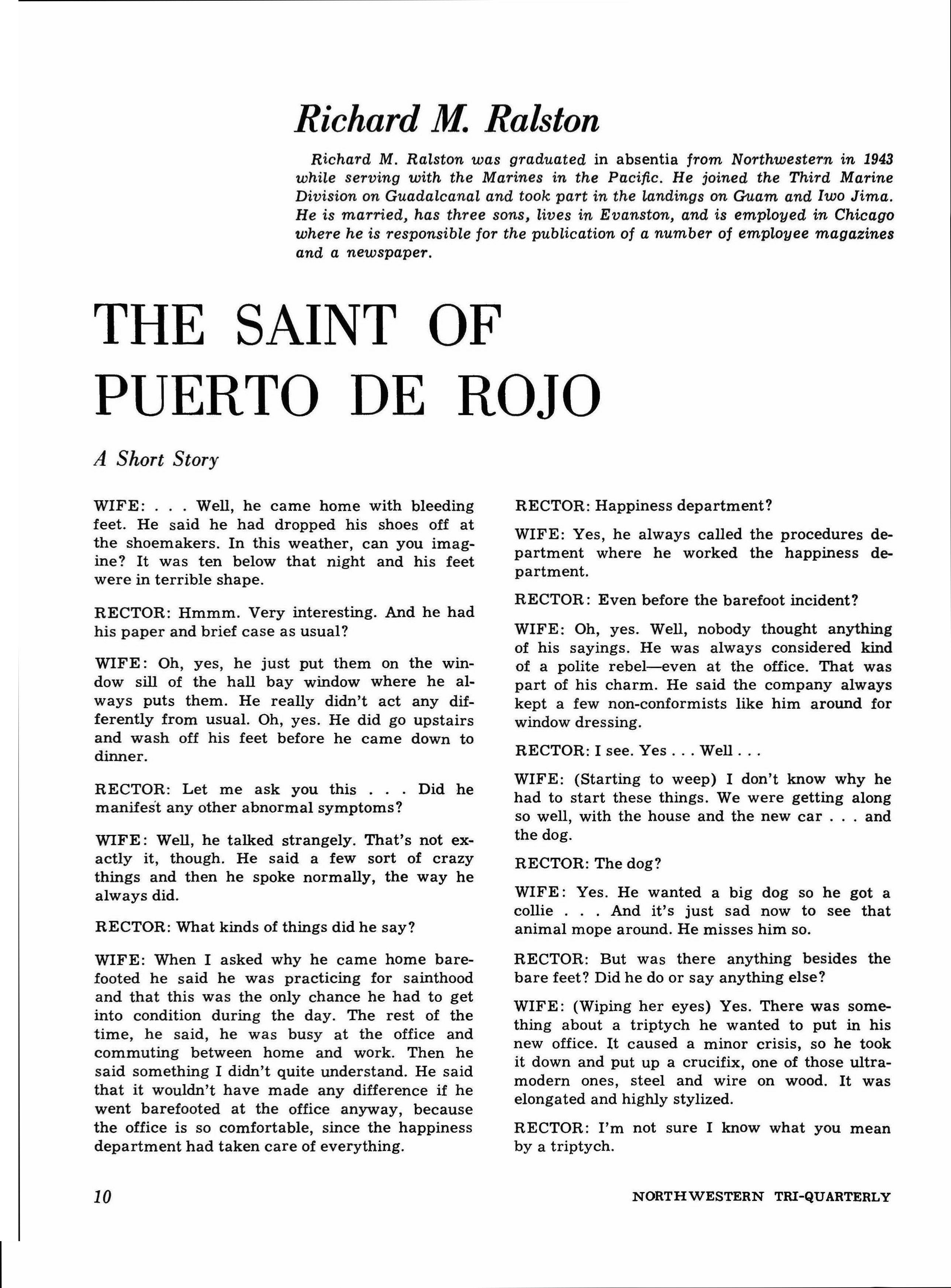
RECTOR: Happiness department?
WIFE: Yes, he always called the procedures department where he worked the happiness department.
RECTOR: Even before the barefoot incident?
WIFE: Oh, yes. Well, nobody thought anything of his sayings. He was always considered kind of a polite rebel-even at the office. That was part of his charm. He said the company always kept a few non-conformists like him around for window dressing.
RECTOR: I see. Yes Well
WIFE: (Starting to weep) I don't know why he had to start these things We were getting along so well, with the house and the new car and the dog.
RECTOR: The dog?
WIFE: Yes. He wanted a big dog so he got a collie And it's just sad now to see that animal mope around. He misses him so.
RECTOR: But was there anything besides the bare feet? Did he do or say anything else?
WIFE: (Wiping her eyes) Yes. There was something about a triptych he wanted to put in his new office. It caused a minor crisis, so he took it down and put up a crucifix, one of those ultramodern ones, steel and wire on wood. It was elongated and highly stylized.
RECTOR: I'm not sure I know what you mean by a triptych.
10
NORTHWESTERN TRI-QUARTERLY
WIFE: It's a three-panelled holy painting with the end panels folding over the inside. His was painted with a madonna and child, and it was terribly expensive. He charged it and I'm still paying for it.
RECTOR: Did he explain why he bought it?
WIFE: Yes. He said that it helped him in his practice for sainthood. He said that looking at it periodically during the day kept his mind on the right track, and that he could become a saint a lot faster if he could combine an appropriate visual experience with going barefooted on his walks from the train.
RECTOR: Have you any idea why he wanted to become a saint? Did he confide in you? Maybe it would be easier if you just told me all about it.
WIFE: He said that more people should volunteer to suffer for man's sins. However, he said that he was limiting his sacrifice to a few acts like going without shoes, but that it might help start a sainthood trend downtown. He thought that perhaps it might be a worthwhile activity for Junior Achievement. This was the sort of thing he would say and you never knew whether he was being serious or cynical.
RECTOR: I'm sorry to interrupt, but you were starting to explain the triptych incident to me when I changed the subject. Would you go into that a little more?
WIFE: You mean the crucifix? Well, his company had just moved into one of those ultramodern steel and glass buildings and everyone was instructed to leave all his personal effects behind such as paintings, knick-knacks, letter openers You know all the things people clutter up their offices with. They were told that they would have new furniture and equipment and that any knick-knacks and paintings they obtained after the move would have to blend in with the building's modern decor. Well, this upset him. That's when he first started acting hostile. Afterwards he said he hoped I would forgive his hostility and that's when he told me he had decided to become a saint.
RECTOR: Yes And
WIFE: The first thing he did was buy the triptych and it caused a terrible row with his boss and some of the other executives. They had spent thousands of dollars on highly abstract paintings and sculpture, he said, and they weren't going to have some corny triptych lousing up the place. At least, that's what he told me they said. In
Fall, 1958
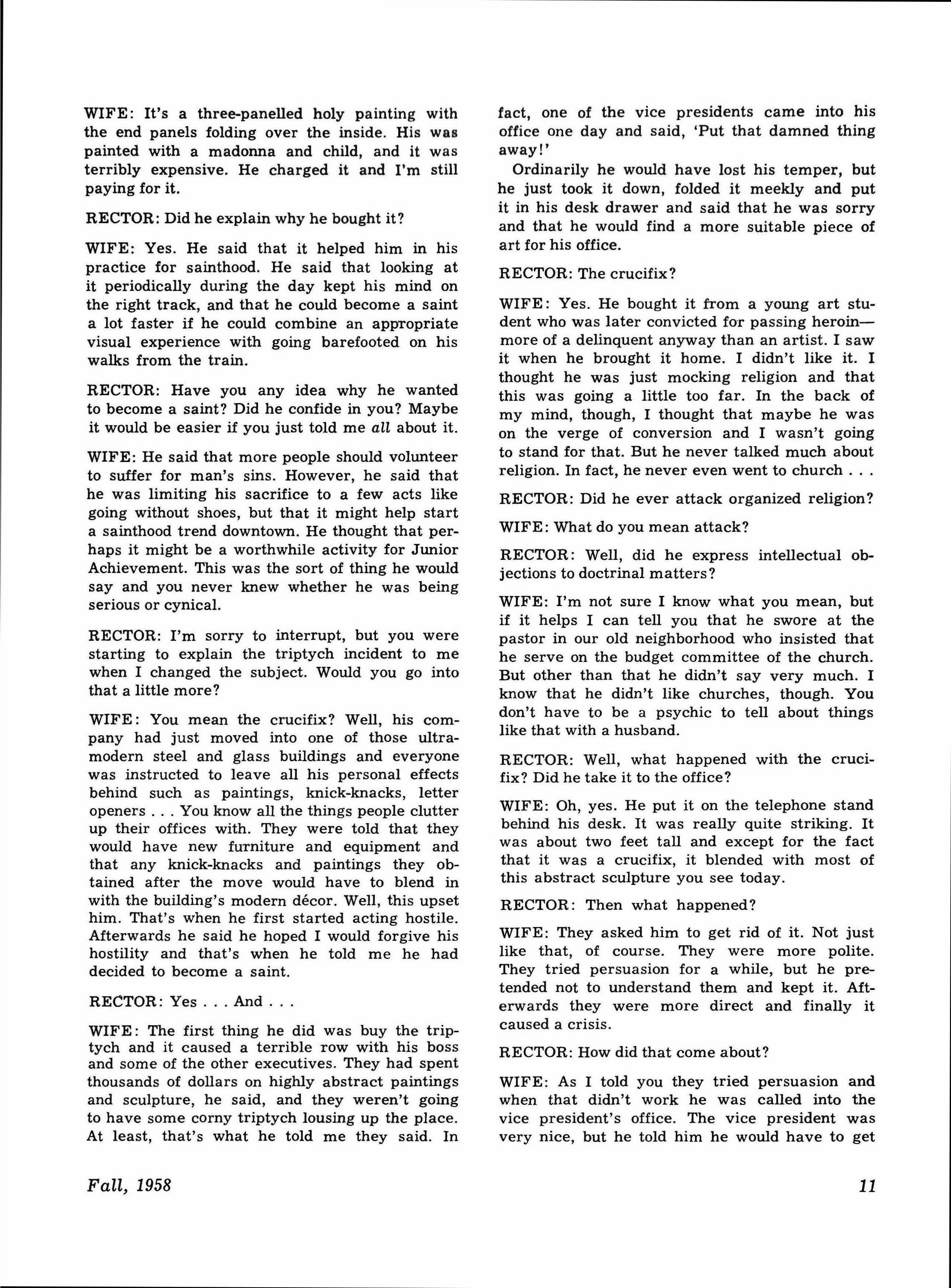
fact, one of the vice presidents came into his office one day and said, 'Put that damned thing away!'
Ordinarily he would have lost his temper, but he just took it down, folded it meekly and put it in his desk drawer and said that he was sorry and that he would find a more suitable piece of art for his office.
RECTOR: The crucifix?
WIFE: Yes. He bought it from a young art student who was later convicted for passing heroinmore of a delinquent anyway than an artist. I saw it when he brought it home. I didn't like it. I thought he was just mocking religion and that this was going a little too far. In the back of my mind, though, I thought that maybe he was on the verge of conversion and I wasn't going to stand for that. But he never talked much about religion. In fact, he never even went to church
RECTOR: Did he ever attack organized religion?
WIFE: What do you mean attack?
RECTOR: Well, did he express intellectual objections to doctrinal matters?
WIFE: I'm not sure I know what you mean, but if it helps I can tell you that he swore at the pastor in our old neighborhood who insisted that he serve on the budget committee of the church. But other than that he didn't say very much. I know that he didn't like churches, though. You don't have to be a psychic to tell about things like that with a husband.
RECTOR: Well, what happened with the crucifix? Did he take it to the office?
WIFE: Oh, yes. He put it on the telephone stand behind his desk. It was really quite striking. It was about two feet tall and except for the fact that it was a crucifix, it blended with most of this abstract sculpture you see today.
RECTOR: Then what happened?
WIFE: They asked him to get rid of it. Not just like that, of course. They were more polite. They tried persuasion for a while, but he pretended not to understand them and kept it. Afterwards they were more direct and finally it caused a crisis.
RECTOR: How did that come about?
WIFE: As I told you they tried persuasion and when that didn't work he was called into the vice president's office. The vice president was very nice, but he told him he would have to get
11
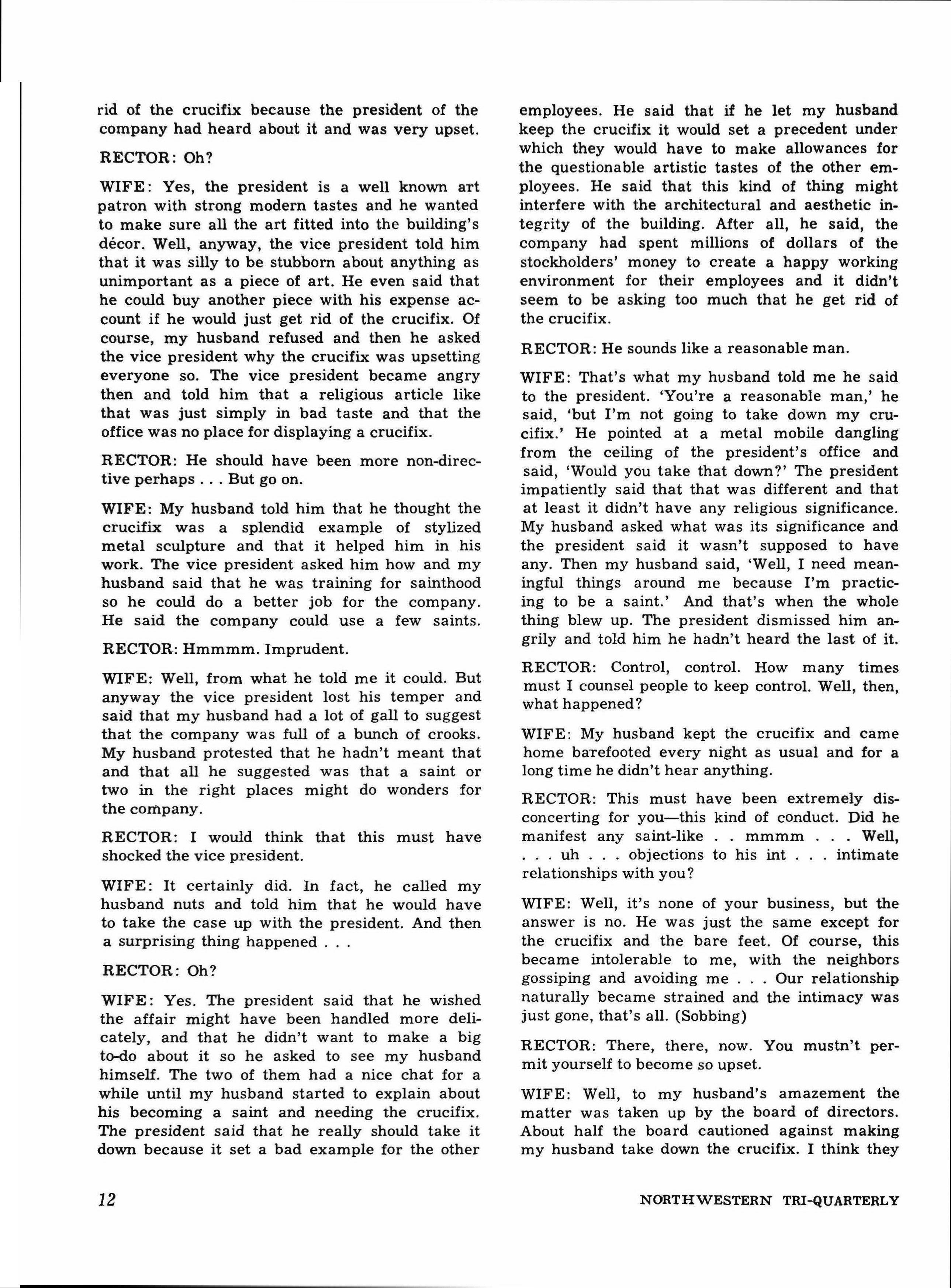
rid of the crucifix because the president of the company had heard about it and was very upset.
RECTOR: Oh?
WIFE: Yes, the president is a well known art patron with strong modern tastes and he wanted to make sure all the art fitted into the building's decor. Well, anyway, the vice president told him that it was silly to be stubborn about anything as unimportant as a piece of art. He even said that he could buy another piece with his expense account if he would just get rid of the crucifix. Of course, my husband refused and then he asked the vice president why the crucifix was upsetting everyone so. The vice president became angry then and told him that a religious article like that was just simply in bad taste and that the office was no place for displaying a crucifix.
RECTOR: He should have been more non-directive perhaps But go on.
WIFE: My husband told him that he thought the crucifix was a splendid example of stylized metal sculpture and that it helped him in his work. The vice president asked him how and my husband said that he was training for sainthood so he could do a better job for the company. He said the company could use a few saints.
RECTOR: Hmmmm. Imprudent.
WIFE: Well, from what he told me it could. But anyway the vice president lost his temper and said that my husband had a lot of gall to suggest that the company was full of a bunch of crooks. My husband protested that he hadn't meant that and that all he suggested was that a saint or two in the right places might do wonders for the company.
RECTOR: I would think that this must have shocked the vice president.
WIFE: It certainly did. In fact, he called my husband nuts and told him that he would have to take the case up with the president. And then a surprising thing happened.
RECTOR: Oh?
WIFE: Yes. The president said that he wished the affair might have been handled more delicately, and that he didn't want to make a big to-do about it so he asked to see my husband himself. The two of them had a nice chat for a while until my husband started to explain about his becoming a saint and needing the crucifix. The president said that he really should take it down because it set a bad example for the other
employees. He said that if he let my husband keep the crucifix it would set a precedent under which they would have to make allowances for the questiona ble artistic tastes of the other employees. He said that this kind of thing might interfere with the architectural and aesthetic integrity of the building. After all, he said, the company had spent millions of dollars of the stockholders' money to create a happy working environment for their employees and it didn't seem to be asking too much that he get rid of the crucifix.
RECTOR: He sounds like a reasonable man.
WIFE: That's what my husband told me he said to the president. 'You're a reasonable man,' he said, 'but I'm not going to take down my crucifix.' He pointed at a metal mobile dangling from the ceiling of the president's office and said, 'Would you take that down?' The president impatiently said that that was different and that at least it didn't have any religious significance. My husband asked what was its significance and the president said it wasn't supposed to have any. Then my husband said, 'Well, I need meaningful things around me because I'm practicing to be a saint.' And that's when the whole thing blew up. The president dismissed him angrily and told him he hadn't heard the last of it.
RECTOR: Control, control. How many times must I counsel people to keep control. Well, then, what happened?
WIFE: My husband kept the crucifix and came home barefooted every night as usual and for a long time he didn't hear anything.
RECTOR: This must have been extremely disconcerting for you-this kind of conduct. Did he manifest any saint-like mmmm Well, uh objections to his int intimate relationships with you?
WIFE: Well, it's none of your business, but the answer is no. He was just the same except for the crucifix and the bare feet. Of course, this became intolerable to me, with the neighbors gossiping and avoiding me Our relationship naturally became strained and the intimacy was just gone, that's all. (Sobbing)
RECTOR: There, there, now. You mustn't permit yourself to become so upset.
WIFE: Well, to my husband's amazement the matter was taken up by the board of directors. About half the board cautioned against making my husband take down the crucifix. I think they
12
NORTHWESTERN TRI-QUARTERLY
were afraid he might make a big scene about it and the papers would get wind of it and it would look bad for the company, particularly at a time when they were trying to get a good press on the opening of their new building. So they had a long discussion. But in the end they decided that he would have to get rid of it, or at least put it out of sight.
RECTOR: What did he do?
WIFE: Well, he did get rid of it. I think he gave it to one of his friends.
RECTOR: What about the sainthood business? How did the company react to that?
WIFE: Well, they thought he needed psychological help so they set up a series of interviews for him with a company psychologist. He kept his appointments, but the consultations didn't do much good. He told the psychologist that he had no moral right to tamper with his soul and that only God had any business with his soul. 'I'll tell you the facts about my life,' he said, 'but I refuse to interpret them for you.' The psychologist apparently gave up on him then and told the company that he was unsuitable for further counselling and development and that he should look for another position.
RECTOR: That's when he went to Puerto de Rojo?
WIFE: Yes. The company's mines are there and he thought that he might teach the native workers more about God if he lived among them.
RECTOR: Do you mean to say he just abandoned you and the family?
WIFE: Oh, no. We had long talks about his going. He wanted to take us with him and I tried to talk him out of it. He refused to be dissuaded. He said that I had an obligation to accompany him and help him and that if I didn't go he would have to do the job alone.
RECTOR: Hmmmmm.
WIFE: Then one day when he saw that further talks were useless he left. He said goodbye to the boys and told them he hoped that they would learn to serve God by serving man, and that as they grew older they would think kindly of their father.
RECTOR: What about money? Did he leave any for you and the boys to live on?
WIFE: Oh, yes. You see, he had bought a lot of company stock and some savings bonds. He told me to sell them and that there would be enough money to keep us for ten years. So I sold some of the investments. We have enough to live comfortably until the boys finish school.
RECTOR: Do you ever hear from him?
WIFE: Yes. Once a month he sends us a letter telling us about the people and his work. He never mentions his own feelings or his health, so I don't really know how he's getting along. Last month he asked me to send him some old leather so he could make himself some new sandals. He said the ground is too rocky for going barefooted and that even sandals wear out quickly.
RECTOR: Well, I think I've got a pretty good picture of the situation now. A tragic situation in a way-a man with so much promise-a potentially fine man for the community Well, at any rate, I suppose we should But your reference to going to Puerto de Rojo. It must have been a painful decision, of course. But the boys are active in church now and just approaching college age.
WIFE: But I sometimes wonder if we shouldn't have gone with him, in the first place.
RECTOR: You must set your mind at rest about that. He has obviously been unbalanced and I see no sign of improvement. Now a visit out of Christian charity Perhaps you should regard a short visit as a duty, but under no circumstances should you subject the boys to his influence. It would only cause conflicts and doubts in their minds at a crucial stage in their development. I know this may sound somewhat thoughtless and even selfish, but, after all, their first obligation now is to you. They should get their education and find careers for themselves. Does this sound like a reasonable suggestion to you?
WIFE: I suppose so only sometimes I wonder. Before this happened we had such a good life and the boys idolized him. Perhaps I'll pay him a visit myself for a week or two and leave the boys behind, as you say. He might like to have his old crucifix. Yes, I'll take that to him.
I know he will appreciate that. Well, thank you for your advice. It's so awfully hard to know what to do with someone in the family who's trying to become a saint.
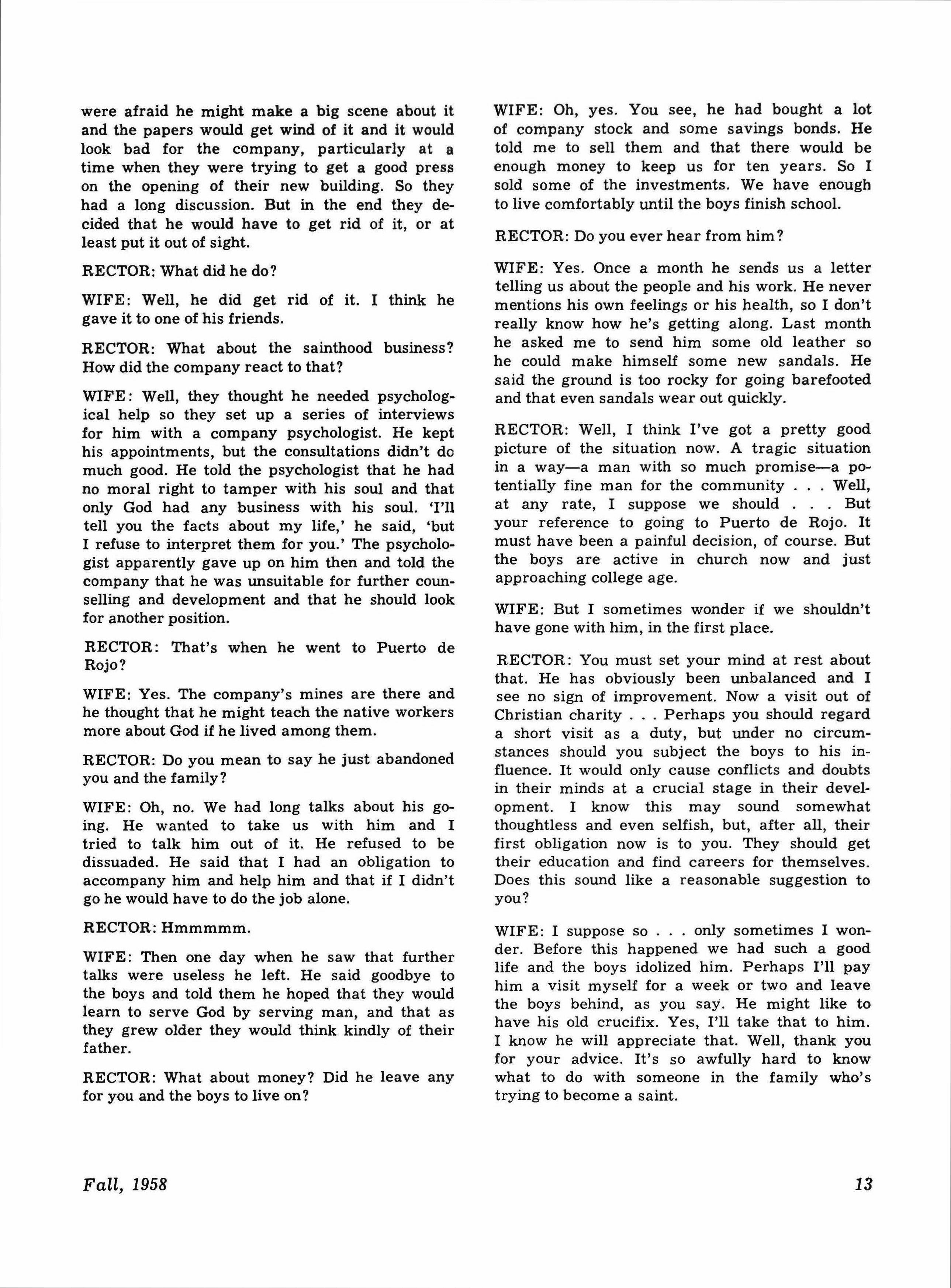
Fall, 1958
13
Walter B. Rideout
Two years ago Walter Rideout published a volume on the history of the radical novel in the United States, and with his colleague James K. Robinson has recently published an anthology of modern verse. Last year he was in charge of the Northwestern University Program for BeU System Executives, and in the present year is a Guggenheim Fellow writing a critical biography of Sherwood Anderson. He is associate professor in the Department of English at Northwestern, his special subject contemporary literature. Because of Professor Rideout's interest in modern writers the editor invited him to co,mment on the young poet whose work appears in this issue.
THE POETRY OF JACK ANDERSON
THIS IS NOT, we are told, an Age of Poetry. If we live in any literary Age at all, it is an Age of Criticism. Yet poets continue to come among us as steadily, though not so noticeably, as the progress of the seasons. It is true that none of them now bursts on us as Dylan Thomas seemed to do in the mid-Thirties, shattering old walls like a bomb and opening at once new vistas of perception. Rather they come the way new poets usually do, linked with the past, still echoing their predecessors, still marked by the accepted forms of sensibility. Most of them, as always, will never go far beyond that past; but some from the start still show promise of better things to come. Jack Anderson, I think, is one of these.
What can we expect of a new poet of promise? We must allow in his early work for the echoes of other writers. So in Anderson's poetry we occasionally hear such echoes-of Eliot in "Agon" or Marianne Moore in "Playing the Clavichord." But the echo must not be the dominant tone of the poems, and it is not dominant in Anderson's. His authentic note, the note of authority that is his own, is the revelation of a poetic intelligence which, still within limits, is both lyric and conversational, passionate and analytic, open to violence and disruption yet not helpless before them. The ambivalences of this intelligence do not negate or destroy each other; instead their oppositions become the useful source of poetry. Again and again Anderson demonstrates that he
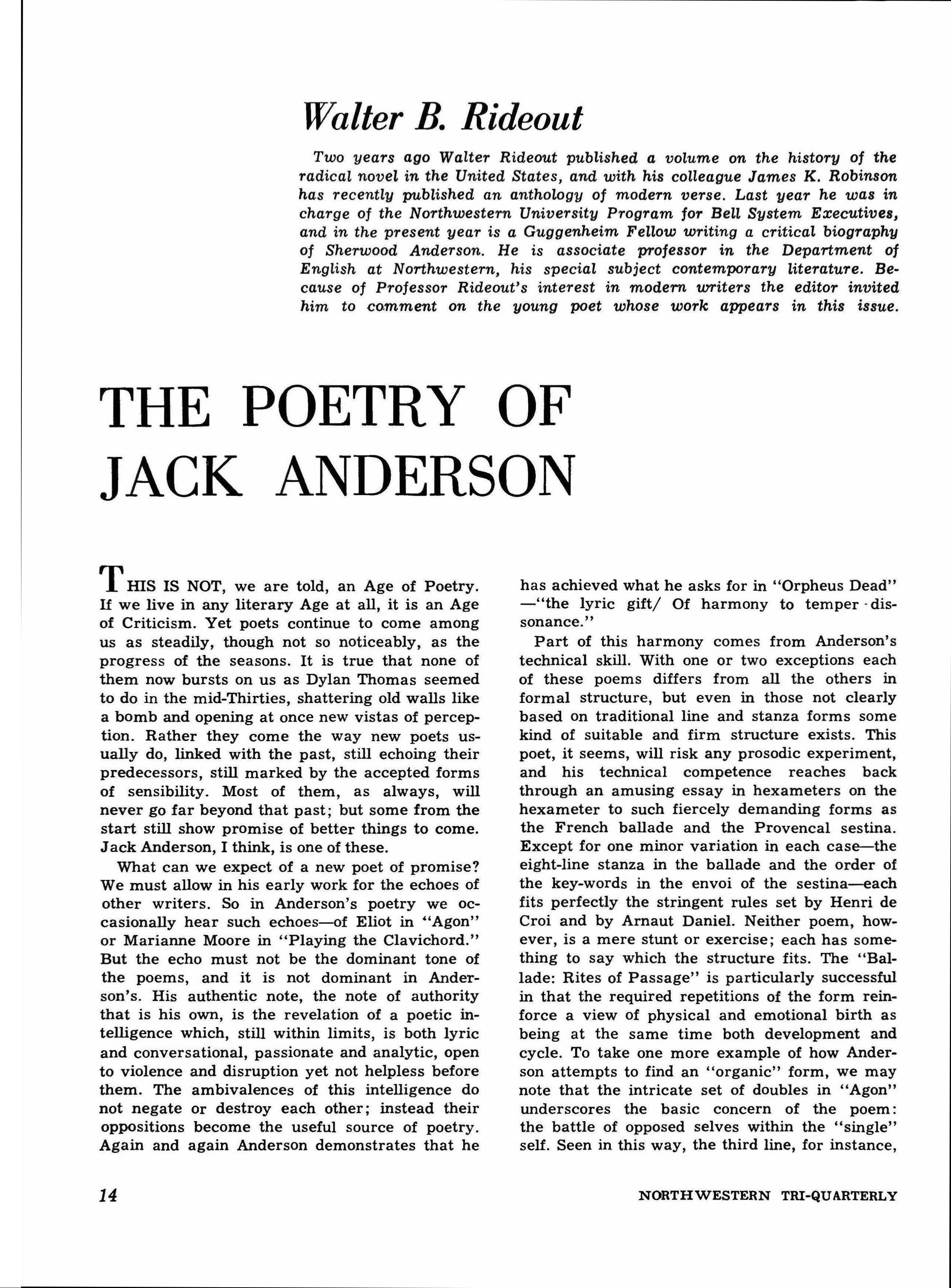
has achieved what he asks for in "Orpheus Dead" -"the lyric gift/ Of harmony to temper' dissonance."
Part of this harmony comes from Anderson's technical skill. With one or two exceptions each of these poems differs from all the others in formal structure, but even in those not clearly based on traditional line and stanza forms some kind of suitable and firm structure exists. This poet, it seems, will risk any prosodic experiment, and his technical competence reaches back through an amusing essay in hexameters on the hexameter to such fiercely demanding forms as the French ballade and the Provencal sestina. Except for one minor variation in each case-the eight-line stanza in the ballade and the order of the key-words in the envoi of the sestina-each fits perfectly the stringent rules set by Henri de Croi and by Arnaut Daniel. Neither poem, however, is a mere stunt or exercise; each has something to say which the structure fits. The "Ballade: Rites of Passage" is particularly successful in that the required repetitions of the form reinforce a view of physical and emotional birth as being at the same time both development and cycle. To take one more example of how Anderson attempts to find an "organic" form, we may note that the intricate set of doubles in "Agon" underscores the basic concern of the poem: the battle of opposed selves within the "single" self. Seen in this way, the third line, for instance,
14
NORTHWESTERN TRI-QUARTERLY
becomes a triumph of compression in its manifold suggestion of opposition and relatedness: time (the sundials) and no-time (the void), "faces" (noun) and "face" (verb), "vacant" and "void," the latter pair given emphasis by their positions in the line.
Anderson has, then, not only a way of saying something but also something to say. He has what many new poets lack-a subject, a major area of concern. What he writes about in these poems is varied enough. He is interested, for one thing, in the relation of poetry to other arts. In "Orpheus Dead" music is used traditionally as a metaphor for poetic creation, while "Playing the Clavichord" is an attempt to suggest the quality of this instrument as "Still Life Variations" is to suggest the quality of Braque's painting. There is also occasionally the more "public" poem, as in "War Memorial," a skillfully constructed imaging of American attitudes toward ceremonial life, and death. Anderson's main subject, however, is the psychologic content of experience. In his interest in the reinterpretation of classic myth he reveals the impress of a time that produced both Ulysses and The Waste Land. The dramatic monologue, "Electra," becomes a device to reveal the appropriately Freudian motivation for that Greek woman's act, while "Boy on Fire"-to me one of his most accomplished poems-extends the meaning of the Icarus myth in a peculiarly modem way, making the protagonist narcissistically exult in his lovely fall rather than in his bold flight toward the sun.
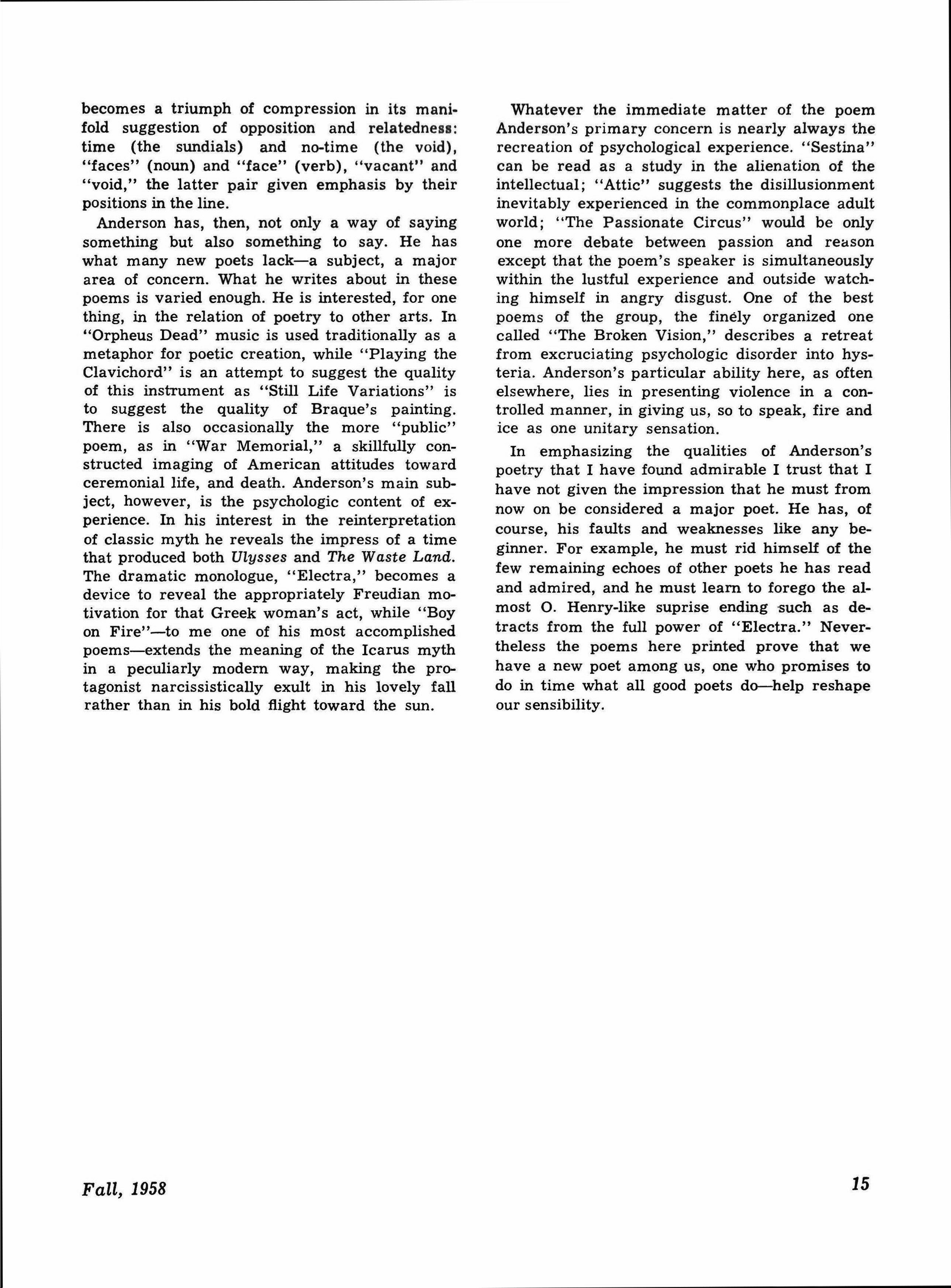
Whatever the immediate matter of the poem Anderson's primary concern is nearly always the recreation of psychological experience. "Sestina" can be read as a study in the alienation of the intellectual; "Attic" suggests the disillusionment inevitably experienced in the commonplace adult world; "The Passionate Circus" would be only one more debate between passion and reason except that the poem's speaker is simultaneously within the lustful experience and outside watching himself in angry disgust. One of the best poems of the group, the finely organized one called "The Broken Vision," describes a retreat from excruciating psychologic disorder into hysteria. Anderson's particular ability here, as often elsewhere, lies in presenting violence in a controlled manner, in giving us, so to speak, fire and ice as one unitary sensation.
In emphasizing the qualities of Anderson's poetry that I have found admirable I trust that I have not given the impression that he must from now on be considered a major poet. He has, of course, his faults and weaknesses like any beginner. For example, he must rid himself of the few remaining echoes of other poets he has read and admired, and he must learn to forego the almost O. Henry-like suprise ending 'such as detracts from the full power of "Electra." Nevertheless the poems here printed prove that we have a new poet among us, one who promises to do in time what all good poets do-help reshape our sensibility.
Fall, 1958
15
lack Warren Anderson
Jack Anderson, whose home is in Milwaukee, waa graduated from the School Of Speech at Northwestern in 1957, received an M.A. from the University of Indiana in the summer of 1958, and during the present academic year will continue his graduate work at the University of California at Berkeley, where he has a teaching assistantship. Coastlines and the Colorado Quarterly have accepted poems of his for publication. The poems published here were written at Northwestern and at Indiana. Anderson is twenty-one years old.
POEMS
Orpheus Dead
Shall your dust rise again, your broken bones
Create a music from this mockery:
Aeolian harps of sun-bleached skeletons
Untuned to any tonic, aimlessly Jangling at the touch of every wind; Or, pitched from scale, discordant zodiac
Smashing its mansions with a jagged chord? What key can ever bring dead music back?
Old singer, with a pilgrim's reverence
Before a shrine, I ask the lyric gift Of harmony to temper dissonance; And, from the relics of your myth, I lift A bone as talisman, that it may spring To life again-eternal lyre-and sing.
Ballade: Rites 0/ Passage
Curled upon the bottom of the sea, Insensate to the gentle ebb and flow Of soft unusual tides which cradled me, I rocked in sleep, with nothing to foreshow That I would wrench awake and have to go Beyond the rivers of my dark domain
Through passageways, torturous and slow, To birth emergent from the bed of pain.
And, later, I rebelled in agony
Against the bloody gift the knives bestow, Not recognizing new nativity, Feeling only death in each sharp blow
Upon my tender skin, an overthrow Of that frail armor I needed to restrain
My hidden powers attacking me, their foe, In birth emerging from the bed of pain.
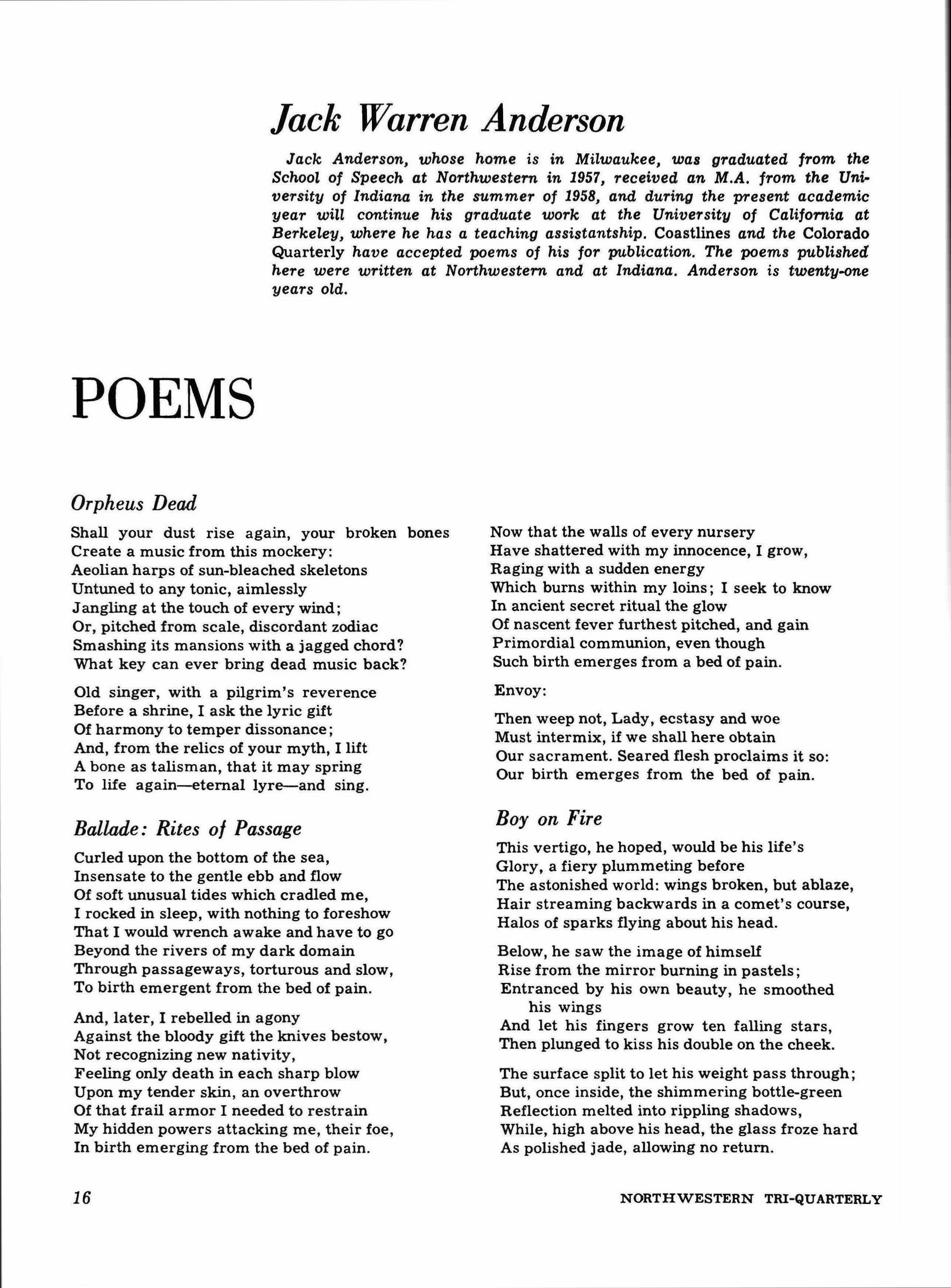
Now that the walls of every nursery Have shattered with my innocence, I grow, Raging with a sudden energy Which burns within my loins; I seek to know In ancient secret ritual the glow Of nascent fever furthest pitched, and gain Primordial communion, even though Such birth emerges from a bed of pain.
Envoy:
Then weep not, Lady, ecstasy and woe Must intermix, if we shall here obtain Our sacrament. Seared flesh proclaims it so: Our birth emerges from the bed of pain.
Boy on Fire
This vertigo, he hoped, would be his life's Glory, a fiery plummeting before The astonished world: wings broken, but ablaze, Hair streaming backwards in a comet's course, Halos of sparks flying about his head.
Below, he saw the image of himself Rise from the mirror burning in pastels; Entranced by his own beauty, he smoothed his wings
And let his fingers grow ten falling stars, Then plunged to kiss his double on the cheek.
The surface split to let his weight pass through; But, once inside, the shimmering bottle-green Reflection melted into rippling shadows, While, high above his head, the glass froze hard As polished jade, allowing no return.
16
NORTHWESTERN TRI-QUARTERLY
And now, imprisoned in the mirror's depths, He gazes at blue-tinted suns which once Were gold, recalls his youthful plunge, and so None may forget, throws, as a souvenir, A seaweed lock of hair upon the shore.
The Broken Vision
Polishing my sight to better see the perfect precision of my monuments, my endless colonnades of ordered arch, I tipped the landscape with a crash of shattering windowpanes.
Gaping out upon the splintered world, I saw my ruins rise in jagged planes, broken angles, cracked columns; and heard the tinkle as the last image split.
Then, as the sun strikes sparks from crystal or lightning from a strip of chromium, everything about me turned a burning-glass, converging fire beneath my chills-and-fevered eyes, ablaze with heat of ice, the burning stab of diamond point; and I, reciprocating, threw a flame to char the remnants of old panoramas.
Retreating inward, burrowing, gouging out my sight, I ran down the narrow hallway of a scream and tumbled off the edge of silence into a black velvet-curtained room where, hidden among the shards, I yammer to keep the glazier away.
Still Life Variations
(Hommage a Georges Braoue)
IHowever sweet the viol and guitar, or rich the human voice of clarinet, still sweeter is the music of repose: the score unopened, lest a false note mar the perfect harmonies which only thought serene in silent contemplation knows.
Then let the unplayed instruments lie where clear-seeing tranquil eyes may meditate upon still life (the uncut loaves of bread, the empty jugs), at last perceiving there the form of intellection's ultimate: a chessboard on which games are never played.
Fall, 1958
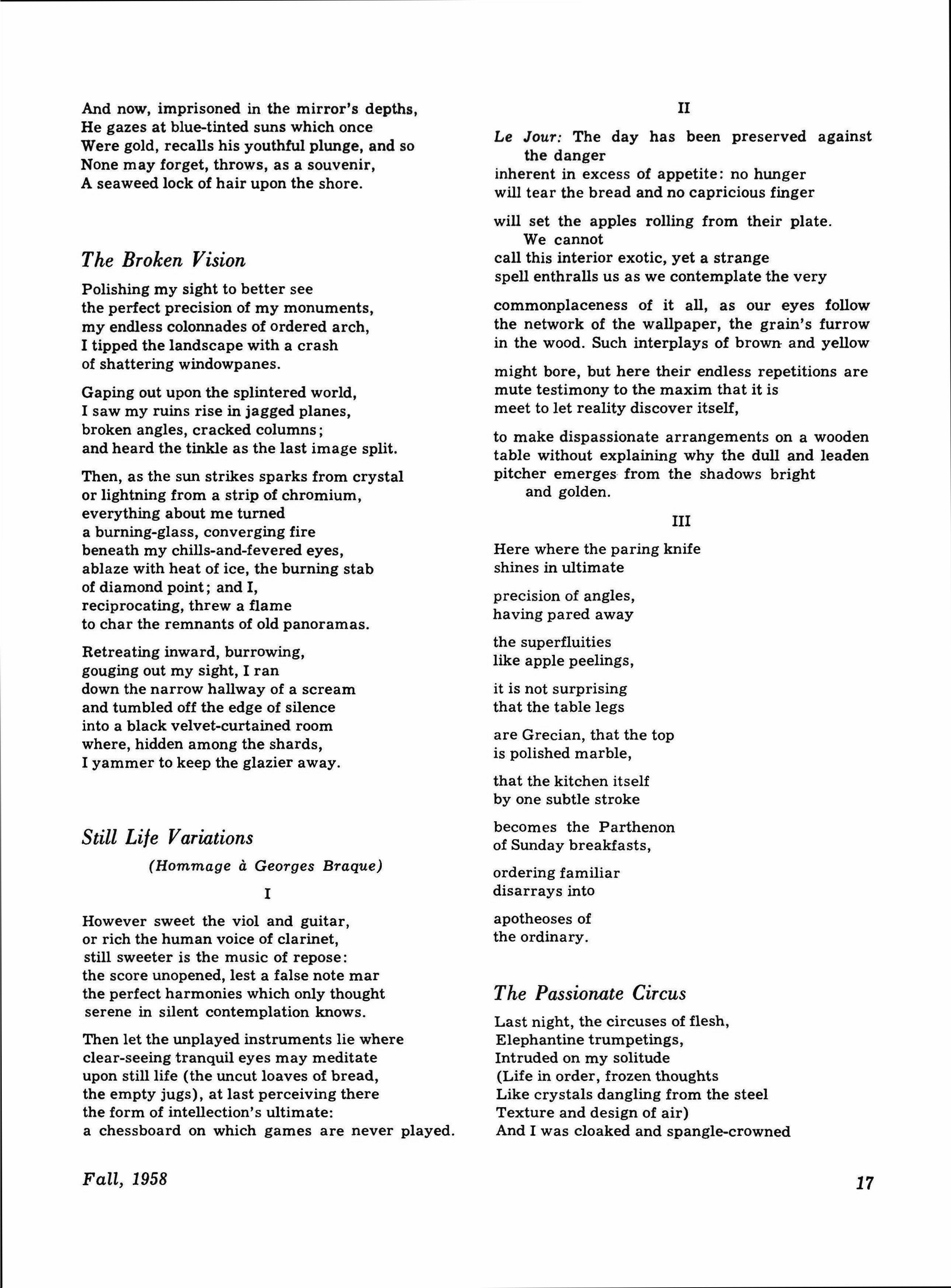
II
Le Jour: The day has been preserved against the danger inherent in excess of appetite: no hunger will tear the bread and no capricious finger will set the apples rolling from their plate. We cannot call this interior exotic, yet a strange spell enthralls us as we contemplate the very commonplaceness of it all, as our eyes follow the network of the wallpaper, the grain's furrow in the wood. Such interplays of brown and yellow
might bore, but here their endless repetitions are mute testimony to the maxim that it is meet to let reality discover itself, to make dispassionate arrangements on a wooden table without explaining why the dull and leaden pitcher emerges from the shadows bright and golden.
III
Here where the paring knife shines in ultimate precision of angles, having pared away the superfluities like apple peelings, it is not surprising that the table legs are Grecian, that the top is polished marble, that the kitchen itself by one subtle stroke becomes the Parthenon of Sunday breakfasts, ordering familiar disarrays into apotheoses of the ordinary.
The Passionate Circus
Last night, the circuses of flesh, Elephantine trumpetings, Intruded on my solitude (Life in order, frozen thoughts Like crystals dangling from the steel Texture and design of air) And I was cloaked and spangle-crowned
17
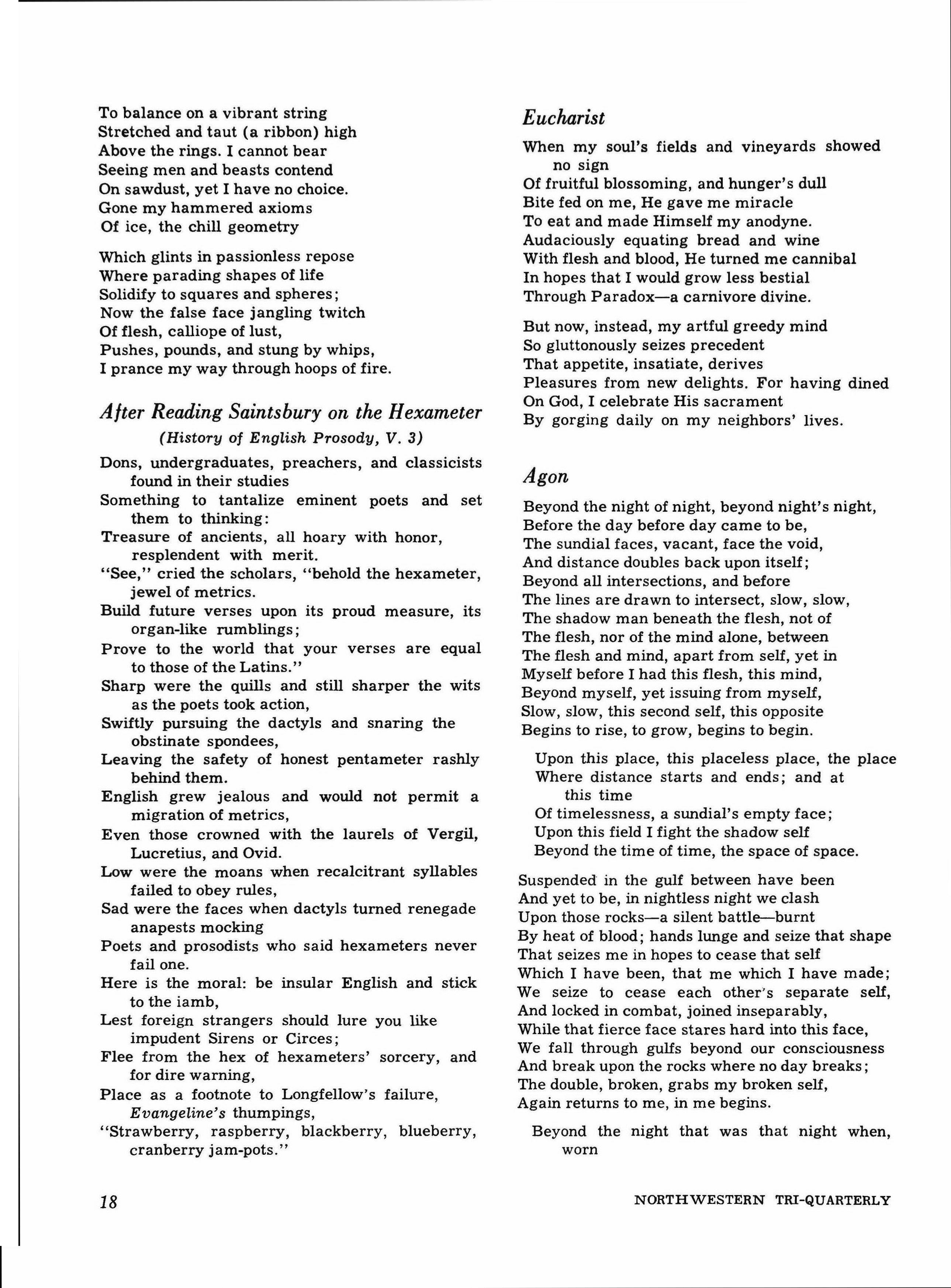
To balance on a vibrant string
Stretched and taut (a ribbon) high Above the rings. I cannot bear Seeing men and beasts contend On sawdust, yet I have no choice. Gone my hammered axioms Of ice, the chill geometry
Which glints in passionless repose Where parading shapes of life
Solidify to squares and spheres; Now the false face jangling twitch Of flesh, calliope of lust, Pushes, pounds, and stung by whips, I prance my way through hoops of fire.
After
Reading Saintsbury on the Hexameter
(History of English Prosody, V. 3)
Dons, undergraduates, preachers, and classicists found in their studies
Something to tantalize eminent poets and set them to thinking:
Treasure of ancients, all hoary with honor, resplendent with merit.
"See," cried the scholars, "behold the hexameter, jewel of metrics.
Build future verses upon its proud measure, its organ-like rumblings;
Prove to the world that your verses are equal to those of the Latins."
Sharp were the quills and still sharper the wits as the poets took action, Swiftly pursuing the dactyls and snaring the obstinate spondees, Leaving the safety of honest pentameter rashly behind them.
English grew jealous and would not permit a migration of metrics, Even those crowned with the laurels of Vergil, Lucretius, and Ovid.
Low were the moans when recalcitrant syllables failed to obey rules, Sad were the faces when dactyls turned renegade anapests mocking Poets and prosodists who said hexameters never fail one.
Here is the moral: be insular English and stick to the iamb, Lest foreign strangers should lure you like impudent Sirens or Circes; Flee from the hex of hexameters' sorcery, and for dire warning, Place as a footnote to Longfellow's failure, Evangeline's thumpings, "Strawberry, raspberry, blackberry, blueberry, cranberry jam-pots."
Eucharist
When my soul's fields and vineyards showed no sign Of fruitful blossoming, and hunger's dull Bite fed on me, He gave me miracle To eat and made Himself my anodyne. Audaciously equating bread and wine With flesh and blood, He turned me cannibal In hopes that I would grow less bestial Through Paradox-a carnivore divine.
But now, instead, my artful greedy mind So gluttonously seizes precedent That appetite, insatiate, derives Pleasures from new delights. For having dined On God, I celebrate His sacrament By gorging daily on my neighbors' lives.
Agon.
Beyond the night of night, beyond night's night, Before the day before day came to be, The sundial faces, vacant, face the void, And distance doubles back upon itself; Beyond all intersections, and before The lines are drawn to intersect, slow, slow, The shadow man beneath the flesh, not of The flesh, nor of the mind alone, between The flesh and mind, apart from self, yet in Myself before I had this flesh, this mind, Beyond myself, yet issuing from myself, Slow, slow, this second self, this opposite Begins to rise, to grow, begins to begin.
Upon this place, this placeless place, the place Where distance starts and ends; and at this time
Of timelessness, a sundial's empty face; Upon this field I fight the shadow self Beyond the time of time, the space of space.
Suspended in the gulf between have been And yet to be, in nightless night we clash Upon those rocks-a silent battle-burnt By heat of blood; hands lunge and seize that shape That seizes me in hopes to cease that self Which I have been, that me which I have made; We seize to cease each other's separate self, And locked in combat, joined inseparably, While that fierce face stares hard into this face, We fall through gulfs beyond our consciousness And break upon the rocks where no day breaks; The double, broken, grabs my broken self, Again returns to me, in me begins.
Beyond the night that was that night when, worn
18
NORTHWESTERN TRI-QUARTERLY
By combat, self is merged with double-self, Within myself, flesh-flayed and spirit-torn, I find his hands my hands, his face my face, Yet not my hands, my face, but mine reborn.
Revelations
Sometimes, emerging from the tediums
Of ordinariness, some little space
Of land-some patch of stones and trees-becomes
More than a setting for the commonplace. Then winds blow vatic whispers in the ear
While gnats, turned Jeremiahs, prophesy; Bird-Latin chattered overhead grows clear, Apocalypses buzz in every fly, And all the landscape shakes itself awake
To bristle suddenly with life, as if In one pin-point of time it tried to make An explication of its hieroglyph, Revealing in perfect lucidity
Its giddy secular Epiphany.
Electra
o Justice, Justice shining out of blood in blessed cruelties of steel!
For Right is Right, demanding vengeance as it shouldor what's religion for?
The very sight of mother's crocodile tearsand him, the king, inspecting hospitals and bridges, ever trying to make us forget the loathsome thing he'd done-
this made me sick. Forget? Never! And as for their benevolent reign, my spittle defiled such tainted sops of charity; against their waterworks and bridges I'd hurl my curse.
For Justice demands each jot and tittle of sin set right. That mission was destined for me:
o Father, have I been your good little girl?
Impromptu with Birds
Cacophonous black chords of steel and thudding rhythms of the mind blaring in the rubble of these continentsyet birds spring up and whirl across the skies, birds with sun-tipped wings which sing of fragile balances preserved in perfect equipoise.
Fall, 1958
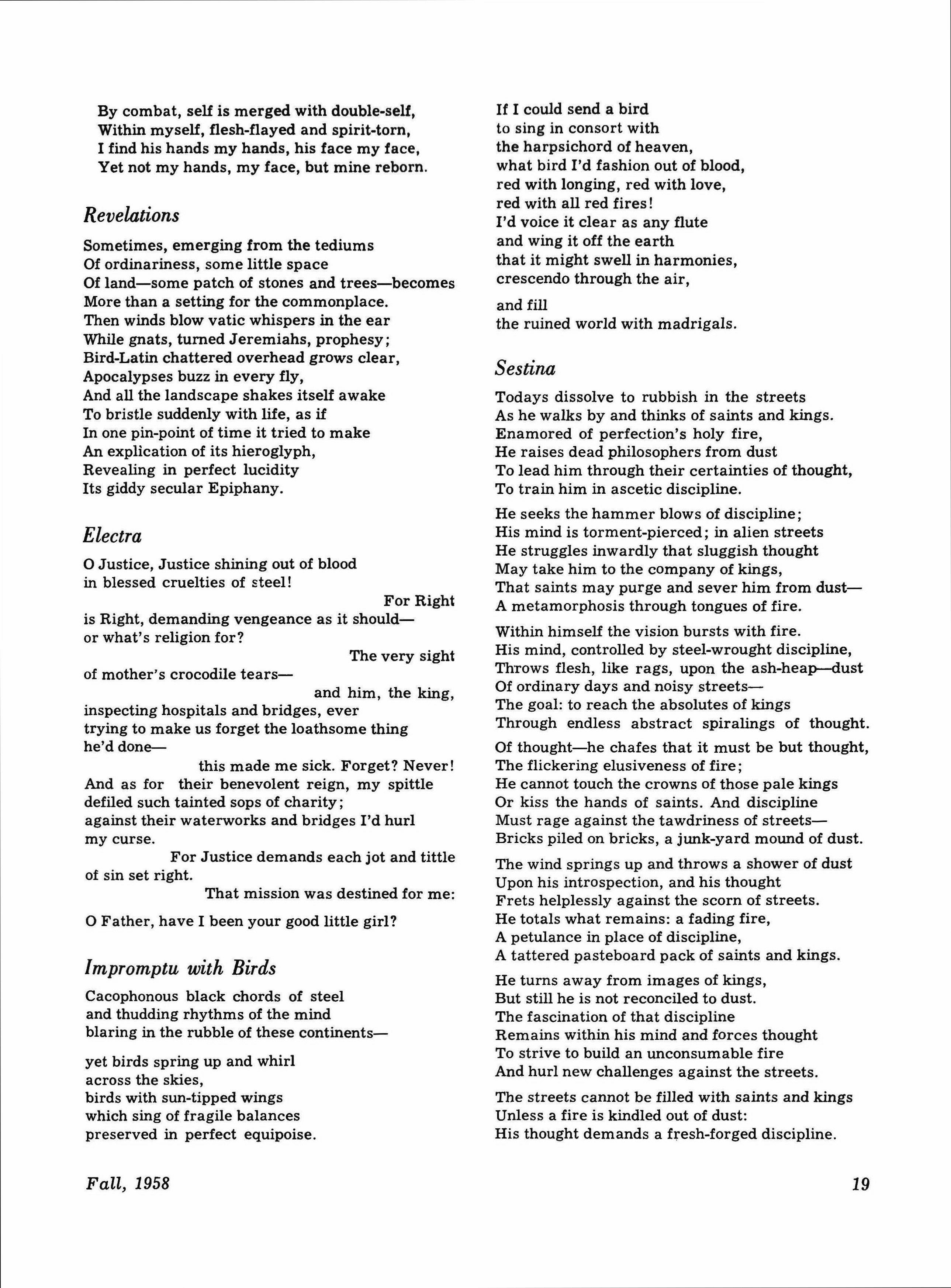
If I could send a bird to sing in consort with the harpsichord of heaven, what bird I'd fashion out of blood, red with longing, red with love, red with all red fires! I'd voice it clear as any flute and wing it off the earth that it might swell in harmonies, crescendo through the air, and fill the ruined world with madrigals.
Sestina
Todays dissolve to rubbish in the streets As he walks by and thinks of saints and kings. Enamored of perfection's holy fire, He raises dead philosophers from dust To lead him through their certainties of thought, To train him in ascetic discipline.
He seeks the hammer blows of discipline; His mind is torment-pierced; in alien streets He struggles inwardly that sluggish thought May take him to the company of kings, That saints may purge and sever him from dustA metamorphosis through tongues of fire.
Within himself the vision bursts with fire.
His mind, controlled by steel-wrought discipline, Throws flesh, like rags, upon the ash-heap=dust Of ordinary days and noisy streetsThe goal: to reach the absolutes of kings Through endless abstract spiralings of thought. Of thought-he chafes that it must be but thought, The flickering elusiveness of fire; He cannot touch the crowns of those pale kings Or kiss the hands of saints. And discipline Must rage against the tawdriness of streetsBricks piled on bricks, a junk-yard mound of dust.
The wind springs up and throws a shower of dust Upon his introspection, and his thought Frets helplessly against the scorn of streets. He totals what remains: a fading fire, A petulance in place of discipline, A tattered pasteboard pack of saints and kings.
He turns away from images of kings, But still he is not reconciled to dust.
The fascination of that discipline
Remains within his mind and forces thought To strive to build an unconsumable fire And hurl new challenges against the streets.
The streets cannot be filled with saints and kings Unless a fire is kindled out of dust: His thought demands a fresh-forged discipline.
19
War Memorial
A shrine may be a tombthe American flag hangs in the serenity of the vault. Here reverence is artifice: the gilt columns demand only contemplation of their luxury, while unadorned death would sicken civic pride in all those big old words so easily cut into stone. The star of destiny turns off and on at willa simple switch does it; and should the power fail, few passers-by would take notice.
For, outside, the children throw stones at a stray dog and wrestle unconcernedly upon the hallowed steps; the slate sky, opaque and holding no promises of natural stars, arches like the dome of a monument; and the winter city, indifferent to shrines, patiently waits for the falling of soft familiar death.
Cups, Fugues, Maps, Etc.
The pin was stuck into eternity, and it ticked:
maps and clocks are yardsticks measuring space and life; music, too, is measured, counted by metronomes and carpentered to fences, blackbirds sitting on the wires.
Old ladies charting gardens, laying stones and tying string to fix the latitude and longitude of flower beds;
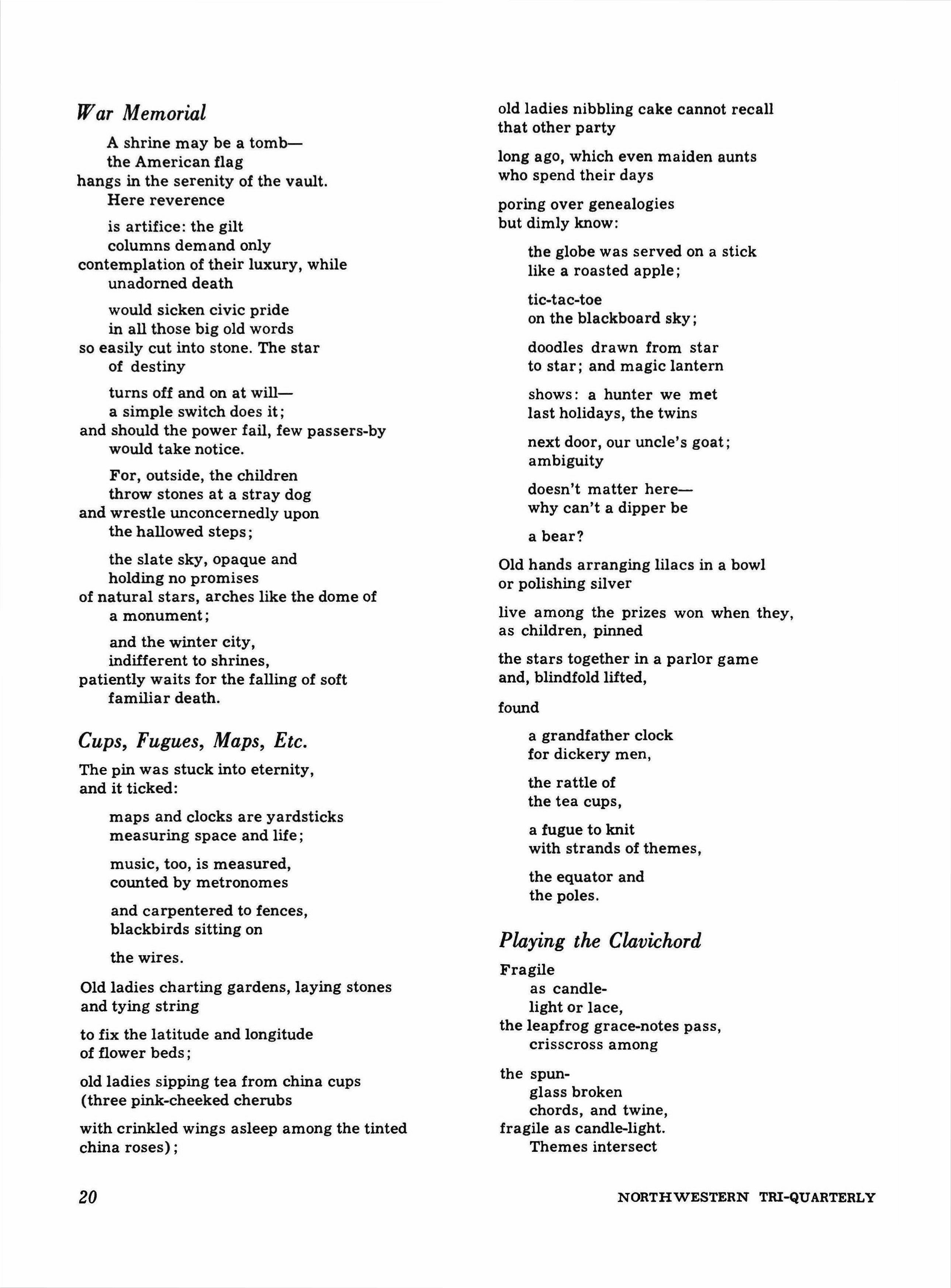
old ladies nibbling cake cannot recall that other party long ago, which even maiden aunts who spend their days poring over genealogies but dimly know: the globe was served on a stick like a roasted apple; tic-tao-toe on the blackboard sky; doodles drawn from star to star; and magic lantern shows: a hunter we met last holidays, the twins next door, our uncle's goat; ambiguity doesn't matter herewhy can't a dipper be a bear?
Old hands arranging lilacs in a bowl or polishing silver live among the prizes won when they, as children, pinned the stars together in a parlor game and, blindfold lifted, found
a grandfather clock for dickery men, the rattle of the tea cups, a fugue to knit with strands of themes, the equator and the poles.
Playing
the Clavichord Fragile as candlelight or lace, the leapfrog grace-notes pass, crisscross among
old ladies sipping tea from china cups (three pink-cheeked cherubs with crinkled wings asleep among the tinted china roses) ; the spunglass broken chords, and twine, fragile as candle-light. Themes intersect
20 NORTHWESTERN TRI-QUARTERLY
and twist; mordents dart flapping wings of candle-light or lace, and start to wind a skein (spun-glass and cobweb cord) as leapfrog grace-notes pass through knotted themes.
The silk loure and gigue, the courante, fragile as candle-lightthe suite, now spun, entwines sarabandes, allemandes with candle-light and lace and threads of glass: complete ornament. Down the strings the leapfrog grace-notes pass, ephemeral, fragile as candlelight or lace. The leapfrog grace-notes pass like shadows over glass.
Legend
Wondering what strange enchantment could erase
The smiles of friends so suddenly, I pushed Tiptoe through veils and whispers to the hushed And scented parlor, now a magic place
Where, as though sleeping in a jewel case, A lady lay, turned white as candle-wax, Her fingers clasped about a crucifix. And staring at the pallor of her face, I thought I understood the meaning of Her enigmatic silence. But then why Did someone with a slap and muttered oath Drag me away, when it was pious love And knightly dauntlessness which made me try To shake the treacherous apple from her mouth?
Fall, 1958
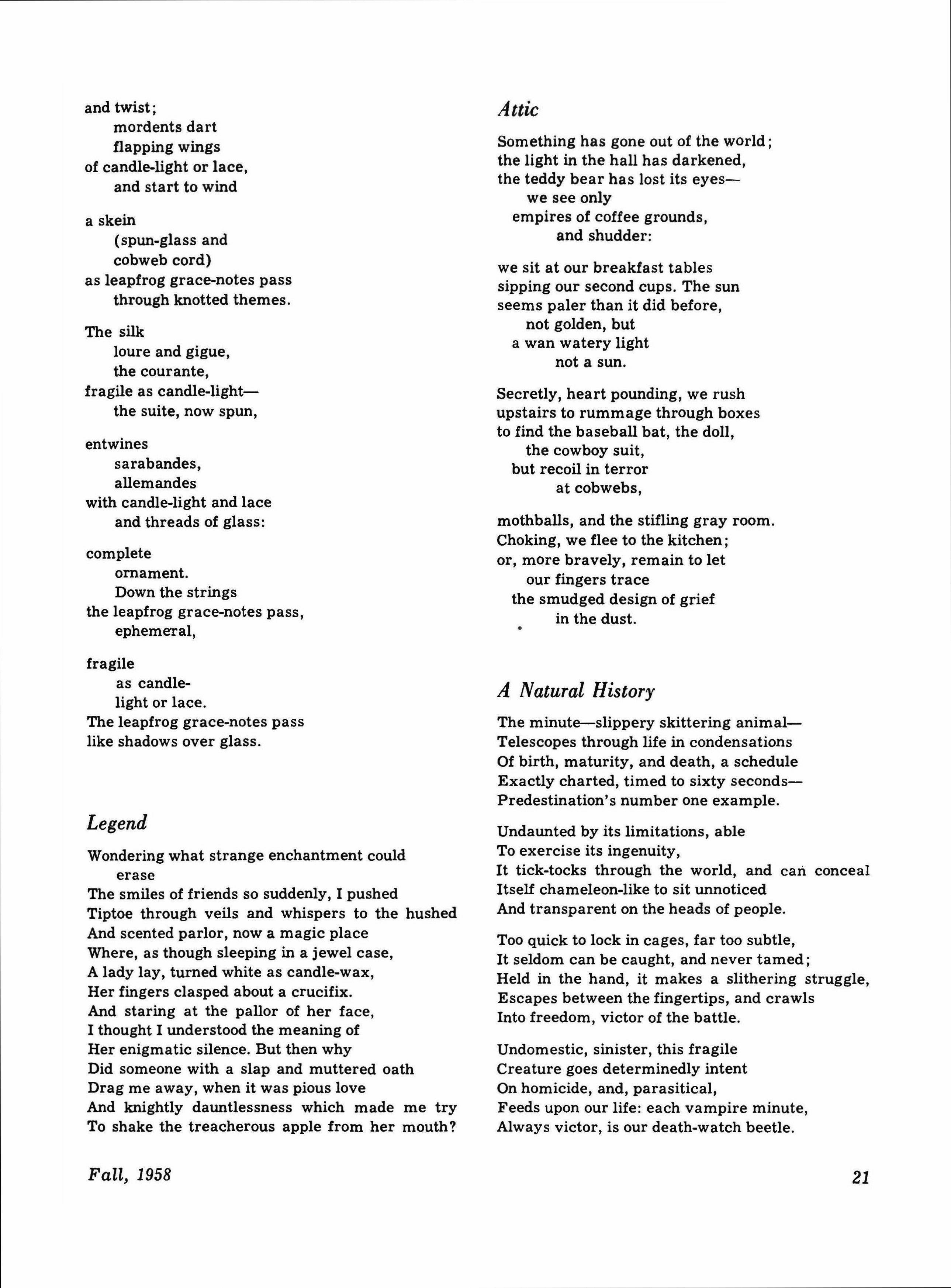
Attic
Something has gone out of the world: the light in the hall has darkened, the teddy bear has lost its eyeswe see only empires of coffee grounds, and shudder:
we sit at our breakfast tables sipping our second cups. The sun seems paler than it did before, not golden, but a wan watery light not a sun.
Secretly, heart pounding, we rush upstairs to rummage through boxes to find the baseball bat, the doll, the cowboy suit, but recoil in terror at cobwebs,
mothballs, and the stifling gray room. Choking, we flee to the kitchen; or, more bravely, remain to let our fingers trace the smudged design of grief in the dust.
A Natural History
The minute-slippery skittering animalTelescopes through life in condensations Of birth, maturity, and death, a schedule Exactly charted, timed to sixty secondsPredestination's number one example.
Undaunted by its limitations, able To exercise its ingenuity, It tick-tocks through the world, and can conceal Itself chameleon-like to sit unnoticed And transparent on the heads of people.
Too quick to lock in cages, far too subtle, It seldom can be caught, and never tamed; Held in the hand, it makes a slithering struggle, Escapes between the fingertips, and crawls Into freedom, victor of the battle.
Undomestic, sinister, this fragile Creature goes determinedly intent On homicide, and, parasitical, Feeds upon our life: each vampire minute, Always victor, is our death-watch beetle.
21
Richard A. Tilden, Jr.
Mr. Richard Tilden, a native Californian who lives in Scarsdale, New York, is twenty-one, a Physics major at Northwestern, and divides an admiration for fiction and Mathematics. The theme of his story is pleasant suburban suicide.
ELEGY
ONEAFTERNOON while riding the Banker's Special, Frank Lippscomp decided to commit suicide. The decision occurred about one minute out of Mount Vernon, and by the time the train had reached Mamaroneck had become purpose. He disembarked lightly despite his weariness, his new resolution making his "Hello, nice evening," to Si Mathers, who alighted from the next car, unusually bright. But as he descended the stairway of the underpass, his customary lethargy overcame him again, and he realized that this decision did not merit peace. He knew that there was much to do, many problems to overcome before he could attain the peace he promised himself. With his usual tired gait, he crossed the musty, damp corridor and slowly climbed the steps on the other side.
Above ground the sun was still halfway up the sky, and the early evening was bright. Frank thought he could either mow the front lawn before dinner or have an extra martini. The choice was not a difficult one, being made in favor of the martini on most warm summer evenings. His little Volkswagen was parked halfway down the line of cars with a Buick blocking it, the fadingly lovely woman in the driver's seat craning her head towards him to see if he were her husband. He wasn't, and so folded himself into the seat of the VW and started the engine. After a moment the woman aroused herself sufficiently to move forward barely enough, and Frank backed out and headed up Mamaroneck Road. A few minutes later, he was pulling the car gingerly into the garage where Dotty had parked the Olds too far over as usual.
Dan Cheever, his neighbor, was watering his lawn as Frank pulled down the garage door. He went over to discuss his decision with Dan.
"Rough day?"
"As usual."
"Same here."
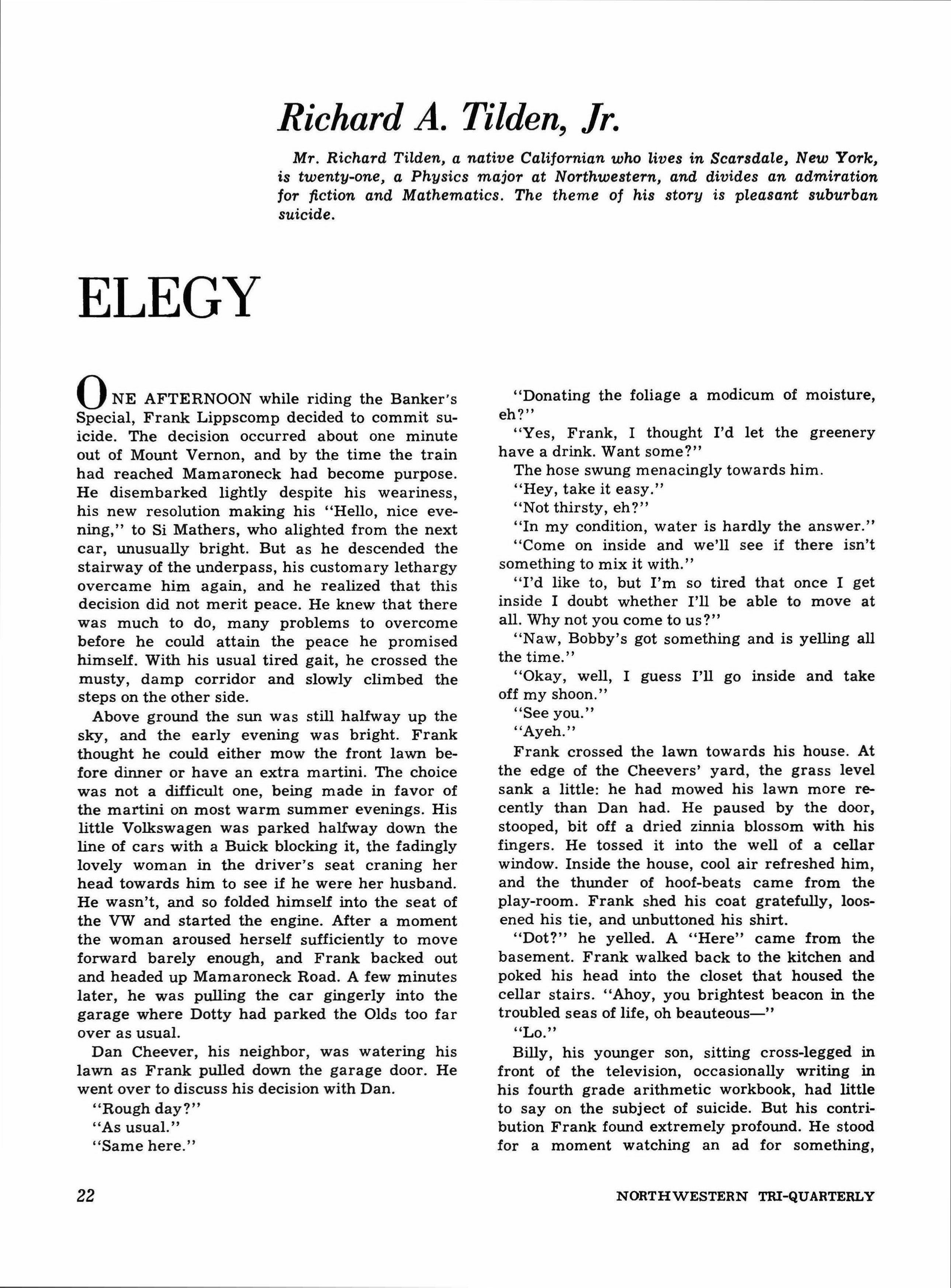
"Donating the foliage a modicum of moisture, eh?"
"Yes, Frank, I thought I'd let the greenery have a drink. Want some?"
The hose swung menacingly towards him.
"Hey, take it easy."
"Not thirsty, eh?"
"In my condition, water is hardly the answer."
"Come on inside and we'll see if there isn't something to mix it with."
"I'd like to, but I'm so tired that once I get inside I doubt whether I'll be able to move at all. Why not you come to us?"
"Naw, Bobby's got something and is yelling all the time."
"Okay, well, I guess I'll go inside and take off my shoon."
"See you."
"Ayeh."
Frank crossed the lawn towards his house. At the edge of the Cheevers' yard, the grass level sank a little: he had mowed his lawn more recently than Dan had. He paused by the door, stooped, bit off a dried zinnia blossom with his fingers. He tossed it into the well of a cellar window. Inside the house, cool air refreshed him, and the thunder of hoof-beats came from the play-room. Frank shed his coat gratefully, loosened his tie, and unbuttoned his shirt.
"Dot?" he yelled. A "Here" came from the basement. Frank walked back to the kitchen and poked his head into the closet that housed the cellar stairs. "Ahoy, you brightest beacon in the troubled seas of life, oh beauteous-"
"Lo.
Billy, his younger son, sitting cross-legged in front of the television, occasionally writing in his fourth grade arithmetic workbook, had little to say on the subject of suicide. But his contribution Frank found extremely profound. He stood for a moment watching an ad for something,
22
NORTHWESTERN TRl-QUARTERLY
and his son chewing his pencil, until Billy turned and said, not joyfully, but not without interest, "Hi, Dad."
"How's it going, Son?"
"Miss Sibmer said I was one of the most improved spellers of all."
"But the arithmetic still needs work."
"Yup." The little boy grinned and his father grinned back. He thought of rumpling the boy's hair, but that would have involved crossing the room, while it added but little to the mutual pleasure of the moment.
On the hall table was a little stack of mail, among which Frank noticed a letter containing his other son, Frank, Jr.'s opinions on suicide. He let it stay there while he went upstairs and changed his clothes and washed his face. When he got back downstairs, he found his wife in the kitchen, peeling an onion under running water so that her eyes wouldn't tear.
She pointed to the table and said, "Ice," without looking up.
"Monosyllabic, aren't we?"
She looked at him and smiled, "Umm."
Frank got the pitcher from the cupboard, filled it with ice, and judiciously tilted the gin bottle over it. Detachedly he saw the pitcher fill, tilted the bottle back, and with an air of deep concentration added another dollop. Then he carefully measured a quarter jigger of vermouth into the pitcher, gathered martinis, glasses and wife and repaired to the living room. Dotty appeared uncommonly gay, he thought, to be preparing seriously to discuss the question of her husband's impending suicide with him. For that matter, he himself was approaching the problem with a satisfactory degree of unconcern.
"Letter from Effjay," she informed him.
"So I noticed."
"Perspicacious.
"I thought so."
The living room, with air-conditioner in the window, was cool and pleasant. To Frank's comment to this effect, Dotty said, "Umm," and continued the patrol of the room she had begun a moment before. "Bill, have you got the paper?" Assent issued from the playroom. Dotty went and got the paper while Frank stirred the martinis with gusto, and poured the glasses full. Immediate moisture appeared on the outside of the glasses. He sat down on the couch and pulled the coffee-table closer. Dotty sat beside him and he kissed her firmly.
Then he picked up a glass and leaned back. He let the cold gin linger in his mouth a moment before swallowing luxuriously.
Fall, 1958
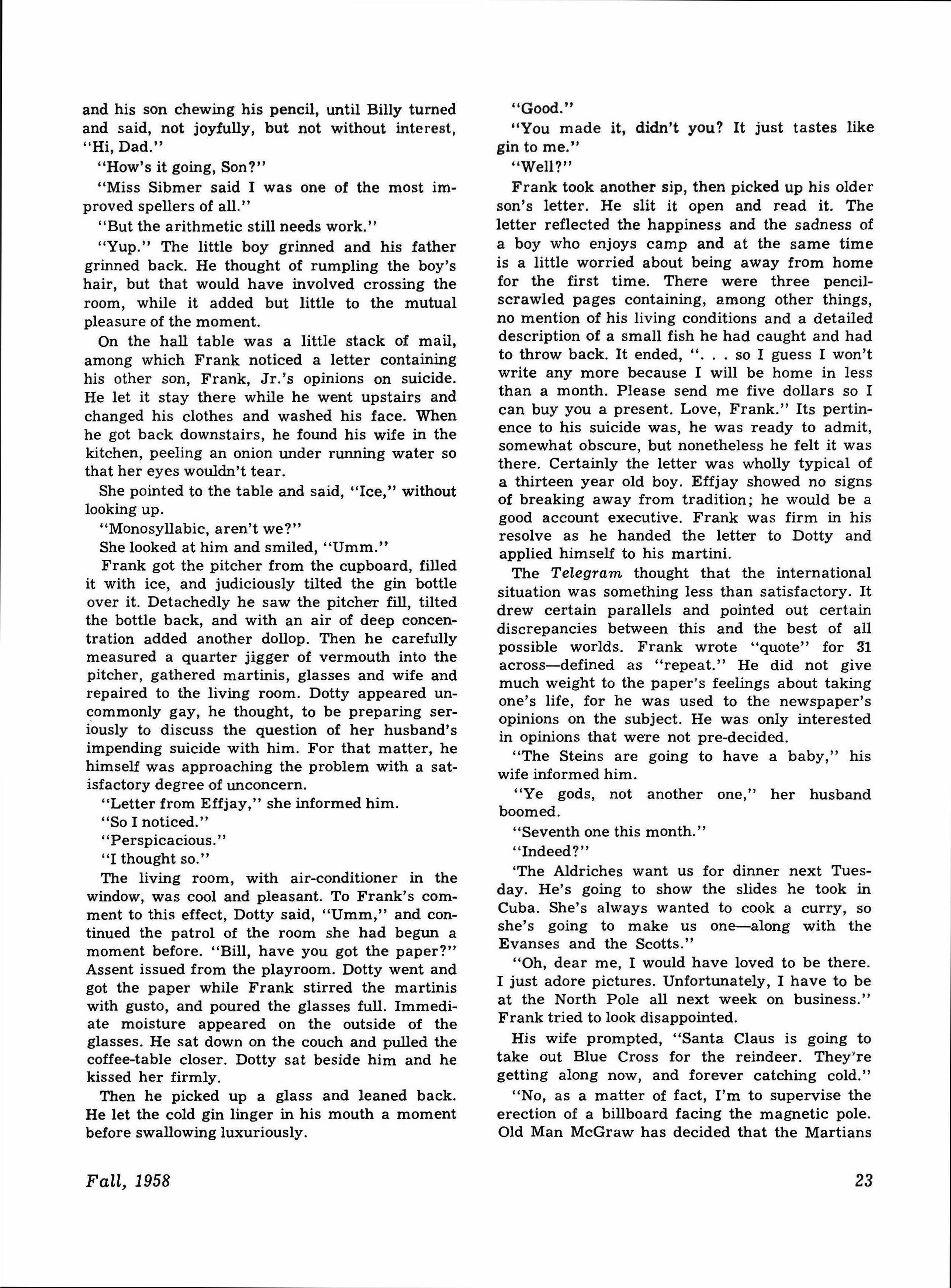
"Good."
"You made it, didn't you? It just tastes like gin to me."
"Well ?"
Frank took another sip, then picked up his older son's letter. He slit it open and read it. The letter reflected the happiness and the sadness of a boy who enjoys camp and at the same time is a little worried about being away from home for the first time. There were three pencilscrawled pages containing, among other things, no mention of his living conditions and a detailed description of a small fish he had caught and had to throw back. It ended, ". so I guess I won't write any more because I will be home in less than a month. Please send me five dollars so I can buy you a present. Love, Frank." Its pertinence to his suicide was, he was ready to admit, somewhat obscure, but nonetheless he felt it was there. Certainly the letter was wholly typical of a thirteen year old boy. Effjay showed no signs of breaking away from tradition; he would be a good account executive. Frank was firm in his resolve as he handed the letter to Dotty and applied himself to his martini.
The Telegram thought that the international situation was something less than satisfactory. It drew certain parallels and pointed out certain discrepancies between this and the best of all possible worlds. Frank wrote "quote" for 31 across-defined as "repeat." He did not give much weight to the paper's feelings about taking one's life, for he was used to the newspaper's opinions on the subject. He was only interested in opinions that were not pre-decided.
"The Steins are going to have a baby," his wife informed him.
"Ye gods, not another one," her husband boomed.
"Seventh one this month."
"Indeed?"
'The Aldriches want us for dinner next Tuesday. He's going to show the slides he took in Cuba. She's always wanted to cook a curry, so she's going to make us one-along with the Evanses and the Scotts."
"Oh, dear me, I would have loved to be there. I just adore pictures. Unfortunately, I have to be at the North Pole all next week on business."
Frank tried to look disappointed.
His wife prompted, "Santa Claus is going to take out Blue Cross for the reindeer. They're getting along now, and forever catching cold."
"No, as a matter of fact, I'm to supervise the erection of a billboard facing the magnetic pole. Old Man McGraw has decided that the Martians
23
will land there first, and that they'll be sure to want some insurance before facing the earthlings.
"Oh.
At this moment Billy entered the room.
"Mom, how do you spell 'through'?"
"T,h,r o.u.g.h, Would you go out in the kitchen and see if there's any water on the potatoes, please?"
Billy left, leaving his pencil on the coffee-table. Frank leaned back with his second martini. It had been a mistake to wait so long, he realized. Although all agreed that suicide was the only answer, they had a subtle manner of persuading him against it. They sapped away his energy, drained his resolve, left him with a martini in
one hand and a little sun on the lawn outside. Frank decided to wait until morning definitely to reverse himself, but felt sure that then he would still agree that he was too content to kill himself right away.
He said, "Solidarity breeds content."
His wife said, "What?"
He replied, "Nothing."
His small son came in and said, "Hey, what happened to my pencil?"
Sitting at home the evening of the day during the afternoon of which he had decided to commit suicide, Frank Lippscomp realized that he already had committed suicide.
"On the coffee-table, Bill."

Theodore Roethke
Mr. Roethke kindly sent this poem to us in advance of its first American publication in order that it might accompa.ny Ralph Mills' article on his poetry.
Plaint
Day after sombre day, I think my neighbors strange; In hell there is no change. Where's my eternity Of inward blessedness? I lack plain tenderness.
Where is the knowledge that Could bring me to my God? Not on this dusty road Or afternoon of light, Diminished by the haze Of late November days.
I lived with deep roots once: Have I forgotten their ways?The gradual embrace Of lichen around stones? Death is a deeper sleep, And I delight in sleep.
24 NORTHWESTERN TRI-QUARTERLY
Ralph J. Mills, Jr.
A native Chicagoan, Ralph Mills was graduated from Lake Forest College in 1954, received his M.A. from Northwestern in 1956, studied for a year at Oxford on an English Speaking Union scholarship (supplemented by Northwestern), and since 1957 has been a teaching assistant at Northwestern, where he is writing his Ph.D. thesis on Dylan Thomas. He has published an essay on Wallace Stevens in Accent, and on WilHam Faulkner and on E. E. Cummings in Gemini.
Mr. Mills regards his essay on Theodore Roethke as primarily an introdu.ction to his poetry for those who have not yet discovered t�e pleasure of reading this brilliant and most authentic poet. It is timed to coincide with the appearance of a new volume of Mr. Roethke's poems, WORDS FOR THE WIND, which will be published in November of this year.
Mr. Mills's essay for the TRI-QUARTERLY is the first of what the editor hopes will be a series of articles by different writers on living men of letters.
TOWARDS A CONDITION OF JOY
Patterns in the Poetry 01 Theodore Roethke*
II faut que tu te voies mourir
Pour savior que tu vis encore -PAUL ELUARD I
ONE OF THE dangers of an age that has produced important writers and literary revolutions such as our own is that the artists of subsequent generations may not receive the attention they deserve. The focus of readers turns upon the task of assimilating the pioneers, the originators of new styles, and there follows a neglect of
*The following poems by Theodore Roethke, and excerpts thereof, are being reprinted by permission of Doubleday & Co. Inc.:
"Open House", copyright, 1941, by Theodore Roethke; "Cuttings (Later)", copyright, 1948, by Theodore Roethke; "Root Cellar", copyright, 1943, by Modern Poetry Association, Inc.; "Transplanting", copyright, 1948, by Theodore Roethke; "The Lost Son", copyright, 1947, by Theodore Roethke; "0 Lull me, Lull me", copyright, 1951 by Theodore Roethke; "Where Knock is Open Wide", copyright, 1950, by Theodore
Fall, 1958

younger poets working in the light of the changes made by their immediate predecessors. Several rough but distinguishable phases may be marked out in twentieth century poetry: one includes the revolutionaries-Yeats, Eliot, Pound; another is composed of two groups, the first developing the inheritance of their forerunners (Auden, Spender, Day Lewis), the other in reaction to this legacy (Dylan Thomas, George Barker, David Gascoyne); a third consists of American writers who first became known during the second World War, such as Randall Jarrell, Robert Lowell,
Roethke; "Give Way, Ye Gates", first appeared in Botteghe Oscure No. VI, 1950; "The Dance", copyright, 1952, by The Atlantic Monthly; "The Partner", copyright, 1952, by Theodore Roethke; "The Vigil", copyright, 1953, by Theodore Roethke and "Plaint" which first appeared in Landmarks and Voyages, 1957, London.
All of these poems will appear in a new volume of poetry by Theodore Roethke entitled WORDS FOR THE WIND which will be published by Doubleday & Co. Inc. in November 1958.
25
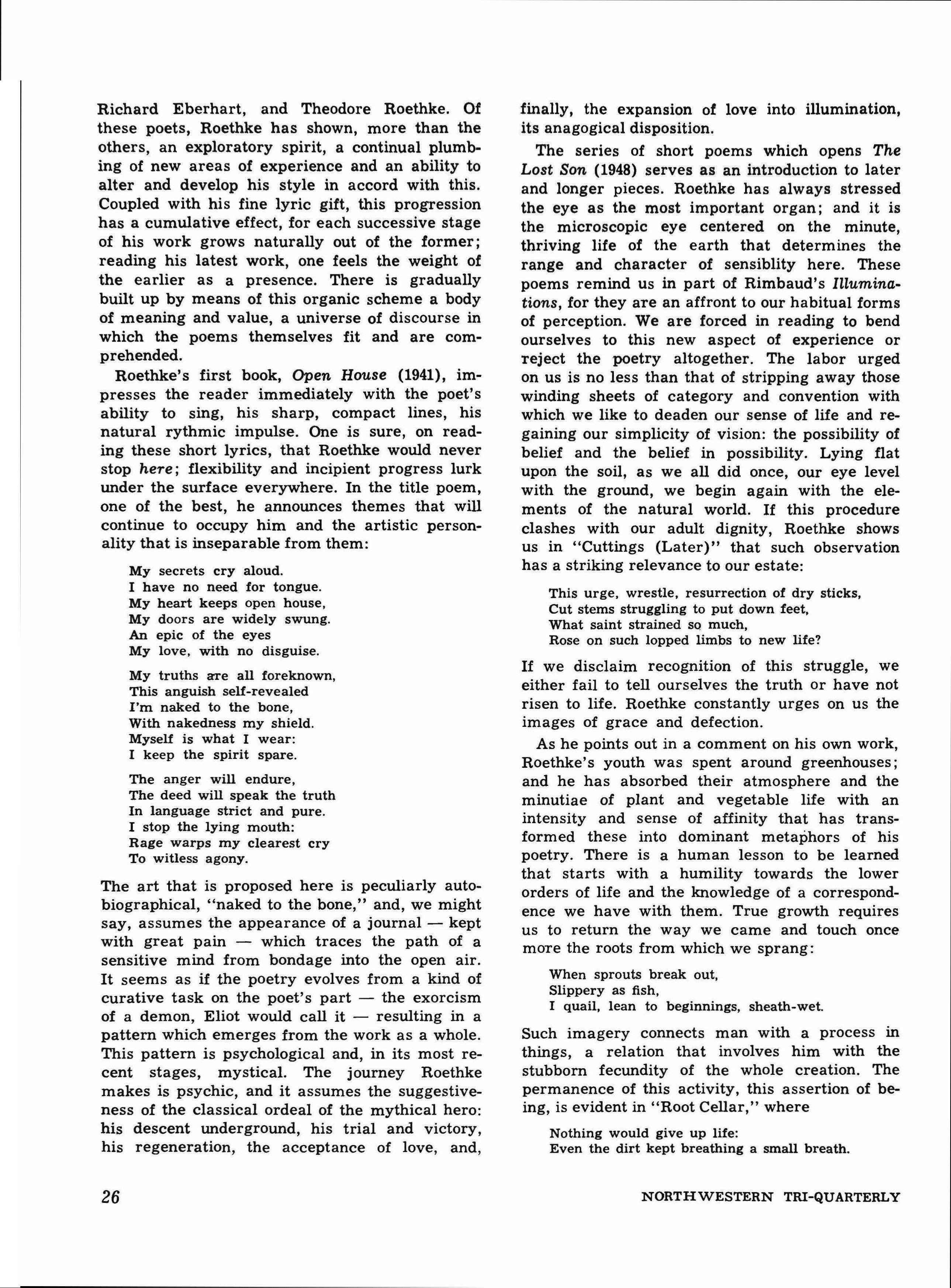
Richard Eberhart, and Theodore Roethke. Of these poets, Roethke has shown, more than the others, an exploratory spirit, a continual plumbing of new areas of experience and an ability to alter and develop his style in accord with this. Coupled with his fine lyric gift, this progression has a cumulative effect, for each successive stage of his work grows naturally out of the former; reading his latest work, one feels the weight of the earlier as a presence. There is gradually built up by means of this organic scheme a body of meaning and value, a universe of discourse in which the poems themselves fit and are comprehended.
Roethke's first book, Open House (1941), impresses the reader immediately with the poet's ability to sing, his sharp, compact lines, his natural rythmic impulse. One is sure, on reading these short lyrics, that Roethke would never stop here; flexibility and incipient progress lurk under the surface everywhere. In the title poem, one of the best, he announces themes that will continue to occupy him and the artistic personality that is inseparable from them:
My secrets cry aloud.
I have no need for tongue.
My heart keeps open house,
My doors are widely swung.
An epic of the eyes
My love, with no disguise.
My truths are all foreknown, This anguish self-revealed
I'm naked to the bone, With nakedness my shield.
Myself is what I wear:
I keep the spirit spare.
The anger will endure,
The deed will speak the truth
In language strict and pure.
I stop the lying mouth:
Rage warps my clearest cry
To witless agony.
The art that is proposed here is peculiarly autobiographical, "naked to the bone," and, we might say, assumes the appearance of a journal - kept with great pain - which traces the path of a sensitive mind from bondage into the open air. It seems as if the poetry evolves from a kind of curative task on the poet's part - the exorcism of a demon, Eliot would call it - resulting in a pattern which emerges from the work as a whole. This pattern is psychological and, in its most recent stages, mystical. The journey Roethke makes is psychic, and it assumes the suggestiveness of the classical ordeal of the mythical hero: his descent underground, his trial and victory, his regeneration, the acceptance of love, and,
finally, the expansion of love into illumination, its anagogical disposition.
The series of short poems which opens The Lost Son (1948) serves as an introduction to later and longer pieces. Roethke has always stressed the eye as the most important organ; and it is the microscopic eye centered on the minute, thriving life of the earth that determines the range and character of sensiblity here. These poems remind us in part of Rimbaud's Illuminations, for they are an affront to our habitual forms of perception. We are forced in reading to bend ourselves to this new aspect of experience or reject the poetry altogether. The labor urged on us is no less than that of stripping away those winding sheets of category and convention with which we like to deaden our sense of life and regaining our simplicity of vision: the possibility of belief and the belief in possibility. Lying flat upon the soil, as we all did once, our eye level with the ground, we begin again with the elements of the natural world. If this procedure clashes with our adult dignity, Roethke shows us in "Cuttings (Later)" that such observation has a striking relevance to our estate:
This urge, wrestle, resurrection of dry sticks, Cut stems struggling to put down feet.
What saint strained SQ much.
Rose on such lopped limbs to new life?
If we disclaim recognition of this struggle, we either fail to tell ourselves the truth or have not risen to life. Roethke constantly urges on us the images of grace and defection.
As he points out in a comment on his own work, Roethke's youth was spent around greenhouses; and he has absorbed their atmosphere and the minutiae of plant and vegetable life with an intensity and sense of affinity that has transformed these into dominant metaphors of his poetry. There is a human lesson to be learned that starts with a humility towards the lower orders of life and the knowledge of a correspondence we have with them. True growth requires us to return the way we came and touch once more the roots from which we sprang:
When sprouts break out.
Slippery as fish, I quail, lean to beginnings, sheath-wet.
Such imagery connects man with a process in things, a relation that involves him with the stubborn fecundity of the whole creation. The permanence of this activity, this assertion of being, is evident in "Root Cellar," where
Nothing would give up life:
Even the dirt kept breathing a small breath.
26
NORTHWESTERN TRI-QUARTERLY
These shorter poems are all concerned with what Roethke calls "the minimal." The themes and metaphors recurrent in them furnish a groundwork for more ambitious efforts and point to new departures. In a poem called "Transplanting," we watch young plants set down in fresh soil and, as if through the eye of a camera with a timing device, see them unfurl and bloom:
Watching hands transplanting, Turning and tamping, Lifting the young plants with two fingers, Sifting in a palm-full of fresh loam,One swift movement,Then plumping in the bunched roots, A single twist of the thumbs, a tamping and turning, All in one, Quick on the wooden bench, A shaking down, while the stem stays straight, Once, twice, and a faint third thump,Into the flat-box it goes, Ready for the long days under the sloped glass:
The sun warming the fine loam, The young horns winding and unwinding, Creaking their thin spines, The underleaves, the smallest buds
Breaking into nakedness, The blossoms extending Out into the sweet air, The whole flower extending outward, Stretching and reaching.
Roethke has clearly seen how the same essential striving upward is integral to the situation of man. This leads him to develop these relationships more fully in a series of longer poems. What is merely analogy in the early pieces becomes identity in later ones.
II
These poems, which extend and deepen Roethke's previous interests are printed as a sequence in The Waking (1953). Here, in a feat of imaginative re-creation, the poet explores the consciousness of childhood as it tries to leave the level of its origins and arrive at the full status of humanity. An intimate relationship with a universe, animal, vegetable, and mineral, is maintained and outlines a fundamental tension in man between a desire for existence and an impulse towards death or the inanimate. In order to realize within the poems the immediacy of this experience, Roethke has used a dramatic internal monologue, dramatic because it registers the impact of sensations from without on shifting attitudes within the mind, until there is a sort of dialectical arrangement between them. Like the "narratives" of Dylan Thomas, these contain abrupt changes:
Fall, 1958
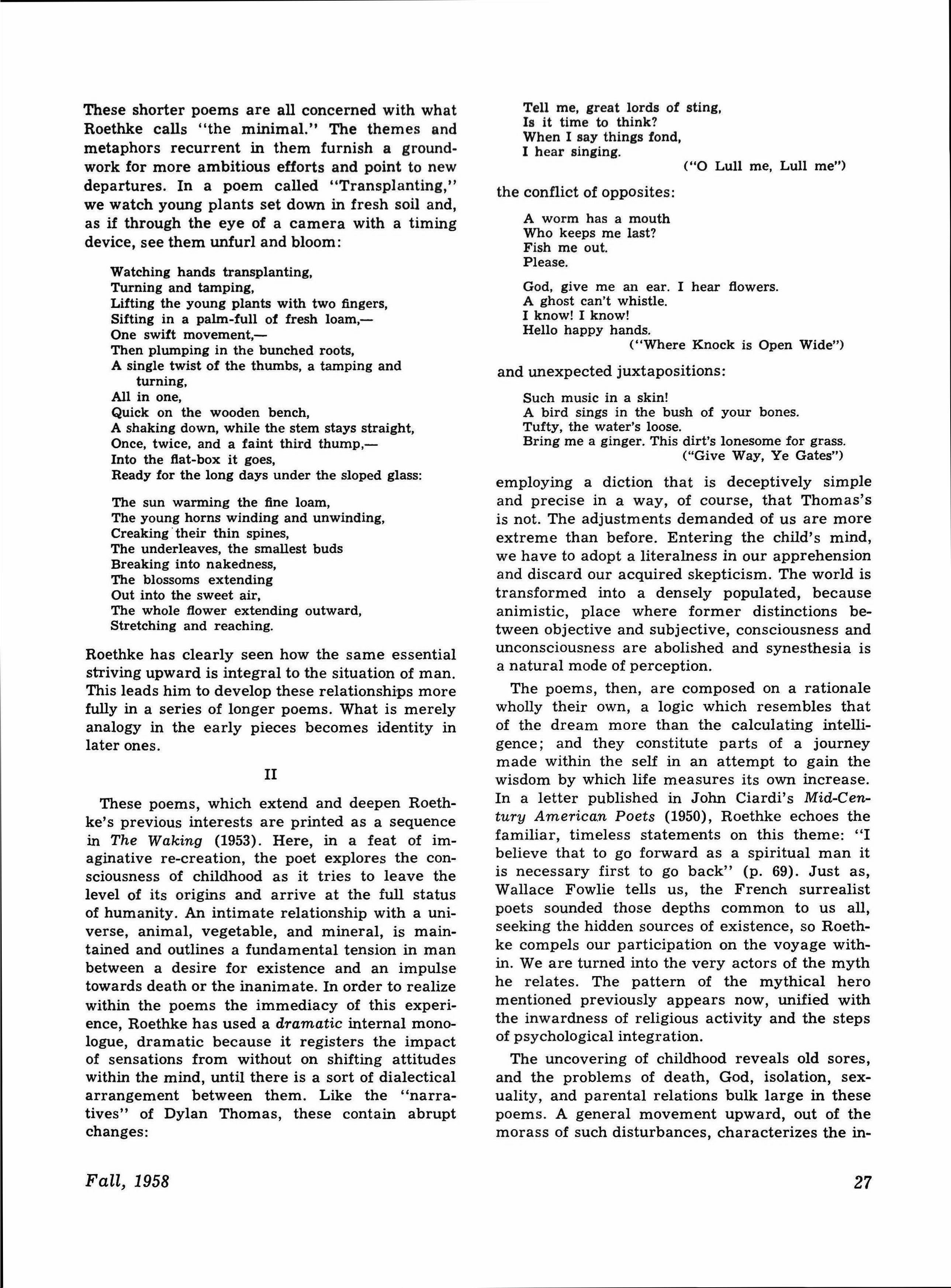
Tell me, great lords of sting, Is it time to think?
When I say things fond. I hear singing. ("0 Lull me, Lull me")
the conflict of opposites:
A worm has a mouth Who keeps me last?
Fish me out.
Please.
God, give me an ear. I hear flowers. A ghost can't whistle.
I know! I know! Hello happy hands. ("Where Knock is Open Wide")
and unexpected juxtapositions:
Such music in a skin!
A bird sings in the bush of your bones.
Tufty, the water's loose.
Bring me a ginger. This dirt's lonesome for grass. ("Give Way, Ye Gates")
employing a diction that is deceptively simple and precise in a way. of course, that Thomas's is not. The adjustments demanded of us are more extreme than before. Entering the child's mind, we have to adopt a literalness in our apprehension and discard our acquired skepticism. The world is transformed into a densely populated, because animistic, place where former distinctions between objective and subjective, consciousness and unconsciousness are abolished and synesthesia is a natural mode of perception.
The poems, then, are composed on a rationale wholly their own, a logic which resembles that of the dream more than the calculating intelligence; and they constitute parts of a journey made within the self in an attempt to gain the wisdom by which life measures its own increase. In a letter published in John Ciardi's Mid-Century American Poets (1950), Roethke echoes the familiar, timeless statements on this theme: "I believe that to go forward as a spiritual man it is necessary first to go back" (p. 69). Just as, Wallace Fowlie tells us, the French surrealist poets sounded those depths common to us all, seeking the hidden sources of existence, so Roethke compels our participation on the voyage within. We are turned into the very actors of the myth he relates. The pattern of the mythical hero mentioned previously appears now, unified with the inwardness of religious activity and the steps of psychological integration.
The uncovering of childhood reveals old sores, and the problems of death, God, isolation, sexuality, and parental relations bulk large in these poems. A general movement upward, out of the morass of such disturbances, characterizes the in-
27
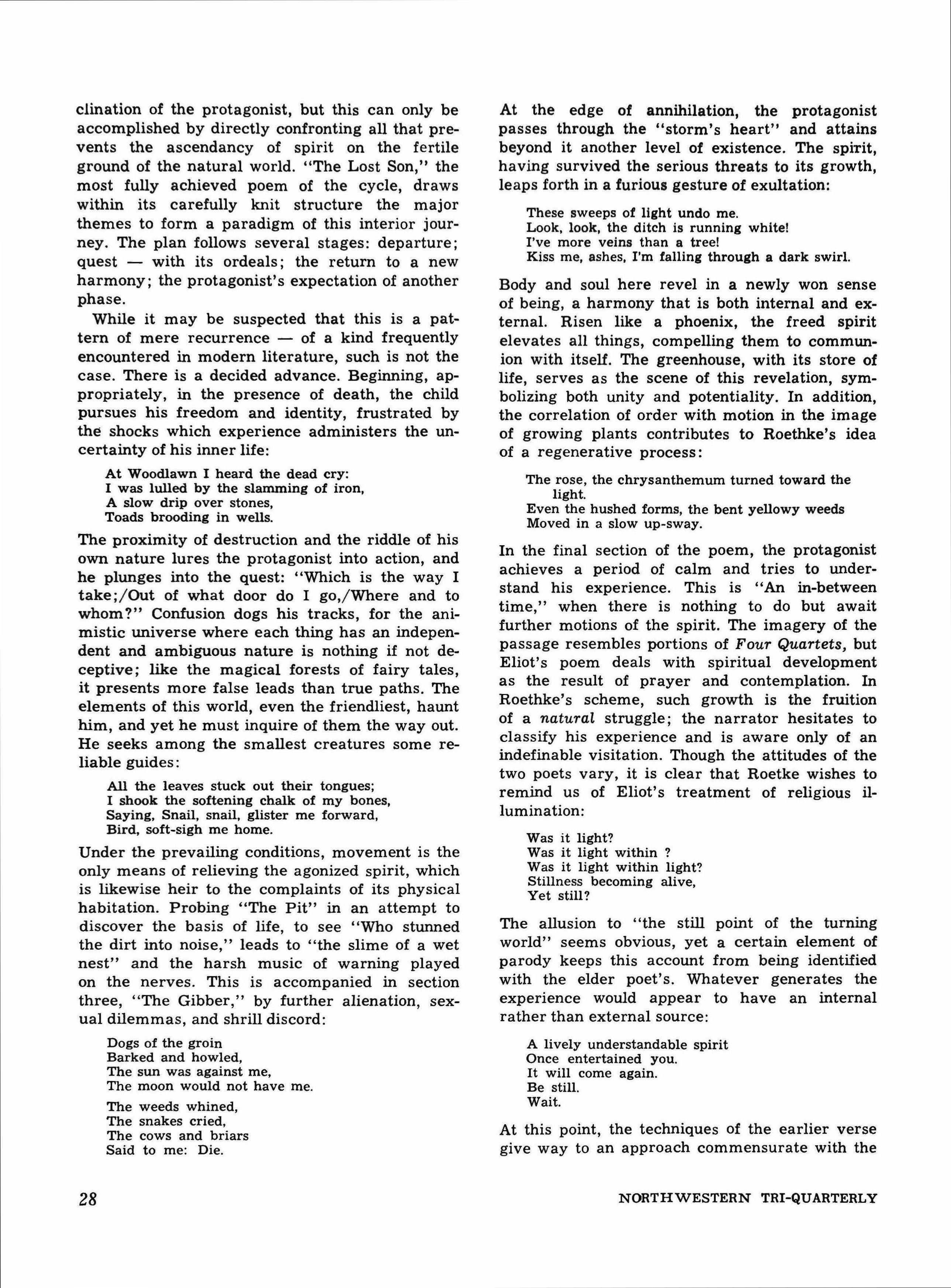
clination of the protagonist, but this can only be accomplished by directly confronting all that prevents the ascendancy of spirit on the fertile ground of the natural world. "The Lost Son," the most fully achieved poem of the cycle, draws within its carefully knit structure the major themes to form a paradigm of this interior journey. The plan follows several stages: departure; quest - with its ordeals; the return to a new harmony; the protagonist's expectation of another phase.
While it may be suspected that this is a pattern of mere recurrence - of a kind frequently encountered in modern literature, such is not the case. There is a decided advance. Beginning, appropriately, in the presence of death, the child pursues his freedom and identity, frustrated by the shocks which experience administers the uncertainty of his inner life:
At Woodlawn I heard the dead cry: I was lulled by the slamming of iron, A slow drip over stones, Toads brooding in wells.
The proximity of destruction and the riddle of his own nature lures the protagonist into action, and he plunges into the quest: "Which is the way I take;/Out of what door do I go,/Where and to whom?" Confusion dogs his tracks, for the animistic universe where each thing has an independent and ambiguous nature is nothing if not deceptive; like the magical forests of fairy tales, it presents more false leads than true paths. The elements of this world, even the friendliest, haunt him, and yet he must inquire of them the way out. He seeks among the smallest creatures some reliable guides:
All the leaves stuck out their tongues; I shook the softening chalk of my bones, Saying, Snail, snail, glister me forward, Bird, soft-sigh me home.
Under the prevailing conditions, movement is the only means of relieving the agonized spirit, which is likewise heir to the complaints of its physical habitation. Probing "The Pit" in an attempt to discover the basis of life, to see "Who stunned the dirt into noise," leads to "the slime of a wet nest" and the harsh music of warning played on the nerves. This is accompanied in section three, "The Gibber," by further alienation, sexual dilemmas, and shrill discord:
Dogs of the groin
Barked and howled, The sun was against me, The moon would not have me.
The weeds whined, The snakes cried, The cows and briars Said to me: Die.
At the edge of annihilation, the protagonist passes through the "storm's heart" and attains beyond it another level of existence. The spirit, having survived the serious threats to its growth, leaps forth in a furious gesture of exultation:
These sweeps of light undo me.
Look, look, the ditch is running white!
I've more veins than a tree!
Kiss me, ashes, I'm falling through a dark swirl.
Body and soul here revel in a newly won sense of being, a harmony that is both internal and external. Risen like a phoenix, the freed spirit elevates all things, compelling them to communion with itself. The greenhouse, with its store of life, serves as the scene of this revelation, symbolizing both unity and potentiality. In addition, the correlation of order with motion in the image of growing plants contributes to Roethke's idea of a regenerative process:
The rose, the chrysanthemum turned toward the light.
Even the hushed forms, the bent yellowy weeds
Moved in a slow up-sway.
In the final section of the poem, the protagonist achieves a period of calm and tries to understand his experience. This is "An in-between time," when there is nothing to do but await further motions of the spirit. The imagery of the passage resembles portions of Four Quartets, but Eliot's poem deals with spiritual development as the result of prayer and contemplation. In Roethke's scheme, such growth is the fruition of a natural struggle; the narrator hesitates to classify his experience and is aware only of an indefinable visitation. Though the attitudes of the two poets vary, it is clear that Roetke wishes to remind us of Eliot's treatment of religious illumination:
Was it light?
Was it light within
Was it light within light?
Stillness becoming alive, Yet still?
The allusion to "the still point of the turning world" seems obvious, yet a certain element of parody keeps this account from being identified with the elder poet's. Whatever generates the experience would appear to have an internal rather than external source:
A lively understandable spirit
Once entertained you. It will come again. Be still.
Wait.
At this point, the techniques of the earlier verse give way to an approach commensurate with the
28
NORTHWESTERN TRI-QUARTERLY
increasingly meditative nature of Roethke's practice. Themes of childhood are replaced by mature considerations of love and death.
III
Turning from fragmentary and shifting constructions that pursue the mind's elliptical patterns, Roethke has given weight recently to more formal limitations, though these have greater flexibility than the ones employed in Open House. What remain constant are his sparse diction and unerring sense of rhythm. Like other poets writing now, he has fallen under the influence of Yeats. The force of such a presence carries hazards as well as the possibility of beneficial teaching, but Roethke has assimilated his lessons and proceeded in his own direction.
The fulfillment of the spirit in love is the subject of a group of lyrics, "Four for Sir John Davies," which extends the theme of integration from the internal, psychological process of "The Lost Son" to union with another. Drawing its basic metaphor of dancing from Davies' sixteenth century poem, Orchestra, which suggests the orderly arrangements of the universe, and from Yeats, who saw in the dance an image of sexual and spiritual harmony, the poem moves from the poet's isolated dancing to a transcendent completion in which lover and beloved share. In the opening part, the poet asks if man fails to believe any longer in the vital energies of the creation, while he counteracts any such tendency himself by a joyous participation in their rhythms:
Is that dance slowing in the mind of man
That made him think the universe could hum?
The great wheel turns its axle when it can; I need a place to sing and dancing-room, And I have made a promise to my ears
I'll sing and whistle romping with the bears.
Concentrating upon man alone through the isolated figure of the poet, the action of the dance is seen as an image and celebration of the energy that links the entire universe. Despite his kinship with things, man seeks - with the very impulse of life - love. Though the relation with his partner begins between "Animal and human heat," he finds that the union of the flesh creates a spiritual correspondence:
Incomprehensible gaiety and dread
Attended what we did. Behind, before, Lay all the lonely pastures of the dead; The spirit and the flesh cried out for more.
Fall, 1958
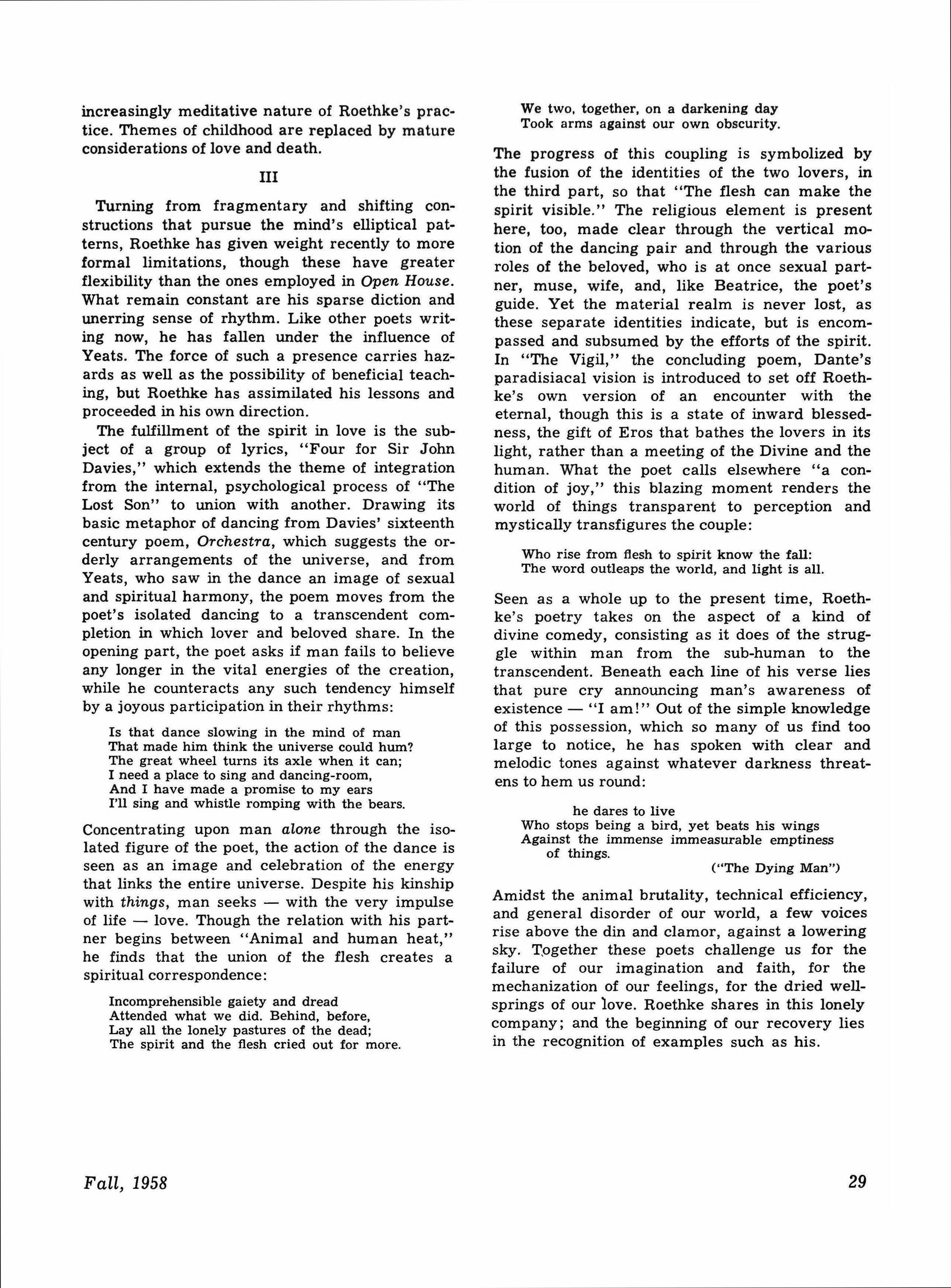
We two, together, on a darkening day Took arms against our own obscurity.
The progress of this coupling is symbolized by the fusion of the identities of the two lovers, in the third part, so that "The flesh can make the spirit visible." The religious element is present here, too, made clear through the vertical motion of the dancing pair and through the various roles of the beloved, who is at once sexual partner, muse, wife, and, like Beatrice, the poet's guide. Yet the material realm is never lost, as these separate identities indicate, but is encompassed and subsumed by the efforts of the spirit. In "The Vigil," the concluding poem, Dante's paradisiacal vision is introduced to set off Roethke's own version of an encounter with the eternal, though this is a state of inward blessedness, the gift of Eros that bathes the lovers in its light, rather than a meeting of the Divine and the human. What the poet calls elsewhere "a condition of joy," this blazing moment renders the world of things transparent to perception and mystically transfigures the couple:
Who rise from flesh to spirit know the fall: The word outleaps the world, and light is all.
Seen as a whole up to the present time, Roethke's poetry takes on the aspect of a kind of divine comedy, consisting as it does of the struggle within man from the sub-human to the transcendent. Beneath each line of his verse lies that pure cry announcing man's awareness of existence - "I am!" Out of the simple knowledge of this possession, which so many of us find too large to notice, he has spoken with clear and melodic tones against whatever darkness threatens to hem us round:
he dares to live Who stops being a bird, yet beats his wings Against the immense immeasurable emptiness of things.
("The Dying Man")
Amidst the animal brutality, technical efficiency, and general disorder of our world, a few voices rise above the din and clamor, against a lowering sky. Together these poets challenge us for the failure of our imagination and faith, for the mechanization of our feelings, for the dried wellsprings of our love. Roethke shares in this lonely company; and the beginning of our recovery lies in the recognition of examples such as his.
29
Caroline P. Norris
The fact that Caroline Wild always brought her knitting to class - the little bobbins clicking and clashing continuously, the smooth wool sliding through her fingers - aroused speculation and even some apprehension in the classroom when an early and no less frightening version of this story was read aloud. She is now Mrs. Rudy R. Norris, and lives in Cambridge, Massachusetts, where her husband is studying at the Harvard Business School. She was educated at the University of Wisconsin, the Sorbonne, Northwestern University, and New York University.
SISTER, SISTER
IALWAYS THINK of Eileen as knitting. I can see her now, crosslegged on the chair with the smooth wool sliding through her fingers, bobbins clicking, her pale serious face bent over her work so that you could see the shadows of her eyelashes, long ones, against her cheeks. God, she was strange! This was her whole life, this yarn, this constant clicking and clashing of little bobbins, and the patterned reams of woolly goods which fell from her needles. My boyfriend called her Penelope. It was all right for him to be amused, but as a roommate she was the world's most peculiar. Maybe it was because she was really pretty in an unusual, remote sort of way, and not actually stupid, that it irritated me to see her sit, night after night, in the chair in our room, knitting. Not so much stupid as just blank. At first I didn't think that she ever had a thought in her head except maybe about the pattern of her knitting or the shape of it. She never dated, never even went out for coffee, and she took her knittingbag, a little black sack, to all her classes. No, as a matter of fact I knew she wasn't dumb because I had a course with her, a course in Greek Mythology, and she got very good grades in that. The professor wouldn't let anyone knit or smoke in class and I used to watch Eileen as she sat there, tapping her leg softly with her fingers or drawing twiny little patterns in the margins of her book. It made her look tired and angry when she couldn't knit, or perhaps it was just so strange to see her face when it wasn't bent over her work and to notice that there were shadows beneath her dark eyes and a tense little line between her brows. It was odd

for such a prolific knitter that she could never look up from her work, but she always watched what she was doing very carefully, adjusting her bobbins and letting the wool spin out beneath her fingers. It was the same way when she doodled in the mythology class but she really was smart. She knew more about the histories of Greek gods than the professor did.
But as a roommate she sometimes made my spine creep. Not that she ever did anything to me; I don't think she ever thought anything about me one way or the other. Very neat and tidy and always sitting there on the chair, never on the bed but on the straight-backed chair, knitting. We never talked. When I was out she would take my phone calls and write the messages in her odd spidery writing. Her parents were very wealthy; I think her father was high up in state politics and I know that he was president of the Board of Trustees for the university and Eileen had beautiful clothes and a huge allowance, but her family never came to visit her and I'm not sure they wrote. If she was as uncanny around the house as she was in the dorm I'm not surprised they didn't want her around. I never knew what she did with all the socks and shawls and blankets she made either; maybe she sold them, but we never talked. When I'd finished studying on the nights I was in, I'd get ready for bed and take a shower and sometimes I'd hear the clicking and rattling of her bobbins after I'd crawled into bed and sometimes she'd already be in bed with the sheet pulled up around her face when I got back from the john.
I couldn't really hate Eileen with any sort of
30
NORTHWESTERN TRI-QUARTERLY
active dislike; she just made me uncomfortable. But there was one girl on the floor who really loathed her. This girl was president of the floor, very active in everything, and just out of spite she'd put Eileen in charge of all sorts of our little weekly committees to see that coke bottles were taken downstairs or that the ironing board was kept in the hall closet and things like that. All the stupid things that go on in dorms. Whenever Eileen found out that she'd been put in charge of another committee her face would get all white and tight and she wouldn't say anything but just bend over her work and knit about ten times faster than ever and the bobbins would clack together like teeth. And then this girl, her name was Judy, would get infuriated with Eileen and tell her she was the laziest, stupidest girl she'd ever seen and she didn't know how I stood having her in my room but if I couldn't get her off her can then she, Judy, certainly would. Judy really had a fantastic temper. She had beautiful red hair but she also had a crooked eye and I guess her temper was her psychological compensation for the eye. And usually Eileen wouldn't say anything to all this except a couple of times she told Judy to go to hell in such a cold, strange way that it really scared me, but Judy only got madder and said the same thing back to Eileen and then I left every time because the whole scene gave me the willies. Only no matter what committee Eileen was put on the work always got done and the week she was in charge of coke bottles was the only week all year that there wasn't broken glass in the john from someone hitting the wastebasket with the door.
There was one really awful time, though, and it was then that I honestly began to feel that I couldn't stand it any more. After all, nuts or no, you do get a sort of feeling for your roommate just because she's around all the time and your room is half hers and so, even though Eileen almost gave me the creeps, always sitting there without an expression on her face and the needles and the bobbins ticking away together through the wool, I still felt kind of responsible for her and always stuck up for her to the other kids. Then, just before Thanksgiving, Judy went and put Eileen in charge of dorm decorations for Homecoming. We all thought she was nuts to do it; after all, Eileen might be great on coke bottles but she was hardly the person you'd go and put in charge of decorations for a campus parade. But Judy insisted. She said that there was no one else in the dorm who could get things done like Eileen and that she'd suggested Eileen
Fall, 1958
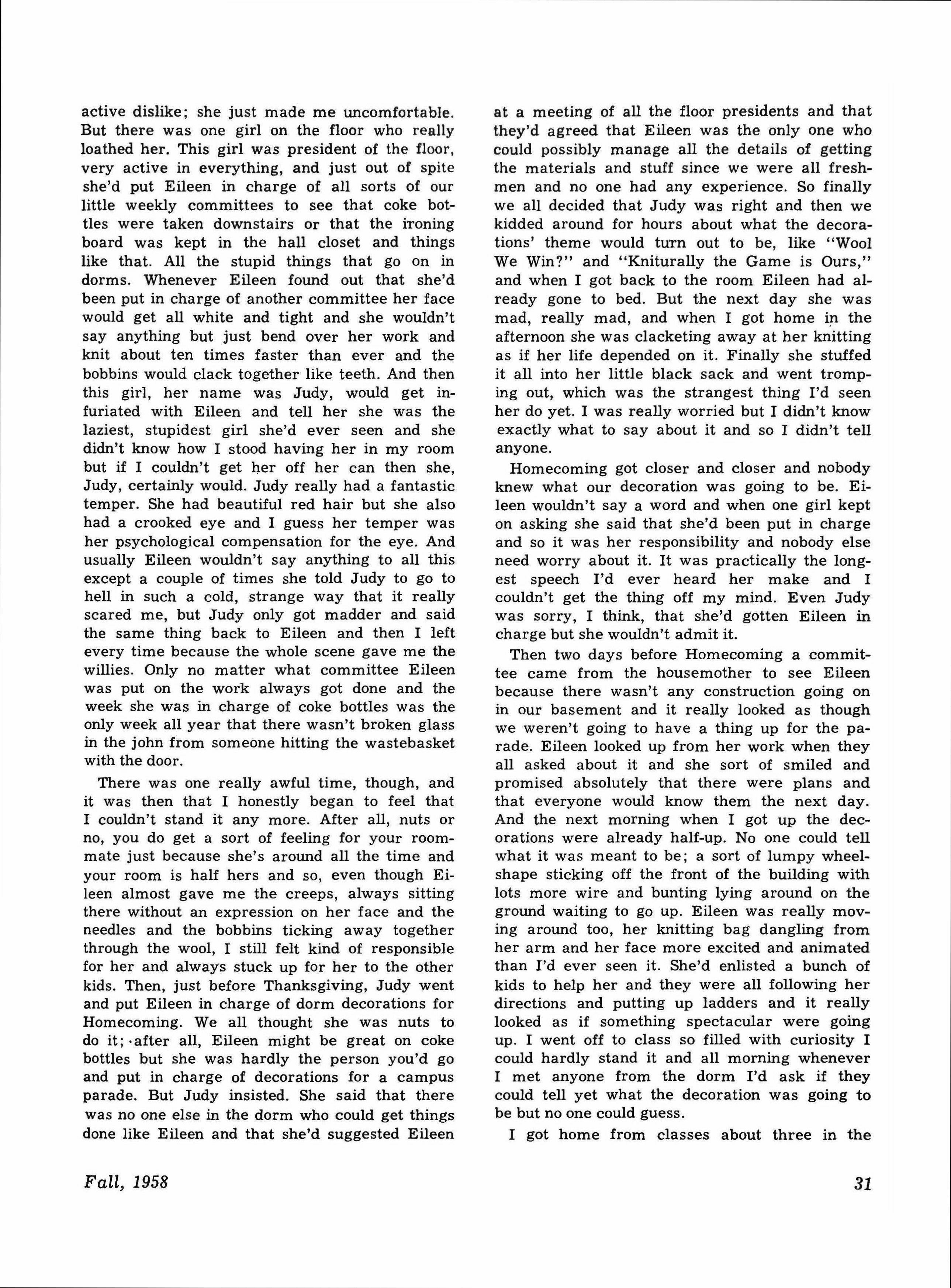
at a meeting of all the floor presidents and that they'd agreed that Eileen was the only one who could possibly manage all the details of getting the materials and stuff since we were all freshmen and no one had any experience. So finally we all decided that Judy was right and then we kidded around for hours about what the decorations' theme would turn out to be, like "Wool We Win?" and "Kniturally the Game is Ours," and when I got back to the room Eileen had already gone to bed. But the next day she was mad, really mad, and when I got home in the afternoon she was c1acketing away at her knitting as if her life depended on it. Finally she stuffed it all into her little black sack and went tromping out, which was the strangest thing I'd seen her do yet. I was really worried but I didn't know exactly what to say about it and so I didn't tell anyone.
Homecoming got closer and closer and nobody knew what our decoration was going to be. Eileen wouldn't say a word and when one girl kept on asking she said that she'd been put in charge and so it was her responsibility and nobody else need worry about it. It was practically the longest speech I'd ever heard her make and I couldn't get the thing off my mind. Even Judy was sorry, I think, that she'd gotten Eileen in charge but she wouldn't admit it.
Then two days before Homecoming a committee came from the housemother to see Eileen because there wasn't any construction going on in our basement and it really looked as though we weren't going to have a thing up for the parade. Eileen looked up from her work when they all asked about it and she sort of smiled and promised absolutely that there were plans and that everyone would know them the next day. And the next morning when I got up the decorations were already half-up. No one could tell what it was meant to be; a sort of lumpy wheelshape sticking off the front of the building with lots more wire and bunting lying around on the ground waiting to go up. Eileen was really moving around too, her knitting bag dangling from her arm and her face more excited and animated than I'd ever seen it. She'd enlisted a bunch of kids to help her and they were all following her directions and putting up ladders and it really looked as if something spectacular were going up. I went off to class so filled with curiosity I could hardly stand it and all morning whenever I met anyone from the dorm I'd ask if they could tell yet what the decoration was going to be but no one could guess.
I got home from classes about three in the
31
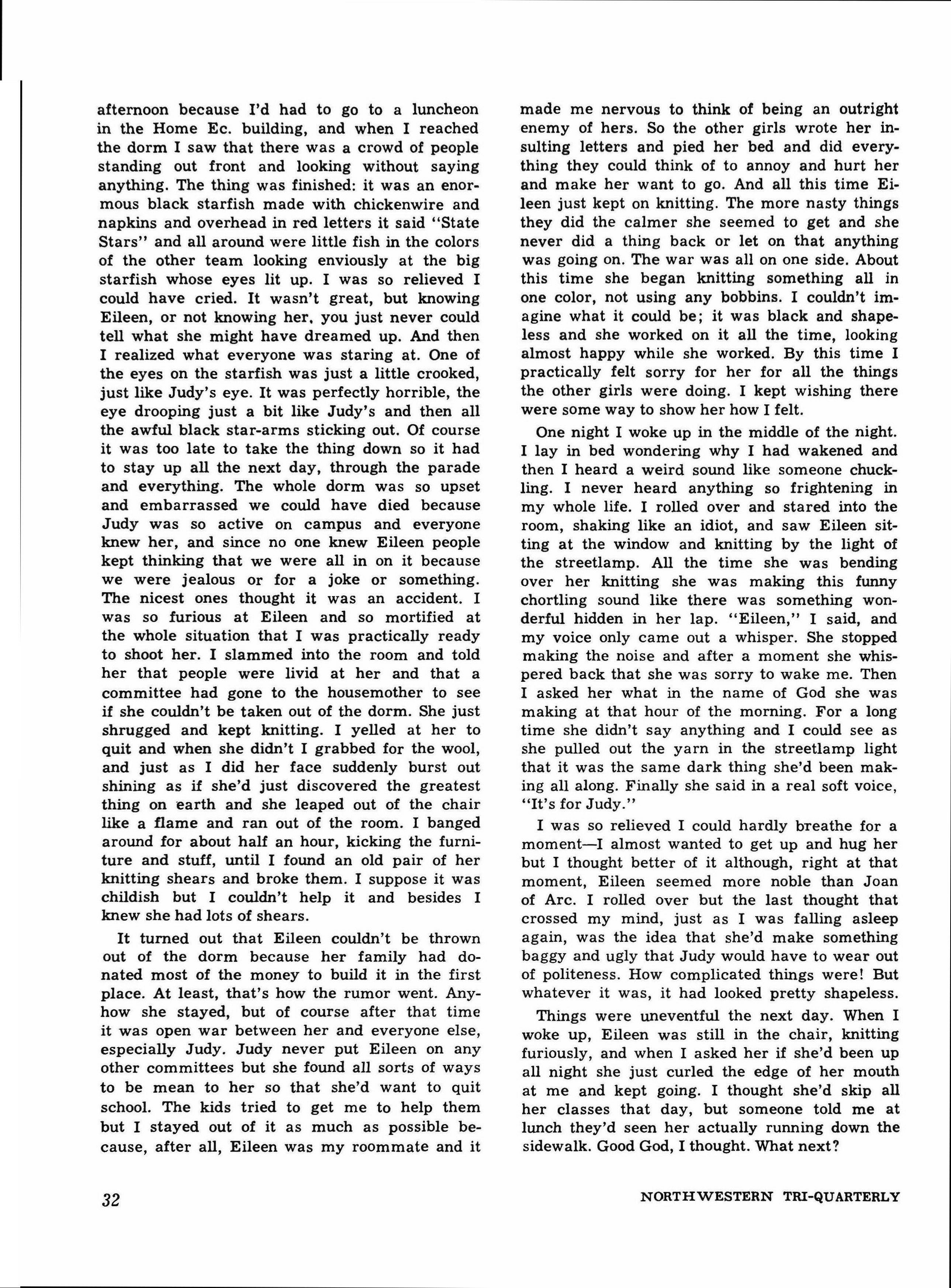
afternoon because I'd had to go to a luncheon in the Home Ec. building, and when I reached the dorm I saw that there was a crowd of people standing out front and looking without saying anything. The thing was finished: it was an enormous black starfish made with chickenwire and napkins and overhead in red letters it said "State Stars" and all around were little fish in the colors of the other team looking enviously at the big starfish whose eyes lit up. I was so relieved I could have cried. It wasn't great, but knowing Eileen, or not knowing her. you just never could tell what she might have dreamed up. And then I realized what everyone was staring at. One of the eyes on the starfish was just a little crooked, just like Judy's eye. It was perfectly horrible, the eye drooping just a bit like Judy's and then all the awful black star-arms sticking out. Of course it was too late to take the thing down so it had to stay up all the next day, through the parade and everything. The whole dorm was so upset and embarrassed we could have died because Judy was so active on campus and everyone knew her, and since no one knew Eileen people kept thinking that we were all in on it because we were jealous or for a joke or something. The nicest ones thought it was an accident. I was so furious at Eileen and so mortified at the whole situation that I was practically ready to shoot her. I slammed into the room and told her that people were livid at her and that a committee had gone to the housemother to see if she couldn't be taken out of the dorm. She just shrugged and kept knitting. I yelled at her to quit and when she didn't I grabbed for the wool, and just as I did her face suddenly burst out shining as if she'd just discovered the greatest thing on earth and she leaped out of the chair like a flame and ran out of the room. I banged around for about half an hour, kicking the furniture and stuff, until I found an old pair of her knitting shears and broke them. I suppose it was childish but I couldn't help it and besides I knew she had lots of shears.
It turned out that Eileen couldn't be thrown out of the dorm because her family had donated most of the money to build it in the first place. At least, that's how the rumor went. Anyhow she stayed, but of course after that time it was open war between her and everyone else, especially Judy. Judy never put Eileen on any other committees but she found all sorts of ways to be mean to her so that she'd want to quit school. The kids tried to get me to help them but I stayed out of it as much as possible because, after all, Eileen was my roommate and it
made me nervous to think of being an outright enemy of hers. So the other girls wrote her insulting letters and pied her bed and did everything they could think of to annoy and hurt her and make her want to go. And all this time Eileen just kept on knitting. The more nasty things they did the calmer she seemed to get and she never did a thing back or let on that anything was going on. The war was all on one side. About this time she began knitting something all in one color, not using any bobbins. I COUldn't imagine what it could be; it was black and shapeless and she worked on it all the time, looking almost happy while she worked. By this time I practically felt sorry for her for all the things the other girls were doing. I kept wishing there were some way to show her how I felt.
One night I woke up in the middle of the night. I lay in bed wondering why I had wakened and then I heard a weird sound like someone chuckling. I never heard anything so frightening in my whole life. I rolled over and stared into the room, shaking like an idiot, and saw Eileen sitting at the window and knitting by the light of the streetlamp. All the time she was bending over her knitting she was making this funny chortling sound like there was something wonderful hidden in her lap. "Eileen," I said, and my voice only came out a whisper. She stopped making the noise and after a moment she whispered back that she was sorry to wake me. Then I asked her what in the name of God she was making at that hour of the morning. For a long time she didn't say anything and I could see as she pulled out the yam in the streetlamp light that it was the same dark thing she'd been making all along. Finally she said in a real soft voice, "It's for Judy."
I was so relieved I could hardly breathe for a moment-I almost wanted to get up and hug her but I thought better of it although, right at that moment, Eileen seemed more noble than Joan of Arc. I rolled over but the last thought that crossed my mind, just as I was falling asleep again, was the idea that she'd make something baggy and ugly that Judy would have to wear out of politeness. How complicated things were! But whatever it was, it had looked pretty shapeless.
Things were uneventful the next day. When I woke up, Eileen was still in the chair, knitting furiously, and when I asked her if she'd been up all night she just curled the edge of her mouth at me and kept going. I thought she'd skip all her classes that day, but someone told me at lunch they'd seen her actually running down the sidewalk. Good God, I thought. What next?
32
NORTHWESTERN TRI-QUARTERLY
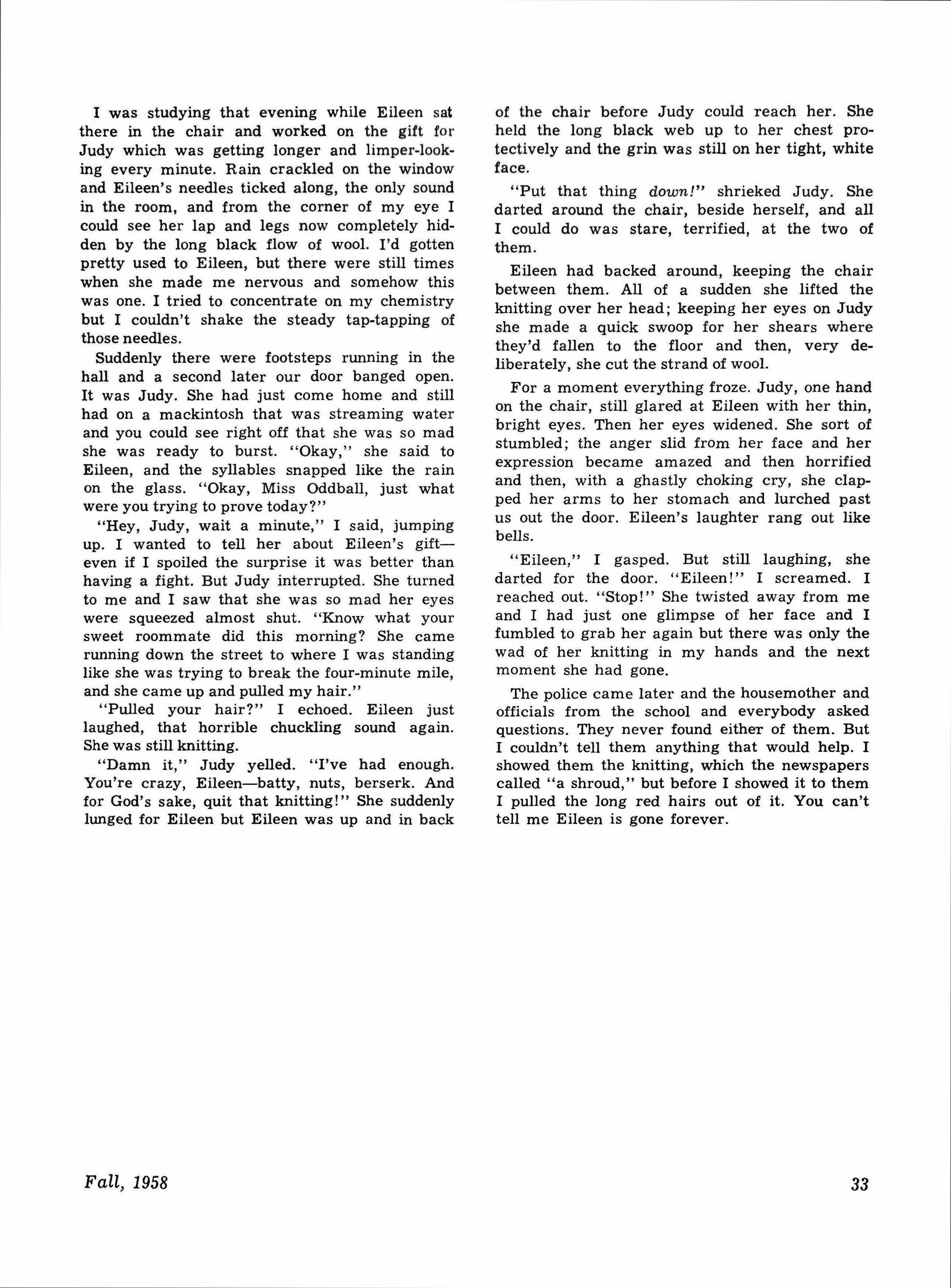
I was studying that evening while Eileen sat there in the chair and worked on the gift for Judy which was getting longer and limper-looking every minute. Rain crackled on the window and Eileen's needles ticked along, the only sound in the room, and from the corner of my eye I could see her lap and legs now completely hidden by the long black flow of wool. I'd gotten pretty used to Eileen, but there were still times when she made me nervous and somehow this was one. I tried to concentrate on my chemistry but I couldn't shake the steady tap-tapping of those needles.
Suddenly there were footsteps running in the hall and a second later our door banged open. It was Judy. She had just come home and still had on a mackintosh that was streaming water and you could see right off that she was so mad she was ready to burst. "Okay," she said to Eileen, and the syllables snapped like the rain on the glass. "Okay, Miss Oddball, just what were you trying to prove today?"
"Hey, Judy, wait a minute," I said, jumping up. I wanted to tell her about Eileen's gifteven if I spoiled the surprise it was better than having a fight. But Judy interrupted. She turned to me and I saw that she was so mad her eyes were squeezed almost shut. "Know what your sweet roommate did this morning? She came running down the street to where I was standing like she was trying to break the four-minute mile, and she came up and pulled my hair."
"Pulled your hair?" I echoed. Eileen just laughed, that horrible chuckling sound again. She was still knitting.
"Damn it," Judy yelled. "I've had enough. You're crazy, Eileen-batty, nuts, berserk. And for God's sake, quit that knitting!" She suddenly lunged for Eileen but Eileen was up and in back Fall, 1958
of the chair before Judy could reach her. She held the long black web up to her chest protectively and the grin was still on her tight, white face.
"Put that thing down!" shrieked Judy. She darted around the chair, beside herself, and all I could do was stare, terrified, at the two of them.
Eileen had backed around, keeping the chair between them. All of a sudden she lifted the knitting over her head; keeping her eyes on Judy she made a quick swoop for her shears where they'd fallen to the floor and then, very deliberately, she cut the strand of wool.
For a moment everything froze. Judy, one hand on the chair, still glared at Eileen with her thin, bright eyes. Then her eyes widened. She sort of stumbled; the anger slid from her face and her expression became amazed and then horrified and then, with a ghastly choking cry, she clapped her arms to her stomach and lurched past us out the door. Eileen's laughter rang out like bells.
"Eileen," I gasped. But still laughing, she darted for the door. "Eileen! I screamed. I reached out. "Stop!" She twisted away from me and I had just one glimpse of her face and I fumbled to grab her again but there was only the wad of her knitting in my hands and the next moment she had gone.
The police came later and the housemother and officials from the school and everybody asked questions. They never found either of them. But I couldn't tell them anything that would help. I showed them the knitting, which the newspapers called "a shroud," but before I showed it to them I pulled the long red hairs out of it. You can't tell me Eileen is gone forever.
33
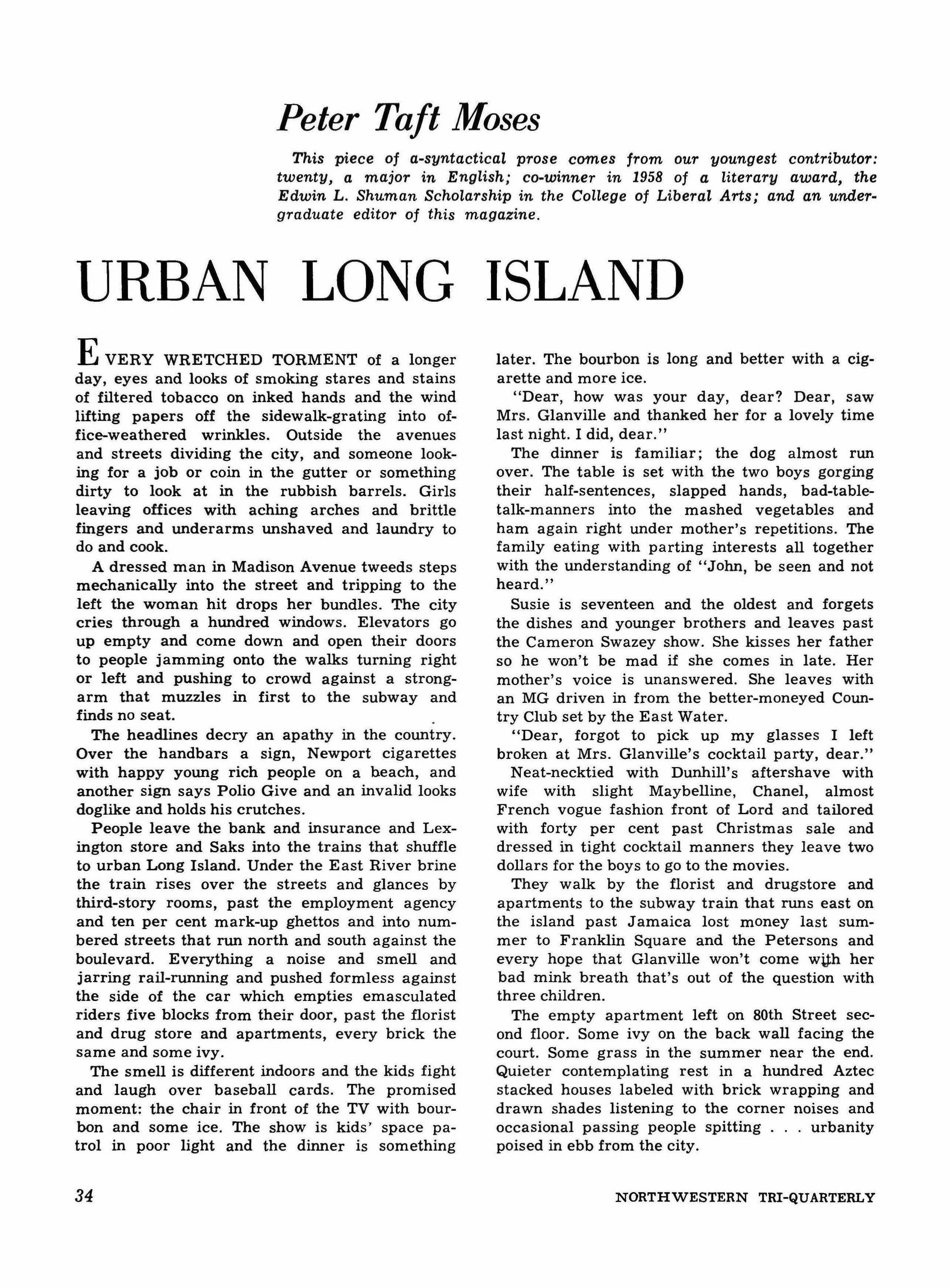
Peter Taft Moses
This piece of a-syntactical prose comes from our youngest contributor: twenty, a major in English; co-winner in 1958 of a literary award, the Edwin L. Shuman Scholarship in the ColLege of Liberal Arts; and an undergraduate editor of this magazine.
URBAN LONG ISLAND
EVERY WRETCHED TORMENT of a longer day, eyes and looks of smoking stares and stains of filtered tobacco on inked hands and the wind lifting papers off the sidewalk-grating into office-weathered wrinkles. Outside the avenues and streets dividing the city, and someone looking for a job or coin in the gutter or something dirty to look at in the rubbish barrels. Girls leaving offices with aching arches and brittle fingers and underarms unshaved and laundry to do and cook.
A dressed man in Madison Avenue tweeds steps mechanically into the street and tripping to the left the woman hit drops her bundles. The city cries through a hundred windows. Elevators go up empty and come down and open their doors to people jamming onto the walks turning right or left and pushing to crowd against a strongarm that muzzles in first to the subway and finds no seat.
The headlines decry an apathy in the country. Over the handbars a sign, Newport cigarettes with happy young rich people on a beach, and another sign says Polio Give and an invalid looks doglike and holds his crutches.
People leave the bank and insurance and Lexington store and Saks into the trains that shuffle to urban Long Island. Under the East River brine the train rises over the streets and glances by third-story rooms, past the employment agency and ten per cent mark-up ghettos and into numbered streets that run north and south against the boulevard. Everything a noise and smell and jarring rail-running and pushed formless against the side of the car which empties emasculated riders five blocks from their door, past the florist and drug store and apartments, every brick the same and some ivy.
The smell is different indoors and the kids fight and laugh over baseball cards. The promised moment: the chair in front of the TV with bourbon and some ice. The show is kids' space patrol in poor light and the dinner is something
later. The bourbon is long and better with a cigarette and more ice.
"Dear, how was your day, dear? Dear, saw Mrs. Glanville and thanked her for a lovely time last night. I did, dear."
The dinner is familiar; the dog almost run over. The table is set with the two boys gorging their half-sentences, slapped hands, bad-tabletalk-manners into the mashed vegetables and ham again right under mother's repetitions. The family eating with parting interests all together with the understanding of "John, be seen and not heard."
Susie is seventeen and the oldest and forgets the dishes and younger brothers and leaves past the Cameron Swazey show. She kisses her father so he won't be mad if she comes in late. Her mother's voice is unanswered. She leaves with an MG driven in from the better-moneyed Country Club set by the East Water.
"Dear, forgot to pick up my glasses I left broken at Mrs. Glanville's cocktail party, dear."
Neat-necktied with Dunhill's aftershave with wife with slight Maybelline, Chanel, almost French vogue fashion front of Lord and tailored with forty per cent past Christmas sale and dressed in tight cocktail manners they leave two dollars for the boys to go to the movies.
They walk by the florist and drugstore and apartments to the subway train that runs east on the island past Jamaica lost money last summer to Franklin Square and the Petersons and every hope that Glanville won't come wij;h her bad mink breath that's out of the question with three children.
The empty apartment left on 80th Street second floor. Some ivy on the back wall facing the court. Some grass in the summer near the end. Quieter contemplating rest in a hundred Aztec stacked houses labeled with brick wrapping and drawn shades listening to the corner noises and occasional passing people spitting urbanity poised in ebb from the city.
34
NORTHWESTERN TRI-QUARTERLY
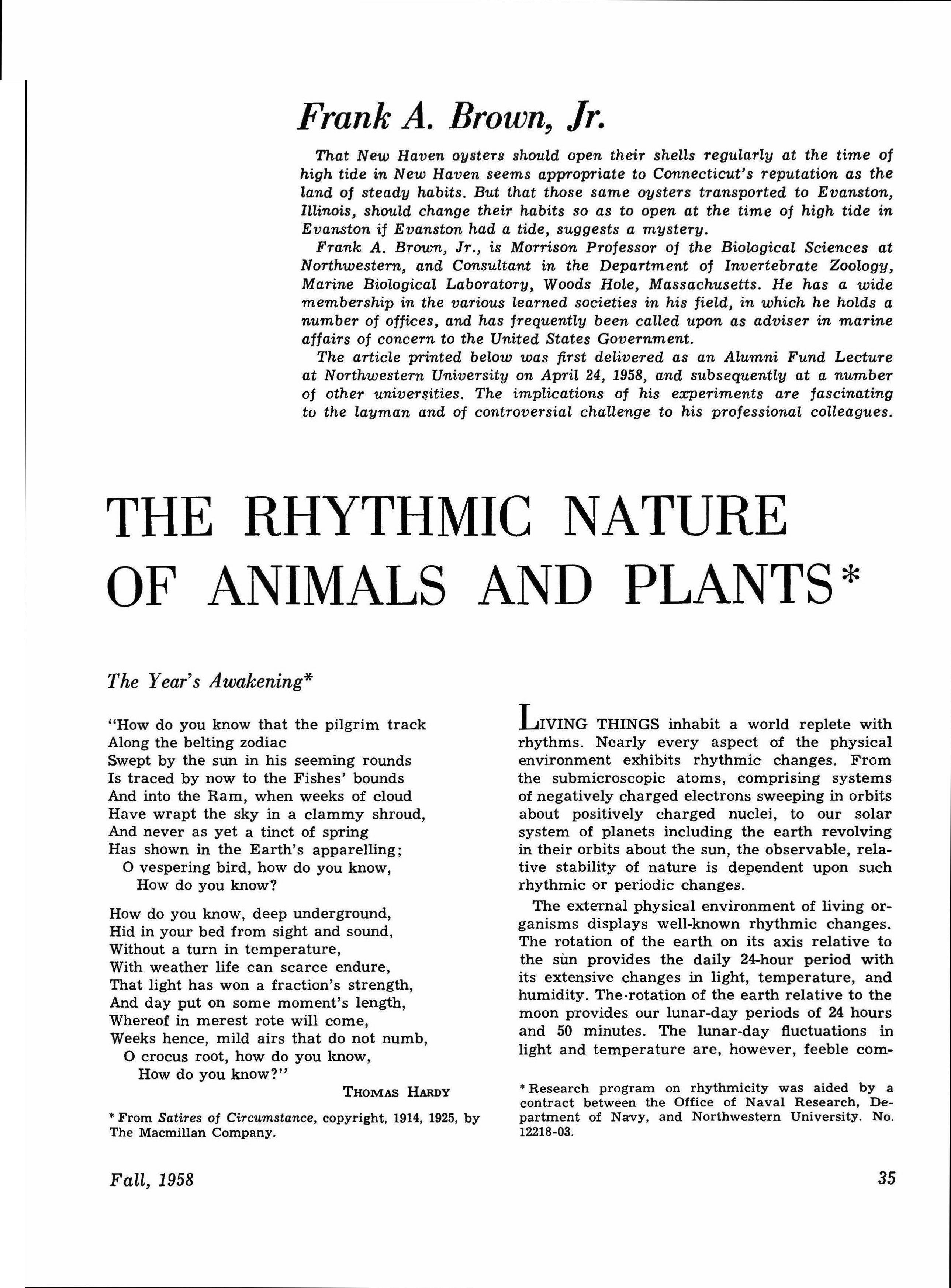
Frank A. Brown, Jr.
That New Haven oysters should open their shells regularly at the time of high tide in New Haven seems appropriate to Connecticut's reputation as the land of steady habits. But that those same oysters transported to Evanston, Illinois, should change their habits so as to open at the time of high tide in Evanston if Evanston had a tide, suggests a mystery.
Frank A. Brown, Jr., is Morrison Professor of the Biological Sciences at Northwestern, and Consultant in the Department of Invertebrate Zoology, Marine Biological Laboratory, Woods Hole, Massachusetts. He has a wide membership in the various learned societies in his field, in which he holds a number of offices, and has frequently been called upon as adviser in marine affairs of concern to the United States Government.
The article printed below was first delivered as an Alumni Fund Lecture at Northwestern University on April 24, 1958, and subsequently at a number of other universities, The implications of his experiments are fascinating to the layman and of controversial challenge to his professional colleagues.
THE RHYTHMIC NATURE OF ANIMALS AND PLANTS*
The Year's Awakening*
"How do you know that the pilgrim track Along the belting zodiac Swept by the sun in his seeming rounds Is traced by now to the Fishes' bounds And into the Ram, when weeks of cloud Have wrapt the sky in a clammy shroud, And never as yet a tinct of spring Has shown in the Earth's apparelling; o vespering bird, how do you know, How do you know?
How do you know, deep underground, Hid in your bed from sight and sound, Without a turn in temperature, With weather life can scarce endure, That light has won a fraction's strength, And day put on some moment's length, Whereof in merest rote will come, Weeks hence, mild airs that do not numb, o crocus root, how do you know, How do you know?"
THOMAS HARDy
From Satires oj Circumstance. copyright, 1914, 1925, by The Macmillan Company.
LIVING
THINGS inhabit a world replete with rhythms. Nearly every aspect of the physical environment exhibits rhythmic changes. From the SUbmicroscopic atoms, comprising systems of negatively charged electrons sweeping in orbits about positively charged nuclei, to our solar system of planets including the earth revolving in their orbits about the sun, the observable, relative stability of nature is dependent upon such rhythmic or periodic changes.
The external physical environment of living organisms displays well-known rhythmic changes. The rotation of the earth on its axis relative to the sun provides the daily 24-hour period with its extensive changes in light, temperature, and humidity. The-rotation of the earth relative to the moon provides our lunar-day periods of 24 hours and 50 minutes. The lunar-day fluctuations in light and temperature are, however, feeble com-
Research program on rhythmicity was aided by a contract between the Office of Naval Research. Department of Navy. and Northwestern University. No. 12218-03.
Fall,
35
1958
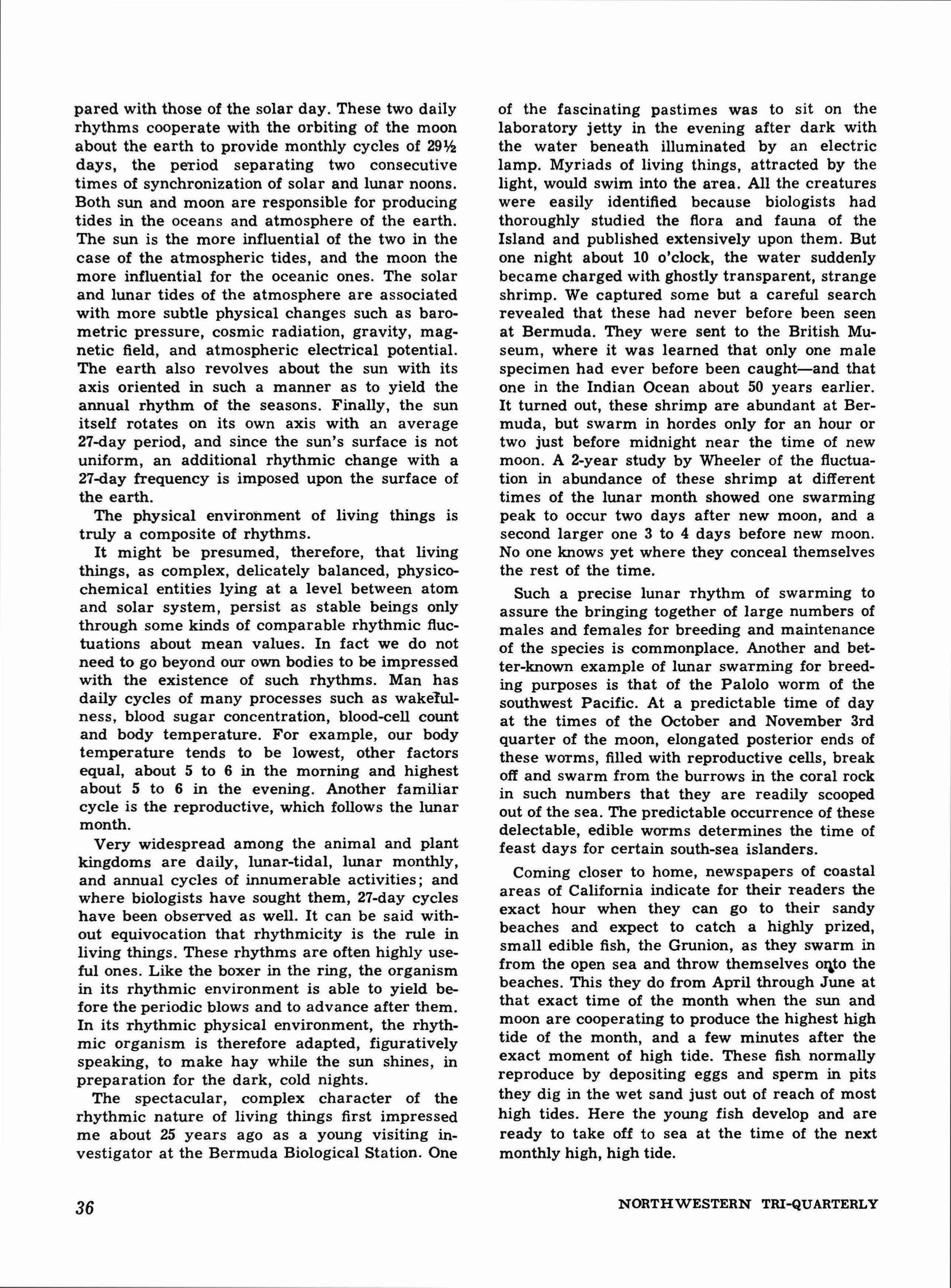
pared with those of the solar day. These two daily rhythms cooperate with the orbiting of the moon about the earth to provide monthly cycles of 29lh days, the period separating two consecutive times of synchronization of solar and lunar noons. Both sun and moon are responsible for producing tides in the oceans and atmosphere of the earth. The sun is the more influential of the two in the case of the atmospheric tides, and the moon the more influential for the oceanic ones. The solar and lunar tides of the atmosphere are associated with more subtle physical changes such as barometric pressure, cosmic radiation, gravity, magnetic field, and atmospheric electrical potential. The earth also revolves about the sun with its axis oriented in such a manner as to yield the annual rhythm of the seasons. Finally, the sun itself rotates on its own axis with an average 27-day period, and since the sun's surface is not uniform, an additional rhythmic change with a 27-day frequency is imposed upon the surface of the earth.
The physical environment of living things is truly a composite of rhythms. It might be presumed, therefore, that living things, as complex, delicately balanced, physicochemical entities lying at a level between atom and solar system, persist as stable beings only through some kinds of comparable rhythmic fluctuations about mean values. In fact we do not need to go beyond OUT own bodies to be impressed with the existence of such rhythms. Man has daily cycles of many processes such as wakelulness, blood sugar concentration, blood-cell count and body temperature. For example, our body temperature tends to be lowest, other factors equal, about 5 to 6 in the morning and highest about 5 to 6 in the evening. Another familiar cycle is the reproductive, which follows the lunar month.
Very widespread among the animal and plant kingdoms are daily, lunar-tidal, lunar monthly, and annual cycles of innumerable activities; and where biologists have sought them, 27-day cycles have been observed as well. It can be said without equivocation that rhythmicity is the rule in living things. These rhythms are often highly useful ones. Like the boxer in the ring, the organism in its rhythmic environment is able to yield before the periodic blows and to advance after them. In its rhythmic physical environment, the rhythmic organism is therefore adapted, figuratively speaking, to make hay while the sun shines, in preparation for the dark, cold nights.
The spectacular, complex character of the rhythmic nature of living things first impressed me about 25 years ago as a young visiting investigator at the Bermuda Biological Station. One
of the fascinating pastimes was to sit on the laboratory jetty in the evening after dark with the water beneath illuminated by an electric lamp. Myriads of living things, attracted by the light, would swim into the area. All the creatures were easily identifled because biologists had thoroughly studied the flora and fauna of the Island and published extensively upon them. But one night about 10 O'clock, the water suddenly became charged with ghostly transparent, strange shrimp. We captured some but a careful search revealed that these had never before been seen at Bermuda. They were sent to the British Museum, where it was learned that only one male specimen had ever before been caught-and that one in the Indian Ocean about 50 years earlier. It turned out, these shrimp are abundant at Bermuda, but swarm in hordes only for an hour or two just before midnight near the time of new moon. A 2-year study by Wheeler of the fluctuation in abundance of these shrimp at different times of the lunar month showed one swarming peak to occur two days after new moon, and a second larger one 3 to 4 days before new moon. No one knows yet where they conceal themselves the rest of the time.
Such a precise lunar rhythm of swarming to assure the bringing together of large numbers of males and females for breeding and maintenance of the species is commonplace. Another and better-known example of lunar swarming for breeding purposes is that of the Palolo worm of the southwest Pacific. At a predictable time of day at the times of the October and November 3rd quarter of the moon, elongated posterior ends of these worms, filled with reproductive cells, break off and swarm from the burrows in the coral rock in such numbers that they are readily scooped out of the sea. The predictable occurrence of these delectable, edible worms determines the time of feast days for certain south-sea islanders.
Coming closer to home, newspapers of coastal areas of California indicate for their readers the exact hour when they can go to their sandy beaches and expect to catch a highly prized, small edible fish, the Grunion, as they swarm in from the open sea and throw themselves o�to the beaches. This they do from April through June at that exact time of the month when the sun and moon are cooperating to produce the highest high tide of the month, and a few minutes after the exact moment of high tide. These fish normally reproduce by depositing eggs and sperm in pits they dig in the wet sand just out of reach of most high tides. Here the young fish develop and are ready to take off to sea at the time of the next monthly high, high tide.
36
NORTHWESTERN TRI-QUARTERLY
We don't have to select illustrations from animals alone, since even seaweeds are known which have lunar-monthly reproductive cycles. These are critical for the species; they synchronize the production of eggs, and the sperm which must fertilize them.
Examples of solar-day and annual rhythms of living things in nature are legion. Everyone of us can think of organisms that are habitually nocturnal, diurnal, or crespuscular in their daily time of activity, and axiomatic are our spring and fall waxing and waning of the activities of innumerable plants and animals. And along the shores of our oceans where the tides monotonously rise and fall with lunar-tidal frequency, 50 minutes later each day, are corresponding rhythms of activity of the organisms that live there: some, like oysters, which filter their food from the sea-water are active only when covered by water at flood tide; others, like the foraging fiddler crabs, scour the beaches for food exposed at ebb tide.
Animals, furthermore, do not have to dwell on the sea-shore to display a lunar-tidal rhythm. There is the often-quoted observation of the reefheron, which lives on the mainland of Australia up to 30 miles away from its feeding ground on the reef where it preys upon animals exposed at low tide. Each day this bird departs from its roost on its trip to the reefs just at the proper time to take advantage of the low tide,-50 minutes later each day. This phenomenal timing ability led one writer to remark, "Here is a sixth sense if ever there was one."
Another kind of example of a daily rhythm is seen in birds such as the starlings, which, in their north-south migrations in Europe, have been demonstrated to utilize the sun as a compass through holding their bodies at a fixed angle relative to it. But the sun during a daylong flight gradually moves across the sky from east to west. Kramer and Matthews both reported that the birds continuously corrected for the changing position of the sun in order to maintain a fixed, straight, compass course. Kramer spectacularly demonstrated this by placing birds in a domed enclosure possessing an artificia1 sun fixed in one position. Under these conditions, the direction of orientation of the birds relative to the artificial sun gradually changed during the day, exactly as one would have predicted on the basis of the rotation of the earth. Some beach-fleas which migrate up and down the beaches have similarly been proven by Pardi and Papi to use both sun and moon as their com-
Fall, 1958
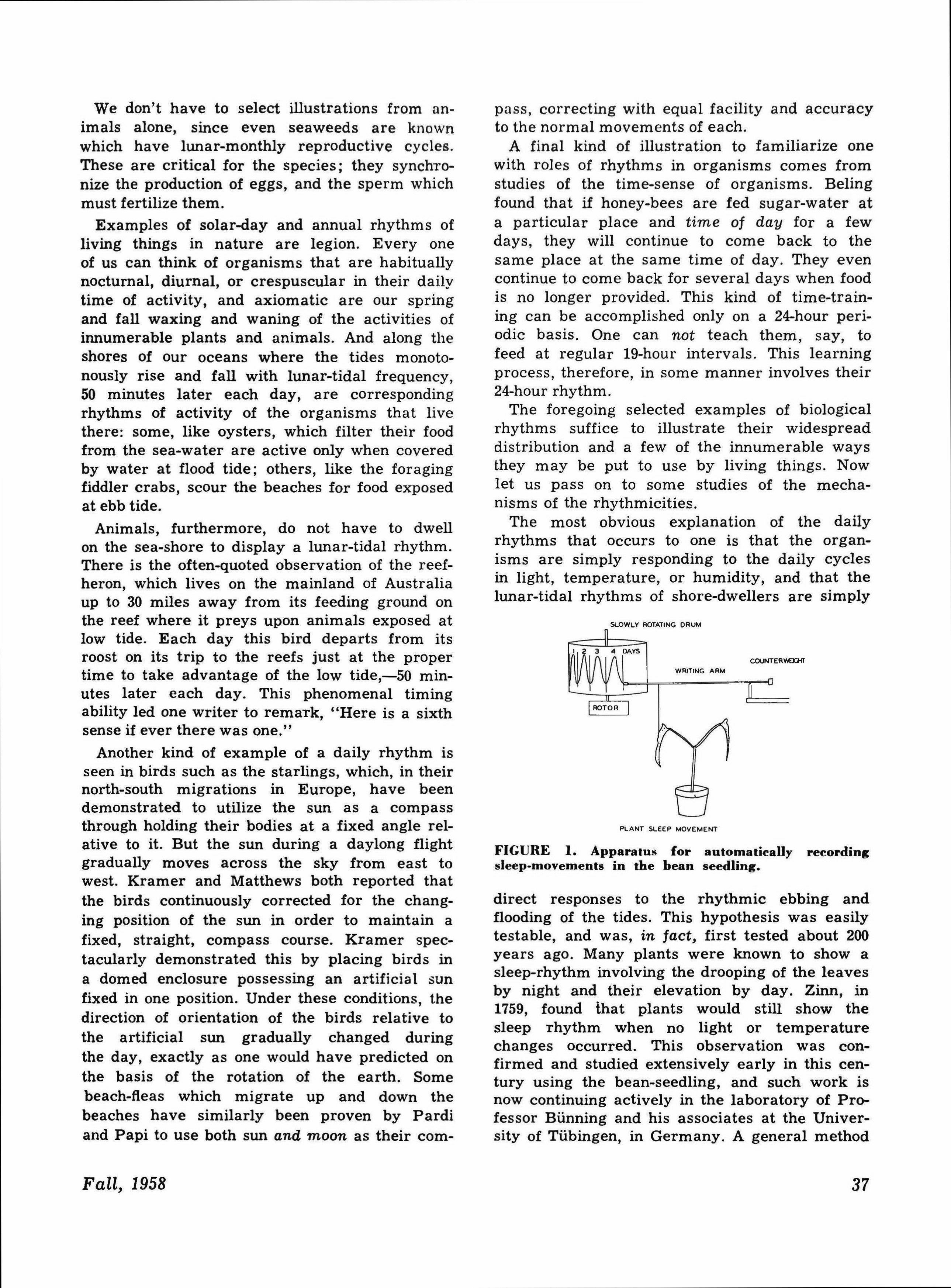
pass, correcting with equal facility and accuracy to the normal movements of each.
A final kind of illustration to familiarize one with roles of rhythms in organisms comes from studies of the time-sense of organisms. Beling found that if honey-bees are fed sugar-water at a particular place and time of day for a few days, they will continue to come back to the same place at the same time of day. They even continue to come back for several days when food is no longer provided. This kind of time-training can be accomplished only on a 24-hour periodic basis. One can not teach them, say, to feed at regular 19-hour intervals. This learning process, therefore, in some manner involves their 24-hour rhythm.
The foregoing selected examples of biological rhythms suffice to illustrate their widespread distribution and a few of the innumerable ways they may be put to use by living things. Now let us pass on to some studies of the mechanisms of the rhythmicities.
The most obvious explanation of the daily rhythms that occurs to one is that the organisms are simply responding to the daily cycles in light, temperature, or humidity, and that the lunar-tidal rhythms of shore-dwellers are simply
COUNTEA\MD1T
FIGURE l. Apparatus for automatically recording sleep-movements in the bean seedling.
direct responses to the rhythmic ebbing and flooding of the tides. This hypothesis was easily testable, and was, in fact, first tested about 200 years ago. Many plants were known to show a sleep-rhythm involving the drooping of the leaves by night and their elevation by day. Zinn, in 1759, found that plants would still show the sleep rhythm when no light or temperature changes occurred. This observation was confirmed and studied extensively early in this century using the bean-seedling, and such work is now continuing actively in the laboratory of Professor Bunning and his associates at the University of 'I'iibingen, in Germany. A general method
PLANT SLEEP MOVEMENT
37
of recording automatically the leaf movements on a slowly rotating drum is illustrated in figure 1.
The persistence of the daily rhythmic processes in living things in conditions constant with respect to all factors generally conceded to influence the organisms has now been demonstrated by numerous investigators for living things representing the gamut of the animal and plant kingdoms, and ranging from single-celled microorganisms to the most complex of multicellular larger ones.
Fiddler crabs in nature start to blacken their skin about sunrise in the morning to hide themselves better from their predators, and to screen their delicate internal organs from the intense sunlight of the unshaded beaches, and about sunset they rapidly blanch until their bodies are pale silvery gray. This is more evident for their legs than for their bodies, since the shell covering the legs is quite transparent. Even crabs captured and maintained in constant conditions in a photographic darkroom continue for weeks or months to darken and lighten each day in
CONTINUOUS DARKNESS
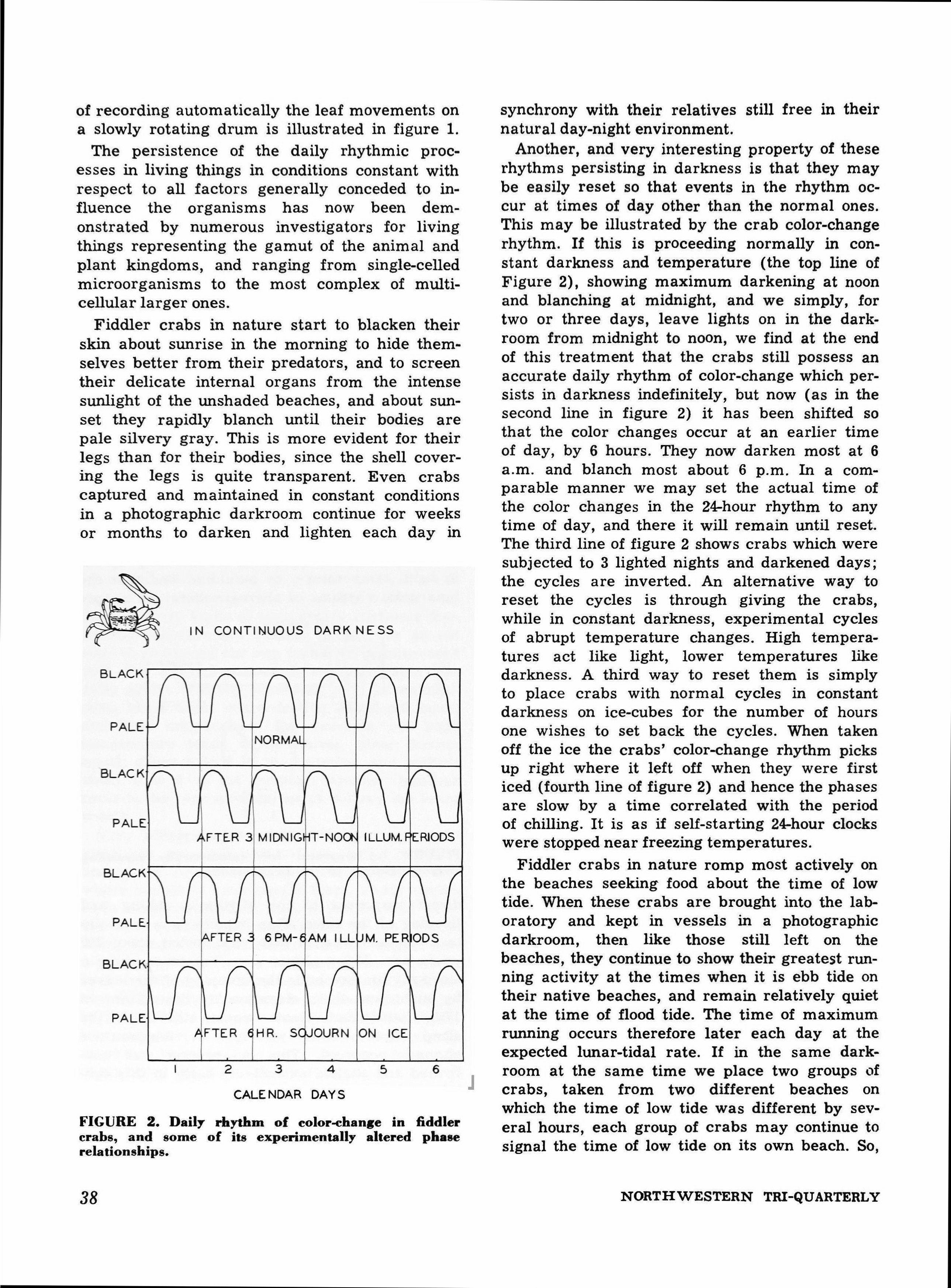
synchrony with their relatives still free in their natural day-night environment.
Another, and very interesting property of these rhythms persisting in darkness is that they may be easily reset so that events in the rhythm occur at times of day other than the normal ones. This may be illustrated by the crab color-change rhythm. If this is proceeding normally in constant darkness and temperature (the top line of Figure 2), showing maximum darkening at noon and blanching at midnight, and we simply, for two or three days, leave lights on in the darkroom from midnight to noon, we find at the end of this treatment that the crabs still possess an accurate daily rhythm of color-change which persists in darkness indefinitely, but now (as in the second line in figure 2) it has been shifted so that the color changes occur at an earlier time of day, by 6 hours. They now darken most at 6 a.m. and blanch most about 6 p.m. In a comparable manner we may set the actual time of the color changes in the 24-hour rhythm to any time of day, and there it will remain until reset. The third line of figure 2 shows crabs which were subjected to 3 lighted nights and darkened days; the cycles are inverted. An alternative way to reset the cycles is through giving the crabs, while in constant darkness, experimental cycles of abrupt temperature changes. High temperatures act like light, lower temperatures like darkness. A third way to reset them is simply to place crabs with normal cycles in constant darkness on ice-cubes for the number of hours one wishes to set back the cycles. When taken off the ice the crabs' color-change rhythm picks up right where it left off when they were first iced (fourth line of figure 2) and hence the phases are slow by a time correlated with the period of chilling. It is as if self-starting 24-hour clocks were stopped near freezing temperatures.
Fiddler crabs in nature romp most actively on the beaches seeking food about the time of low tide. When these crabs are brought into the laboratory and kept in vessels in a photographic darkroom, then like those still left on the beaches, they continue to show their greatest running activity at the times when it is ebb tide on their native beaches, and remain relatively quiet at the time of flood tide. The time of maximum running occurs therefore later each day at the expected lunar-tidal rate. If in the same darkroom at the same time we place two groups (If crabs, taken from two different beaches on which the time of low tide was different by several hours, each group of crabs may continue to signal the time of low tide on its own beach. So,
2 3 6 4 CALE NDAR DAYS
IN
38 J
FIGURE 2. Daily rhythm of color-change in fiddler crabs, and some of its experimentally altered phase relationships.
NORTHWESTERN TRI-QUARTERLY
simultaneously in the same crabs deprived of all ordinary cues relative to time of day or tide, there persists, on the one hand, a solar-day rhythm of color change and, on the other, a lunar-tidal cycle of spontaneous activity.
Studies comparable to these, using numerous other kinds of animals and plants, have demonstrated quite clearly that, like the daily, the lunar-tidal rhythms do not depend upon any known kind of external cues for the measurement of the lunar-period lengths.
The 24-hour rhythm seems very deeply ingrained in organisms. We showed a number of years ago that even if rhythms seemed completely halted, as in the instance of color change in crabs held in very bright light for 10 or 12 days, a regular rhythm would reappear at once when the crabs were replaced in darkness.
It has been satisfactorily demonstrated that an organism need never have experienced a single normal daily cycle in its life, and yet be capable of exhibiting a precise daily cycle. Hence the cycle can not be contemplated in any sense as a period of day-length remembered by the organism. It was shown long ago that beans grown in constant darkness show no rhythmic sleep movements, but a single brief light shock will start off a persisting 24-hour rhythm, the time of day of awakening-onset, a function of time of the light shock. Fruit flies normally, as they are about to complete their development, emerge from their pupal cases, as fully active flies, about daybreak. Dr. Brett, in my laboratory, showed, however, that if a batch of eggs are laid and development is caused to occur wholly in darkness, flies emerge at all hours of the day. But if during the development of the fly larvae in darkness, a single flash of light, as brief as one minute, is given them, then the flies will emerge from their pupal cases, up to days later, after completing their development and pupating, at the same time of day as the time the light flash was given. The light flash could not have imparted information as to the length of a 24hour period to render this possible. The flies behaved quite as if they all had operating 24-hour rhythms of emergence but had had nothing by which to set them to the usual time of day. The brief light flash seemed to be treated by all the developing flies as the onset of a dawn, and with this, all the rhythms were synchronized. Flies normally emerge at dawn.
A deep-seated daily rhythmicity of still unknown significance was discovered recently by Professor Bunning and his associates. This is a rhythm of swelling of the nucleus of cells of a
Fall, 1958
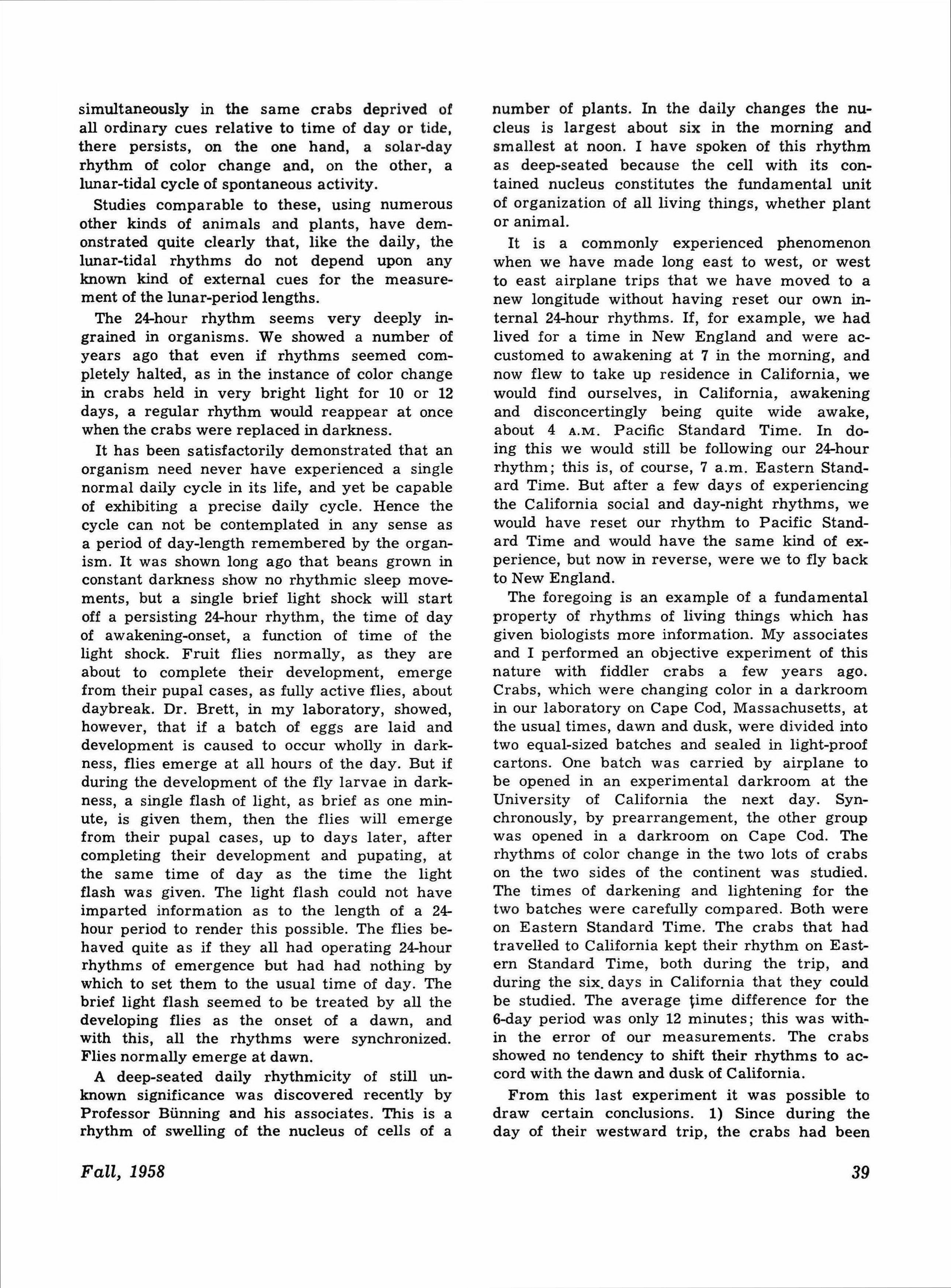
number of plants. In the daily changes the nucleus is largest about six in the morning and smallest at noon. I have spoken of this rhythm as deep-seated because the cell with its contained nucleus constitutes the fundamental unit of organization of all living things, whether plant or animal.
It is a commonly experienced phenomenon when we have made long east to west, or west to east airplane trips that we have moved to a new longitude without having reset our own internal 24-hour rhythms. If, for example, we had lived for a time in New England and were accustomed to awakening at 7 in the morning, and now flew to take up residence in California, we would find ourselves, in California, awakening and disconcertingly being quite wide awake, about 4 A.M. Pacific Standard Time. In doing this we would still be following our 24-hour rhythm; this is, of course, 7 a.m. Eastern Standard Time. But after a few days of experiencing the California social and day-night rhythms, we would have reset our rhythm to Pacific Standard Time and would have the same kind of experience, but now in reverse, were we to fly back to New England.
The foregoing is an example of a fundamental property of rhythms of living things which has given biologists more information. My associates and I performed an objective experiment of this nature with fiddler crabs a few years ago. Crabs, which were changing color in a darkroom in our laboratory on Cape Cod, Massachusetts, at the usual times, dawn and dusk, were divided into two equal-sized batches and sealed in light-proof cartons. One batch was carried by airplane to be opened in an experimental darkroom at the University of California the next day. Synchronously, by prearrangement, the other group was opened in a darkroom on Cape Cod. The rhythms of color change in the two lots of crabs on the two sides of the continent was studied. The times of darkening and lightening for the two batches were carefully compared. Both were on Eastern Standard Time. The crabs that had travelled to California kept their rhythm on Eastern Standard Time, both during the trip, and during the six. days in California that they could be studied. The average time difference for the 6-day period was only 12 minutes; this was within the error of our measurements. The crabs showed no tendency to shift their rhythms to accord with the dawn and dusk of California.
From this last experiment it was possible to draw certain conclusions. 1) Since during the day of their westward trip, the crabs had been
39
subjected to an artificial day of 27 hours and 20 minutes with respect to any and every "localtime" factor that possessed its 24-hour period as a consequence of the rotation of the earth relative to the sun, the crabs clearly could measure one 24-hour period without any kind of clue, even a subtle one, of this nature. 2) Once in California where rhythms of many physical environmental factors were once again 24hour ones, the crabs could retain an accurate 24-hour rhythm in a new time-relationship relative to the external ones. 3) To reset their rhythms to Pacific time, the crabs needed exposure to one or more natural California light cycles.
The year following this study on the crabs, a completely comparable experiment was performed by Renner, using the time sense of honeybees. Completely duplicate bee-training rooms were built and furnished in Paris and in New York. Bees were trained to come to a particular spot in the Paris room for food at a particular time of day. Once trained the bees were sealed in a container and flown to the room in New York. The bees, now in New York, came to the feeding spot at the proper time for Paris. They were retrained in New York and flown back to Paris. In Paris they came to feed at the proper time for New York. This confirmed completely our crab experiments.
These experiments, however, did not prove that a rhythm of some subtle external factor was not essential to the organismic 24-hour rhythm since there are certain important 24-hour rhythms in the environment that are on universal time. By universal time is meant that the rhythm affects all regions of the earth's surface in the same ways at the same instants. Such a factor is the daily fluctuation in the 300,OOO-volt potential difference which exists between the surface of the earth and one of the outer shells of our atmosphere, the ionosphere. By one of these universal-time cycles the 24-hour period could conceivably be imparted to the animals even while they are travelling. On the other hand, the living rhythmic system might be completely independent of all external cycles.
We have seen thus far that the daily rhythms of living things in constant darkness, like the clocks in our homes, can measure accurately 24-hour periods whether they are set at the normally correct time of day, or have been reset to register an incorrect time. As the mathematician or physicist would describe this, the rhythms in the living things need not have locked phase-relations with any external physical
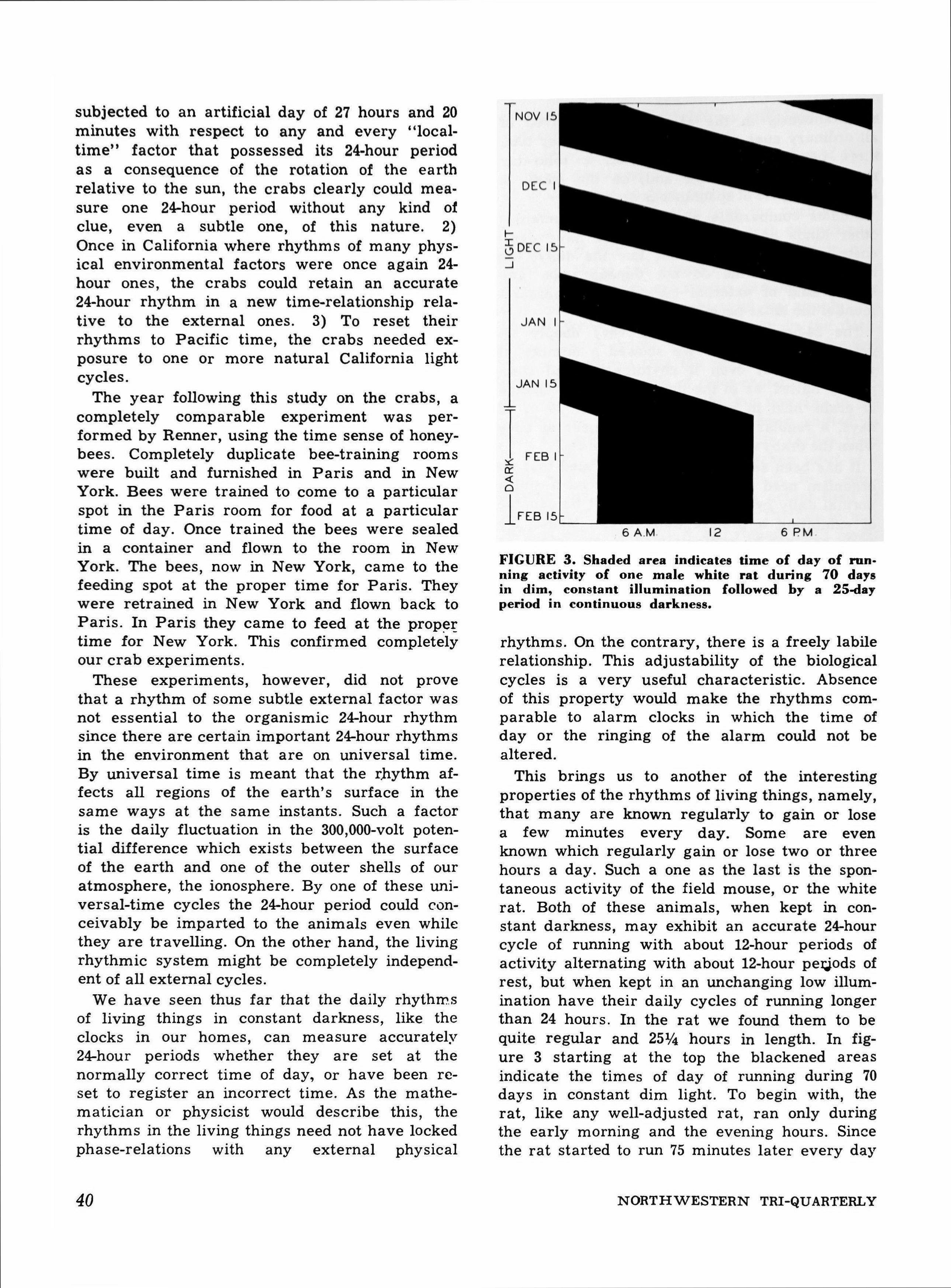
FIGURE 3. Shaded area indicates time of day of mn· ning activity of one male white rat during 70 days in dim, constant illumination followed by a 25-day period in continuous darkness.
rhythms. On the contrary, there is a freely labile relationship. This adjustability of the biological cycles is a very useful characteristic. Absence of this property would make the rhythms comparable to alarm clocks in which the time of day or the ringing of the alarm could not be altered.
This brings us to another of the interesting properties of the rhythms of living things, namely, that many are known regularly to gain or lose a few minutes every day. Some are even known which regularly gain or lose two or three hours a day. Such a one as the last is the spontaneous activity of the field mouse, or the white rat. Both of these animals, when kept in constant darkness, may exhibit an accurate 24-hour cycle of running with about 12-hour periods of activity alternating with about 12-hour peQods of rest, but when kept in an unchanging low illumination have their daily cycles of running longer than 24 hours. In the rat we found them to be quite regular and 25lf4 hours in length. In figure 3 starting at the top the blackened areas indicate the times of day of running during 70 days in constant dim light. To begin with, the rat, like any well-adjusted rat, ran only during the early morning and the evening hours. Since the rat started to run 75 minutes later every day
40 NOV 15 DEC Ii3 DEC 15 _j JAN JAN 15 I FEB a: <{ o IFEB 15 6 A.M 12 6 PM.
NORTHWESTERN TRI-QUARTERLY
the daily period of running was occurring in the daytime in less than 2 weeks. The period of running can be seen to scan the day more than three times during the 7O-day period from November 13 through January 20. When, at the end of this time, the rat was placed in darkness (the last 25 days in figure 3), the rhythm became an accurate 24-hour one, the rat running at the same time each day. In other words, the rat appeared able to indicate accurately the time of day by its running only when it was in continuous darkness.
In the bean seedling not only may the sleep rhythm often have natural periods a little different from 24 hours in constant darkness at ordinary room temperature, but the length of the periods seems to be inherited; some genetic strains have longer-period natural rhythms in these constant conditions than others. One strain whose rhythmicity has been studied very extensively possesses a 28-hour cycle.
The clocks of man are simply instruments with built-in cyclic changes corresponding to the length of the natural daily cycle, and by their appropriate divisions into hours, minutes, and seconds, enable us to know at any given instant, at just what point in the daily cycle we have arrived. The daily cycles of living things are often referred to as depending upon "biological clocks," since the daily rhythms of all living things imply the possession by the organism of a means of measuring accurately the period of the day.
By the same token, living things seem also to possess a basic timing mechanism indicating the lengths of lunar periods, or a "lunar-clock." And since a number of living things are known also in constant conditions to measure periods of annual length, they appear also to have "annual clocks." These last two kinds of "clocks" we treat in our annual calendars with their monthly divisions. Therefore, living things behave as if they possessed both "clocks" and "calendars" by means of which many vital processes are appropriately timed even in the absence of such wellknown daily, monthly, and annual changes as those of illumination and temperature.
The characteristics of the rhythmicity in living things of the kind that have just been described led many investigators of the phenomenon many years ago to the conclusion that living things possess within themselves clock mechanisms that would permit them, when isolated from all environmental changes which were conceded to be able to influence them, to measure off accurately periods closely corresponding to the lengths of the solar-day, and other natural periods. In other
Fall, 1958
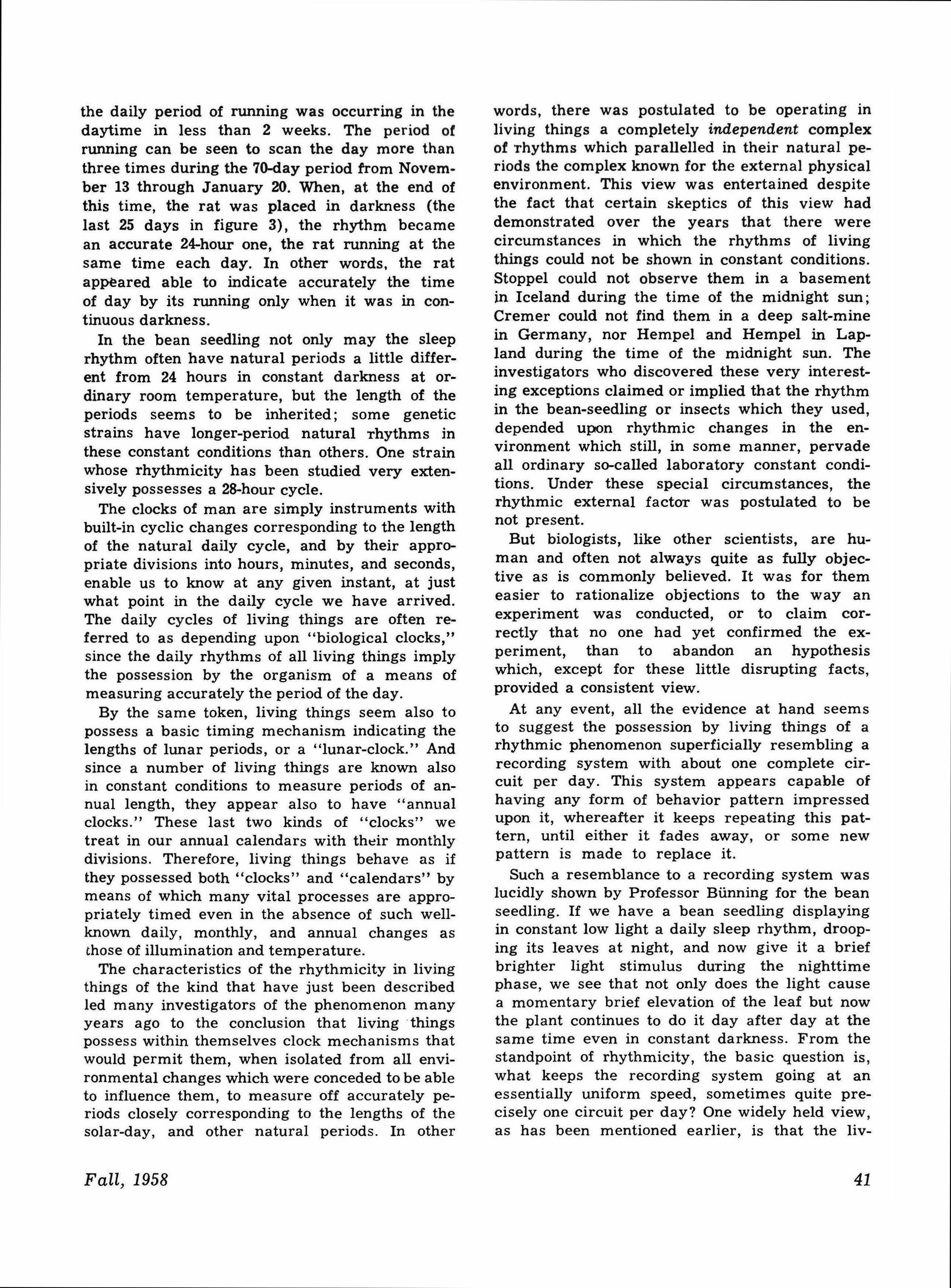
words, there was postulated to be operating in living things a completely independent complex of rhythms which parallelled in their natural periods the complex known for the external physical environment. This view was entertained despite the fact that certain skeptics of this view had demonstrated over the years that there were circumstances in which the rhythms of living things could not be shown in constant conditions. Stoppel could not observe them in a basement in Iceland during the time of the midnight sun; Cremer could not find them in a deep salt-mine in Germany, nor Hempel and Hempel in Lapland during the time of the midnight sun. The investigators who discovered these very interesting exceptions claimed or implied that the rhythm in the bean-seedling or insects which they used, depended upon rhythmic changes in the environment which still, in some manner, pervade all ordinary so-called laboratory constant conditions. Under these special circumstances, the rhythmic external factor was postulated to be not present.
But biologists, like other scientists, are human and often not always quite as fully objective as is commonly believed. It was for them easier to rationalize objections to the wayan experiment was conducted, or to claim correctly that no one had yet confirmed the experiment, than to abandon an hypothesis which, except for these little disrupting facts, provided a consistent view.
At any event, all the evidence at hand seems to suggest the possession by living things of a rhythmic phenomenon superficially resembling a recording system with about one complete circuit per day. This system appears capable of having any form of behavior pattern impressed upon it, whereafter it keeps repeating this pattern, until either it fades away, or some new pattern is made to replace it.
Such a resemblance to a recording system was lucidly shown by Professor Bunning for the bean seedling. If we have a bean seedling displaying in constant low light a daily sleep rhythm, drooping its leaves at night, and now give it a brief brighter light stimulus during the nighttime phase, we see that not only does the light cause a momentary brief elevation of the leaf but now the plant continues to do it day after day at the same time even in constant darkness. From the standpoint of rhythmicity, the basic question is, what keeps the recording system going at an essentially uniform speed, sometimes quite precisely one circuit per day? One widely held view, as has been mentioned earlier, is that the Iiv-
41
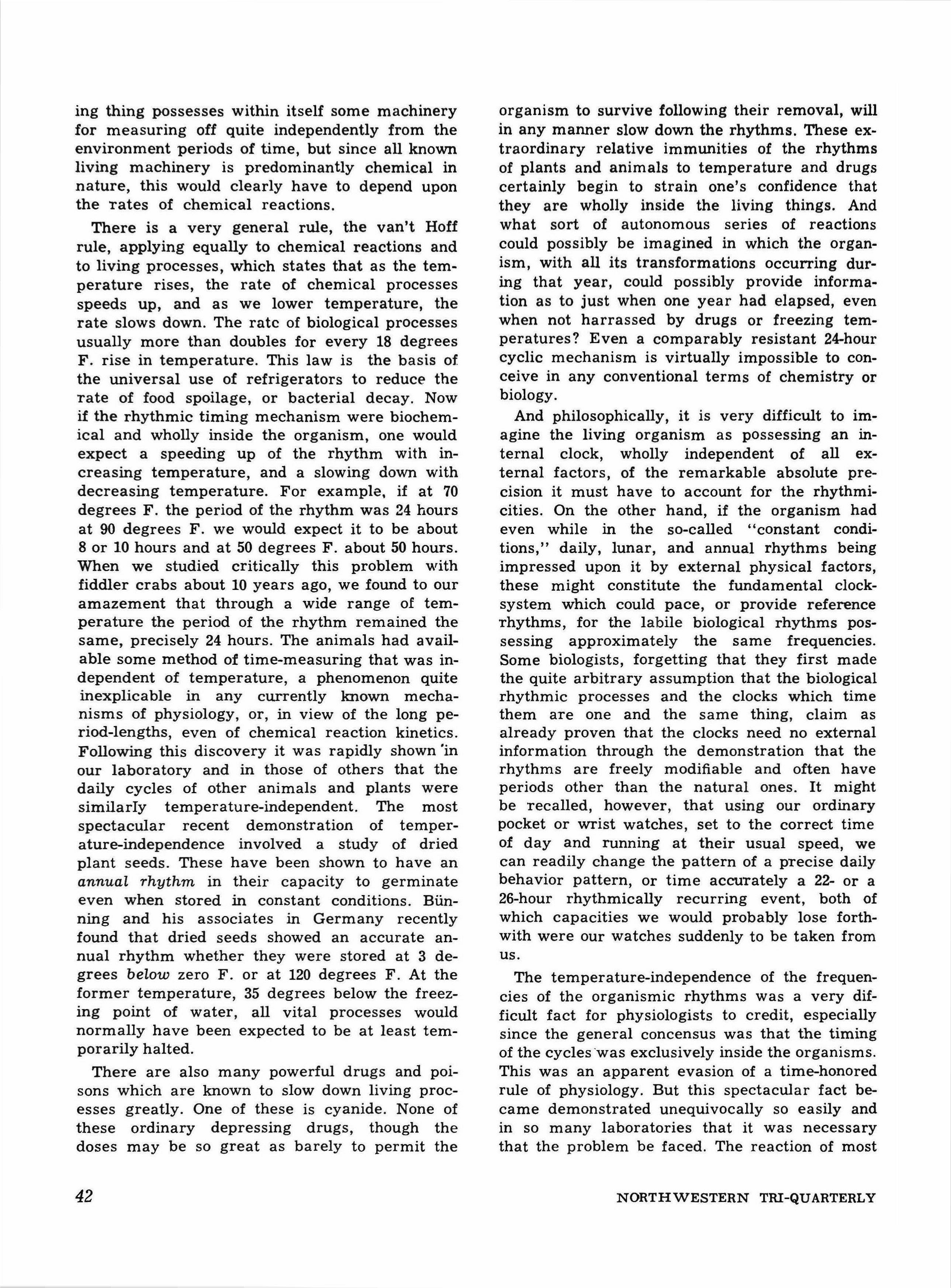
ing thing possesses within itself some machinery for measuring off quite independently from the environment periods of time, but since all known living machinery is predominantly chemical in nature, this would clearly have to depend upon the rates of chemical reactions.
There is a very general rule, the van't Hoff rule, applying equally to chemical reactions and to living processes, which states that as the temperature rises, the rate of chemical processes speeds up, and as we lower temperature, the rate slows down. The rate of biological processes usually more than doubles for every 18 degrees F. rise in temperature. This law is the basis of the universal use of refrigerators to reduce the rate of food spoilage, or bacterial decay. Now if the rhythmic timing mechanism were biochemical and wholly inside the organism, one would expect a speeding up of the rhythm with increasing temperature, and a slowing down with decreasing temperature. For example. if at 70 degrees F. the period of the rhythm was 24 hours at 90 degrees F. we would expect it to be about 8 or 10 hours and at 50 degrees F. about 50 hours. When we studied critically this problem with fiddler crabs about 10 years ago, we found to our amazement that through a wide range of temperature the period of the rhythm remained the same, precisely 24 hours. The animals had available some method of time-measuring that was independent of temperature, a phenomenon quite inexplicable in any currently known mechanisms of physiology, or, in view of the long period-lengths, even of chemical reaction kinetics. Following this discovery it was rapidly shown 'in our laboratory and in those of others that the daily cycles of other animals and plants were similarly temperature-independent. The most spectacular recent demonstration of temperature-independence involved a study of dried plant seeds. These have been shown to have an annual rhythm in their capacity to germinate even when stored in constant conditions. Bunning and his associates in Germany recently found that dried seeds showed an accurate annual rhythm whether they were stored at 3 degrees below zero F. or at 120 degrees F. At the former temperature, 35 degrees below the freezing point of water, all vital processes would normally have been expected to be at least temporarily halted.
There are also many powerful drugs and poisons which are known to slow down living processes greatly. One of these is cyanide. None of these ordinary depressing drugs, though the doses may be so great as barely to permit the
organism to survive following their removal, will in any manner slow down the rhythms. These extraordinary relative immunities of the rhythms of plants and animals to temperature and drugs certainly begin to strain one's confidence that they are wholly inside the living things. And what sort of autonomous series of reactions could possibly be imagined in which the organism, with all its transformations occurring during that year, could possibly provide information as to just when one year had elapsed, even when not harrassed by drugs or freezing temperatures? Even a comparably resistant 24-hour cyclic mechanism is virtually impossible to conceive in any conventional terms of chemistry or biology.
And philosophically, it is very difficult to imagine the living organism as possessing an internal clock, wholly independent of all external factors, of the remarkable absolute precision it must have to account for the rhythmicities. On the other hand, if the organism had even while in the so-called "constant conditions," daily, lunar, and annual rhythms being impressed upon it by external physical factors, these might constitute the fundamental clocksystem which could pace, or provide reference rhythms, for the labile biological rhythms possessing approximately the same frequencies. Some biologists, forgetting that they first made the quite arbitrary assumption that the biological rhythmic processes and the clocks which time them are one and the same thing, claim as already proven that the clocks need no external information through the demonstration that the rhythms are freely modifiable and often have periods other than the natural ones. It might be recalled, however, that using our ordinary pocket or wrist watches, set to the correct time of day and running at their usual speed, we can readily change the pattern of a precise daily behavior pattern, or time accurately a 22- or a 26-hour rhythmically recurring event, both of which capacities we would probably lose forthwith were our watches suddenly to be taken from us.
The temperature-independence of the frequencies of the organismic rhythms was a very difficult fact for physiologists to credit, especially since the general concensus was that the timing of the cycles 'was exclusively inside the organisms. This was an apparent evasion of a time-honored rule of physiology. But this spectacular fact became demonstrated unequivocally so easily and in so many laboratories that it was necessary that the problem be faced. The reaction of most
42
NORTHWESTERN TRI-QUARTERLY
investigators was to begin to postulate various kinds of hypothetical mechanisms by which organisms might have internal clocks that would perhaps do this. A few such speculations have been advanced in the literature of the past two years.
In our laboratory, where the complete temperature-independence was first demonstrated and its implications stressed, our reaction was different from that of the others. It seemed to us that the phenomenon was so extraordinary that perhaps still another of the sacred tenets of physiology was invalid. This other one was the fundamental premise of the experimental physiologist that when he keeps his organisms in constant illumination, temperature, humidity, and all other factors he has conceded to infLuence them, the organism is truly in constant conditions. So time-revered was this view that even to question it seemed a sacrilege. And we knew when we did it, that the opposition of tradition would be tremendous to overcome.
In a sense the view that we took was simply a more sophisticated one of the type taken by the numerous skeptics of a decade or more ago, when told of the persistence of rhythms in constant conditions. They doubted that the investigator had really controlled all daily fluctuating factors as well as he thought he had.
An experiment we performed with oysters had raised similar doubts in our minds, too. The U. S. Fish and Wildlife Service had shipped us a batch of healthy oysters they had collected in New Haven Harbor. Since the tides are, you recall, of lunar-day frequency, we studied in the oysters the time o�lunar-day of maximum opening of their shells for feeding in pans of sea-water in a photographic darkroom in Evanston. For about the first two weeks they opened their shells most at the time of high tide in New Haven Harbor; then they appeared to forget their home tidal times and for the next two fortnights they opened their shells almost at the times of lunar zenith and nadir in Evanston, a 3-hour time change. These new times were the times of maximum gravitational attraction by the moon as it produces the well-known lunar tides of our atmosphere.
In order to examine further the question as to whether the external factors were actually controlled, we sought a biological process which was common to every living thing. For this we selected metabolism. Metabolism underlies all animal and plant activities and thus we were no longer limited to the study of special forms. The rate of metabolism could be measured by the
Fall, 1958
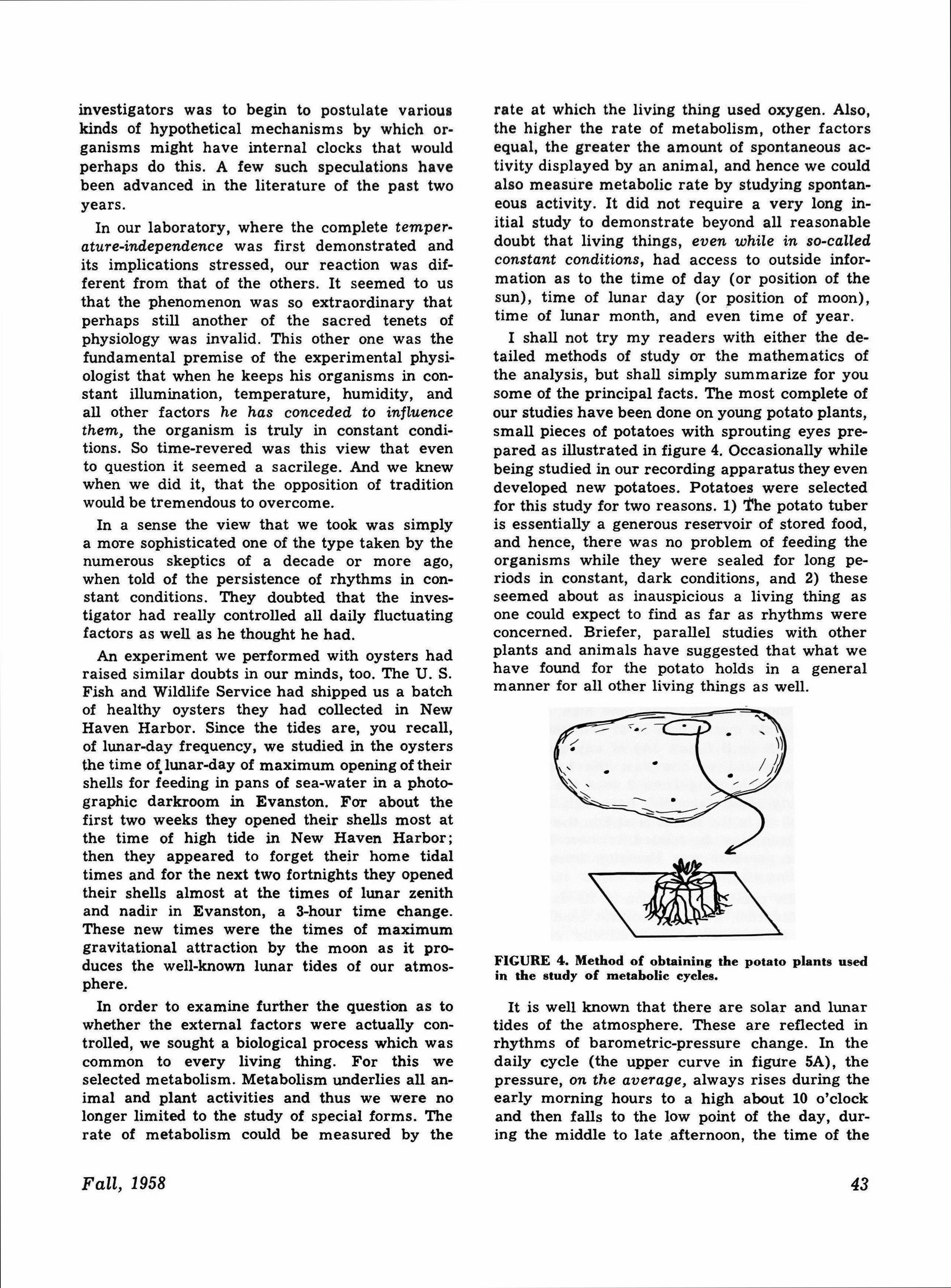
rate at which the living thing used oxygen. Also, the higher the rate of metabolism, other factors equal, the greater the amount of spontaneous activity displayed by an animal, and hence we could also measure metabolic rate by studying spontaneous activity. It did not require a very long initial study to demonstrate beyond all reasonable doubt that living things, even while in so-called constant conditions, had access to outside information as to the time of day (or position of the sun), time of lunar day (or position of moon), time of lunar month, and even time of year.
I shall not try my readers with either the detailed methods of study or the mathematics of the analysis, but shall simply summarize for you some of the principal facts. The most complete of our studies have been done on young potato plants, small pieces of potatoes with sprouting eyes prepared as illustrated in figure 4. Occasionally while being studied in our recording apparatus they even developed new potatoes. Potatoes were selected for this study for two reasons. 1) 'the potato tuber is essentially a generous reservoir of stored food, and hence, there was no problem of feeding the organisms while they were sealed for long periods in constant, dark conditions, and 2) these seemed about as inauspicious a living thing as one could expect to find as far as rhythms were concerned. Briefer, parallel studies with other plants and animals have suggested that what we have found for the potato holds in a general manner for all other living things as well.
\�
4. Method of obtaining the potato plants used in the study of metabolic cycles.
It is well known that there are solar and lunar tides of the atmosphere. These are reflected in rhythms of barometric-pressure change. In the daily cycle (the upper curve in figure SA), the pressure, on the average, always rises during the early morning hours to a high about 10 o'clock and then falls to the low point of the day, during the middle to late afternoon, the time of the
FIGURE
43
FIGURE SA. The general form of the daily barometric pressure cycle durmg a summer month (upper curve). The mean daily cycle of potato 02·consumption (lower curve).
FIGURE SR. A comparison of the day to day changes in metabolism of both potatoell and lIalamanders with the concurrent barometric pressure changes.
low point depending on the time of year. This is a precise average 24-hour rhythm. The potato has similarly a precise average 24-hour cycle of metabolism (the solid line of the lower curves in figure 5A) with a minimum rate at midnight and a maximum rate at 6 in the afternoon. This average daily cycle can be shown to include the average of two kinds of daily oscillations: the dashed-AA'A"- and the dotted -BB'B"- ones in figure 5A. Both the barometric pressure cycles and the potato cycles exhibit irregularities from day to day. The barometric pressure cycles are distorted by large changes due to still unknown forces, which are associated with weather changes. The important fact for us here is that the potato is informed of how fast the pressure is rising in the morning and falling in the afternoon. This we know first because how high, or how low, the potato metabolism is at 6 in the morning (points A or B figure 5A) of any given day is simply related to how fast the barometric pressure was changing from 2 to 6 the preceding morning. And, secondly, how high the rate of metabolism in the potato is at 6 in the evening of any given day is related to how fast the barometric pressure was changing from 2 to 6 the preceding afternoon.
Hence the potato in the form of its daily metabolic fluctuation, even in constant conditions of pressure, through being hermetically sealed in rigid containers, is in effect informing us through indicating in its metabolic changes what the weather distortions were in the regular pressure cycle of yesterday. And whatever the means by which this information reaches the potato, the same information is providing the potato, figuratively speaking, with information as to what the weather-associated, barometric pressure will be the day after tomorrow, by the height of the afternoon peak of metabolic rate. This is tending to trace out the form of the barometric pres-
sure changes but doing so two days in advance. This is illustrated by the month-long study of potatoes and salamanders shown in figure 5B. Notice how both kinds of living things generally vary inversely with the barometric pressure change (bottom curve), but both tend to anticipate the pressure changes by an average of two days. In fact, every living thing studied in our laboratory during the past 3 years,-from carrots to sea-weed, and from crabs and oysters to rats,-has shown this capacity to predict very safely beyond chance the barometric pressure changes usually two days in advance. It is interesting to contemplate the problem of a meteorologist sealed, incommunicado, for weeks or months in constant conditions, and asked to give 2-day weather predictions-or for that matter even to tell you the weather today.
The potatoes also indicate to us that they are, while sealed in constant conditions, obtaining information about another well-known environmental daily rhythm, namely that of high-energy background radiation. This is so penetrating that it pervades all ordinary buildings and containers. This radiation is highest about 6 in the morning
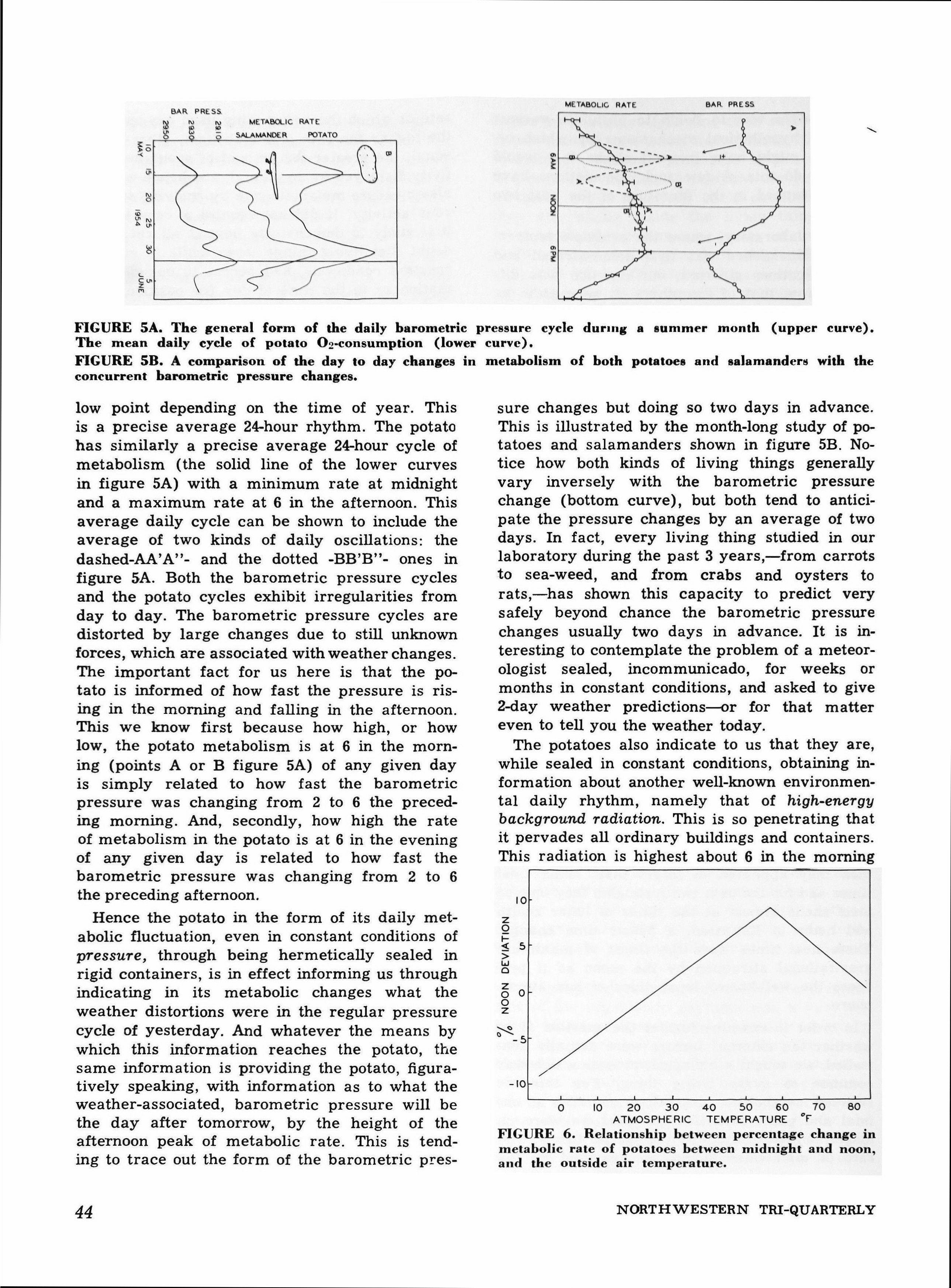
FIGURE 6. Relationship between percentage change in metabolic rate of potatoes between midnight and noon, and the outside air temperature.
BAR. PRESS. �. e � METABOLIC RATE SALAMANDER POTATO METABOLIC RATE BAR. PRESS,
44
10 z o � « 5 s w a z o 0 o z � o -5 -10 o 10 20 30 40 SO 60 70 80 ATMOSPHERK TEMPERATURE
or
NORTHWESTERN TRI-QUARTERLY
and lowest between noon and 6 p.m. The daily range, or cycle amplitude, in the radiation, thoulh averaging about 2%, varies greatly and unpredictably from day to day. The potato cycles also show variable total range, or amplitudes, from day to day. But, the amplitude of the potato cycles on a given day is very clearly related to the amplitude of the background radiation cycle the day before. The greater the fluctuation in radiation yesterday, the greater the fluctuation in metabolism today.
The potato sealed in constant conditions also obtains information as to the outdoor air temperature. As clearly seen in figure 6, the higher the outdoor temperature up to about 57° F., the higher the amplitude of the daily metabolic fluctuations. This relationship is reversed for higher temperatures. As everyone knows, there are clear daily and annual rhythms in air temperature.
The potato in constant conditions also exhibited a lunar monthly rhythm of metabolism during a full-year period of study. As seen in figure 7A the rate was lowest at the time of new moon and highest at the time of third quarter. The rate of metabolism was 20% higher at 3rd quarter than at new moon. There was also a monthly cycle in the form of the daily cycles. As seen by the dotted curve in figure 7B, the daily cycles were depressed during the morning hours, at the time of new moon, and as shown by the solid .line, quite symmetrical and high, with a maximum at noon, at the time of the third quarter. The sun is, obviously, always at its highest point in the sky at noon. The time of day the moon is highest depends on the time of month. Over full moon, it is midnight; over new moon it is noon. These changes in the form of the daily cycles through the month seem logical if we think of the sun and moon having qualitatively the same effect on metabolism, the maximum accelerating action of each on metabolism occurring about 6 hours later than the time it reaches its zenith in the sky.
An annual cycle in the form of the daily cycles was also found to exist in constant conditions. The average monthly values for two years of study are shown in figure 8A. The cycles were lowest in amplitude in January and February, and highest in September, October, and November during both years. There was also an annual cycle in general metabolic rate in the constant conditions (figure 8B). The highest rate occurred in May, and was about twice that seen in the lowest month, October.

DAYS OF. MONTH
FIGURE 7A. The variation in average metabolic rate in the potato with time of the lunar month.
FIGURE 7B. The change in form of the average daily metabolic fluctuation with day of month.
Collectively these facts provide incontrovertible evidence that even when we have thought we have excluded all forces influencing the living things, there is, nonetheless, cyclic information, unquestionably with all the natural periodicities of the atmosphere imbedded in it, still impressing itself upon the organism. Living things might conceivably possess inherited, regular rhythms, but it is quite inconceivable that they are born with an inherited plan of all the erratic temperature, barometric pressure, and background-radiation fluctuations which are to occur during their lifetime. So far we don't know what the. specific nature of the factor or factors may be which are directly effective on the living organism. This is one of the most important and exciting problems before us in our continuing research.
But to suggest further that the forces involved in our problem may be in part determined by other forces arriving on our earth even from outside of our own solar system, we have ob-
A 10 w !< 9 a: o ::::; o ID ;!:, W 8 ::;
:c=J
o ::::; o rn � w ::; Z ::> wC/) � I- M IZ 1-0_ 3� N
6AM NOON 6 PM
Fall, 1958
45
FIGURE 3A (left). The relationship between the percentage change in metabolism of potatoes between midnight and noon and the time of year. FIGURE 38 (right). The variation in average metabolic rate with time of year.
METABOLISM 0>
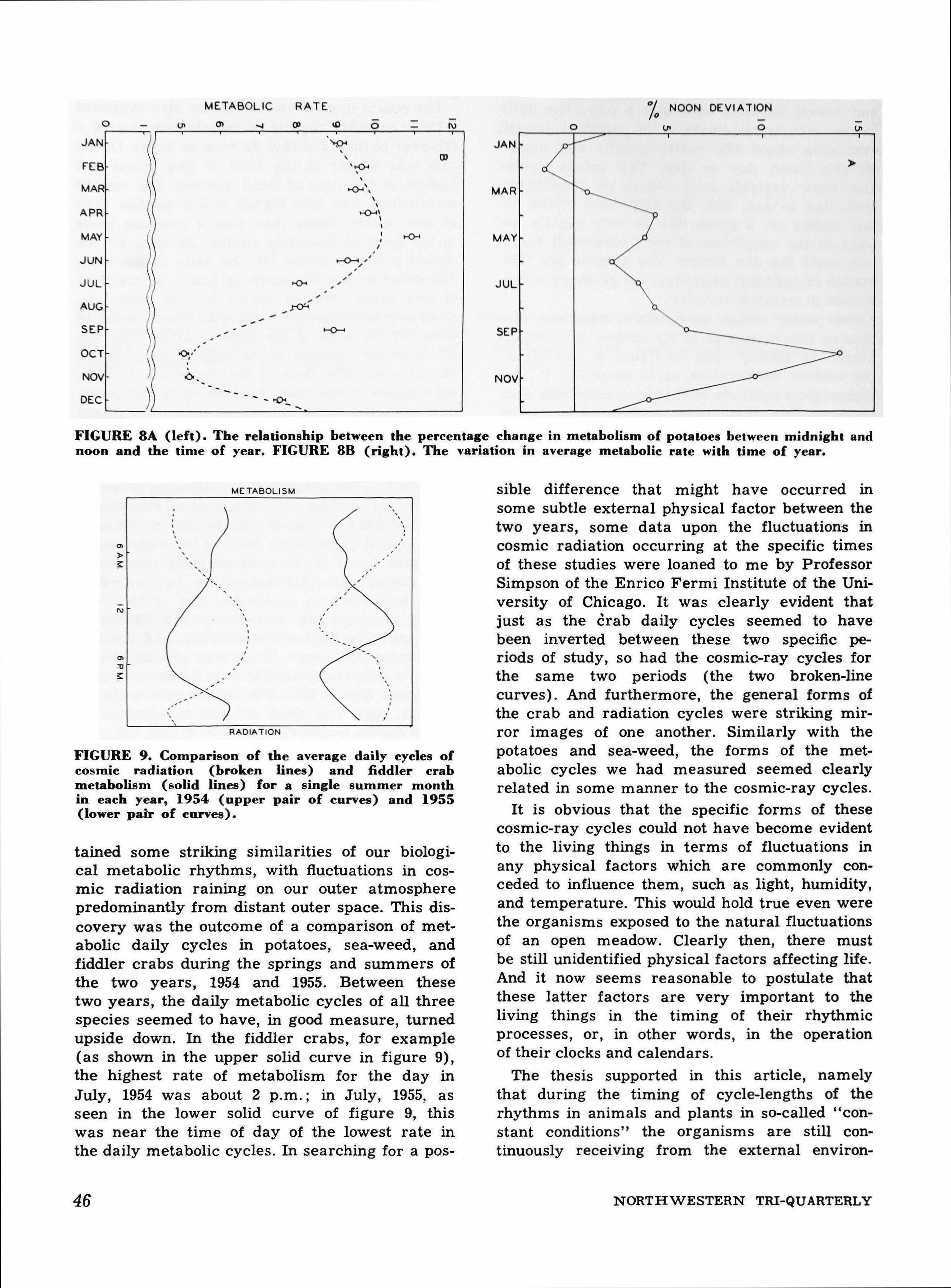
RADIATION
FIGURE 9. Comparison of the average daily cycles of cosmic radiation (broken lines) and fiddler crab metabolism (solid lines) for a single summer month in each year, 1954 (upper pair of curves) and 1955 (lower pair of curves).
tained some striking similarities of our biological metabolic rhythms, with fluctuations in cosmic radiation raining on our outer atmosphere predominantly from distant outer space. This discovery was the outcome of a comparison of metabolic daily cycles in potatoes, sea-weed, and fiddler crabs during the springs and summers of the two years, 1954 and 1955. Between these two years, the daily metabolic cycles of all three species seemed to have, in good measure, turned upside down. In the fiddler crabs, for example (as shown in the upper solid curve in figure 9), the highest rate of metabolism for the day in July, 1954 was about 2 p.m.; in July, 1955, as seen in the lower solid curve of figure 9, this was near the time of day of the lowest rate in the daily metabolic cycles. In searching for a pos-
sible difference that might have occurred in some subtle external physical factor between the two years, some data upon the fluctuations in cosmic radiation occurring at the specific times of these studies were loaned to me by Professor Simpson of the Enrico Fermi Institute of the University of Chicago. It was clearly evident that just as the crab daily cycles seemed to have been inverted between these two specific periods of study, so had the cosmic-ray cycles for the same two periods (the two broken-line curves). And furthermore, the general forms of the crab and radiation cycles were striking mirror images of one another. Similarly with the potatoes and sea-weed, the forms of the metabolic cycles we had measured seemed clearly related in some manner to the cosmic-ray cycles.
It is obvious that the specific forms of these cosmic-ray cycles could not have become evident to the living things in terms of fluctuations in any physical factors which are commonly conceded to influence them, such as light, humidity, and temperature. This would hold true even were the organisms exposed to the natural fluctuations of an open meadow. Clearly then, there must be still unidentified physical factors affecting life. And it now seems reasonable to postulate that these latter factors are very important to the living things in the timing of their rhythmic processes, or, in other words, in the operation of their clocks and calendars.
The thesis supported in this article, namely that during the timing of cycle-lengths of the rhythms in animals and plants in so-called "constant conditions" the organisms are still continuously receiving from the external environ-
METABOLIC RATE. % NOON DEVIATION
(J> 0> -.j 0> <0 0 N0; (J> 0 JAN » JAN (Jl FEB '0;0< >MAR >-0-<\ MAR \ APR ..0-<' \ MAY : ..0-< MAY I JUN �/� JUL ..0< JUL AUG � SEP >-0--< SEP OCT
NOV
NOV DEC
- >0<_
0
00:,'
) 6.
)) -
;>-
N 0> -, :u �
1=
46
NORTHWESTERN TRI-QUARTERLY
ment information about the natural geophysical cycles, removes some of the romantic glamour inherent in the alternative view, that all living things must possess within them uncannily accurate clocks capable of measuring, independently, periods ranging in length from the day to the year. On the other hand, its implications are tremendous with respect to the potentialities involved through the demonstration that living things are sensitively responding to additional kinds of stimuli at energy levels so low that we have hitherto considered the living organism completely oblivious of them. These latter po-
tentialities may soon 100m importantly in many areas of biology and medicine, especially in such problems as animal navigation and behavior.
The demonstration that the physical environment of living things is organized temporalLy in terms of still unknown subtle and highly pervasive forces which the living organisms can resolve encourages one to speculate that there may be some comparable subtle and pervasive spatial organization of the environment which is contributing at least in a small way towards accounting for geographical distributions or periodic migrations of organisms.
It is the intention of the editors to reserve a space in subsequent issues of the TRI-QUARTERLY for letters from subscribers. You are invited to comment on the magazine and on individual contributions published in it. Please sign your own name. Letters received will be regarded as containing your consent to publish unless otherwise stated.
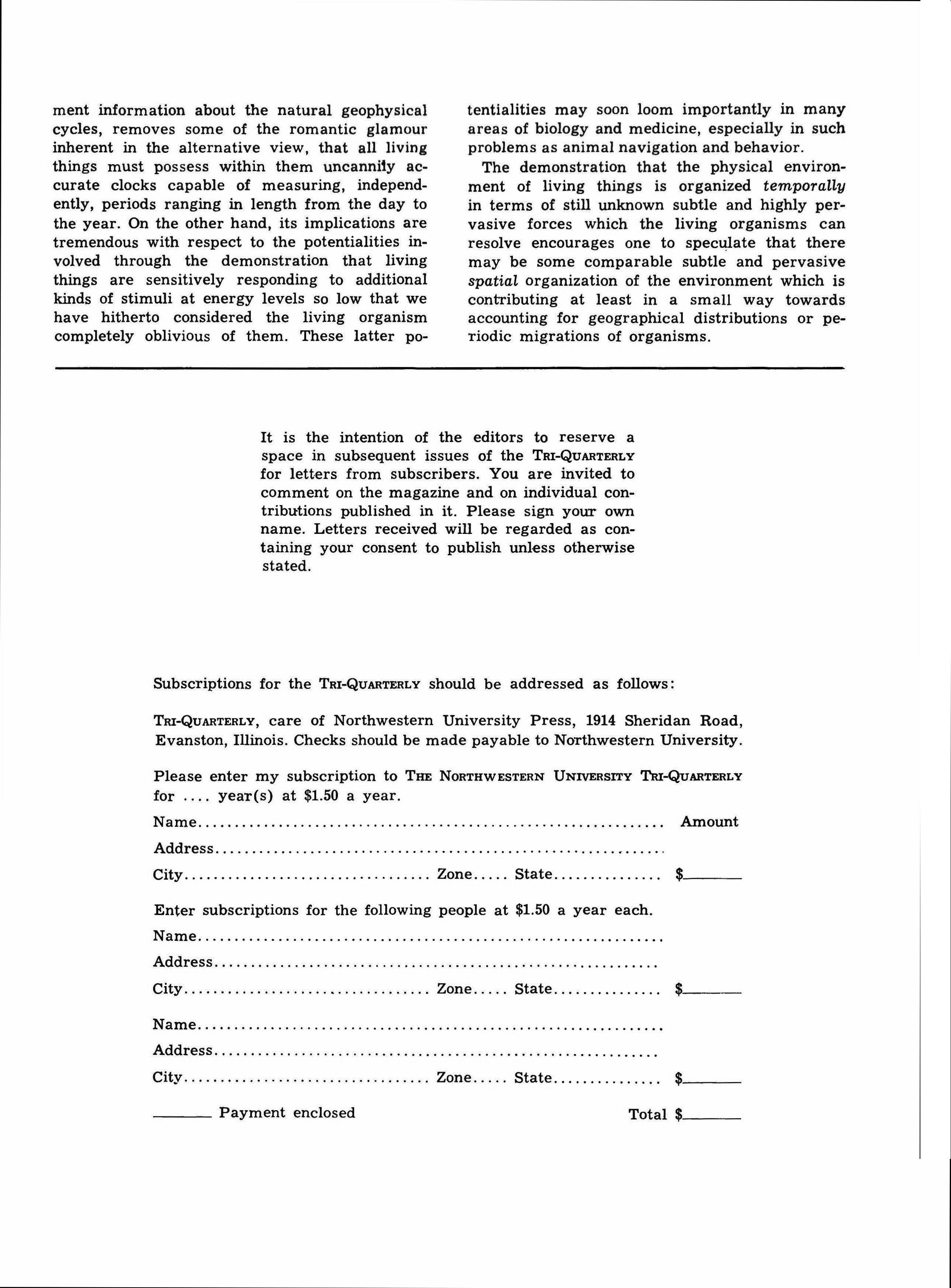
Subscriptions for the TRI-QUARTERLY should be addressed as follows: TRI-QUARTERLY, care of Northwestern University Press, 1914 Sheridan Road, Evanston, Illinois. Checks should be made payable to Northwestern University.
Please enter my subscription to THE NORTHWESTERN UNIVERSITY TRI-QuARTERLY for year(s) at $1.50 a year. Name.
Enter subscriptions for the following people at $1.50 a year each.
Amount Address City Zone State $, Total $,
Name Address City Zone State............... $ Name Address City Zone..... State............... $ Payment enclosed

















































